Nov 15, 2018 | Focolare Worldwide
According to the latest estimates more than 440 thousand, of the more than 2 million and 300 thousand people, who fled Venezuela from 2014 until now, have crossed the Peru border. They arrive after a very exhausting journey, uncertain about their future and surrounded by many dangers, including the recent need to cross a river by boat. “If the water is too high, and they can’t manage it, they’re loaded onto the shoulders of a man who naturally wants to be paid.” Once again Silvano from the focolare community in Lima writes: “Right from the start of this forced exodus “we have been accompanying an ever increasing number of people. Up until now, there are sixty whom we follow closely, not only spiritually, but also professionally and on a purely human level.” The situation is extremely difficult for those who arrive: “They only have the clothes on their backs. They’re cold because spring has begun and the temperatures are falling. We see the emotion in their eyes when they see the clothing that has been collected for them through a communion of goods.” The Focolare has two welcome centers in Lima, along with the Centro Fiore at Magdalena del Mar in the province of the capital. “Three family units are being hosted here, including the family of Ofelia who many Venezuelans in Peru call “the mother.” In the first quarter of this year,” Silvan recounts, “we came into contact with a psychologist, Irene, who has already been here a few months. She was invited to our operating centre, which is the focolare house, along with her parents and a few friends. She got to know the spirit behind the Focolare and, aware of the needs of her many fellow-countrymen, offered her services as a professional psychologist. A small project was immediately begun in response to the Gospel promise: “Give, and it will be given to you.” After a workshop on the topic of feelings, which was given by Irene at the end of July and a second one a few weeks later, we opened a consultancy service at Centro Fiore of Magdalena del Mar. “The “Project of Emotional Growth for Vulnerable Populations” was begun, to respond to the massive migratory situation that we are facing. In the presentation of the project, which is geared towards the most fragile members of the group such as women, children, youth and elderly, it is written that ‘providing tools for facing the situation and integrating’ into the Peruvian community is imperative. Therefore, this Project enters into the objectives of the Focolare, to “collaborate in the building of a more united world under the guidance of Jesus’ prayer to the Father that all may be one (Jn17:21), respecting and appreciating diversity, using dialogue as the method, and the constant effort of building bridges and relationships of fraternity among individuals, peoples and cultural groups.” The most common cases that have already been treated include anxiety and depression over the precarious situations, the constant concern for survival, mistreatment and developmental problems. The project provides support, information, education, and training courses, workshops on feelings and emotions, self-esteem, love of others and of oneself.” Several of the people have found employment, others are still searching, and others are planning to return to their own or to another country. “Up until now 35 sessions of psychological care have been recorded. This service continues to be offered for free to Venezuelan immigrants.”
Nov 14, 2018 | Non categorizzato
Replay streaming: http://collegamentoch.focolare.org/
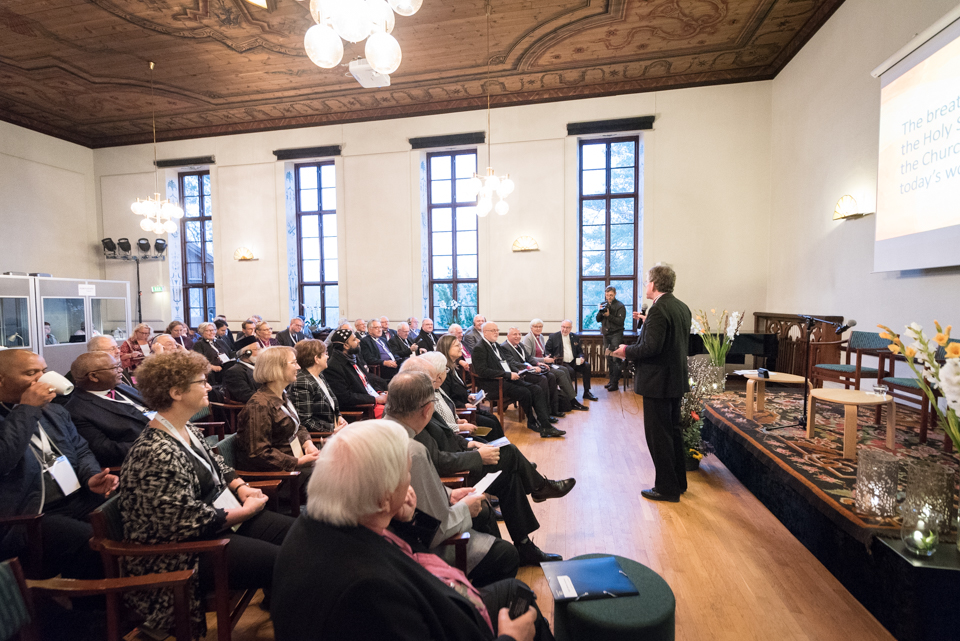
Nov 14, 2018 | Focolare Worldwide
 How does the Holy Spirit work in today’s Church? Does it still make sense to talk about an ecumenical journey at a time marked by fragmentation, complexity, scandals and humanitarian challenges even for Christians? Two years after the Lund event, that gave a new impetus to the ecumenical dialogue, 40 Bishops of various Churches, from 18 different countries, met in Sigtuna, Sweden. This conference, promoted by the Focolare Movement, was held from 6 to 9 November and its theme was “The Breath of the Spirit, the Church in today’s world”. Maria Voce, president of the Focolare Movement, Jesús Morán co-president and representatives of the Focolare Community in Sweden also attended this conference. Maria Voce spoke about “The Breath of the Spirit, soul of the Church, in the experience and thought of Chiara Lubich”, while Jesús Morán presented present-day challenges from the perspective of the spirituality of unity. This conference, which has come to its 37th edition, owes its origin to an experience of synodality and communion, which John Paul II had proposed to Klaus Hemmerle, Bishop of Aachen.
How does the Holy Spirit work in today’s Church? Does it still make sense to talk about an ecumenical journey at a time marked by fragmentation, complexity, scandals and humanitarian challenges even for Christians? Two years after the Lund event, that gave a new impetus to the ecumenical dialogue, 40 Bishops of various Churches, from 18 different countries, met in Sigtuna, Sweden. This conference, promoted by the Focolare Movement, was held from 6 to 9 November and its theme was “The Breath of the Spirit, the Church in today’s world”. Maria Voce, president of the Focolare Movement, Jesús Morán co-president and representatives of the Focolare Community in Sweden also attended this conference. Maria Voce spoke about “The Breath of the Spirit, soul of the Church, in the experience and thought of Chiara Lubich”, while Jesús Morán presented present-day challenges from the perspective of the spirituality of unity. This conference, which has come to its 37th edition, owes its origin to an experience of synodality and communion, which John Paul II had proposed to Klaus Hemmerle, Bishop of Aachen. 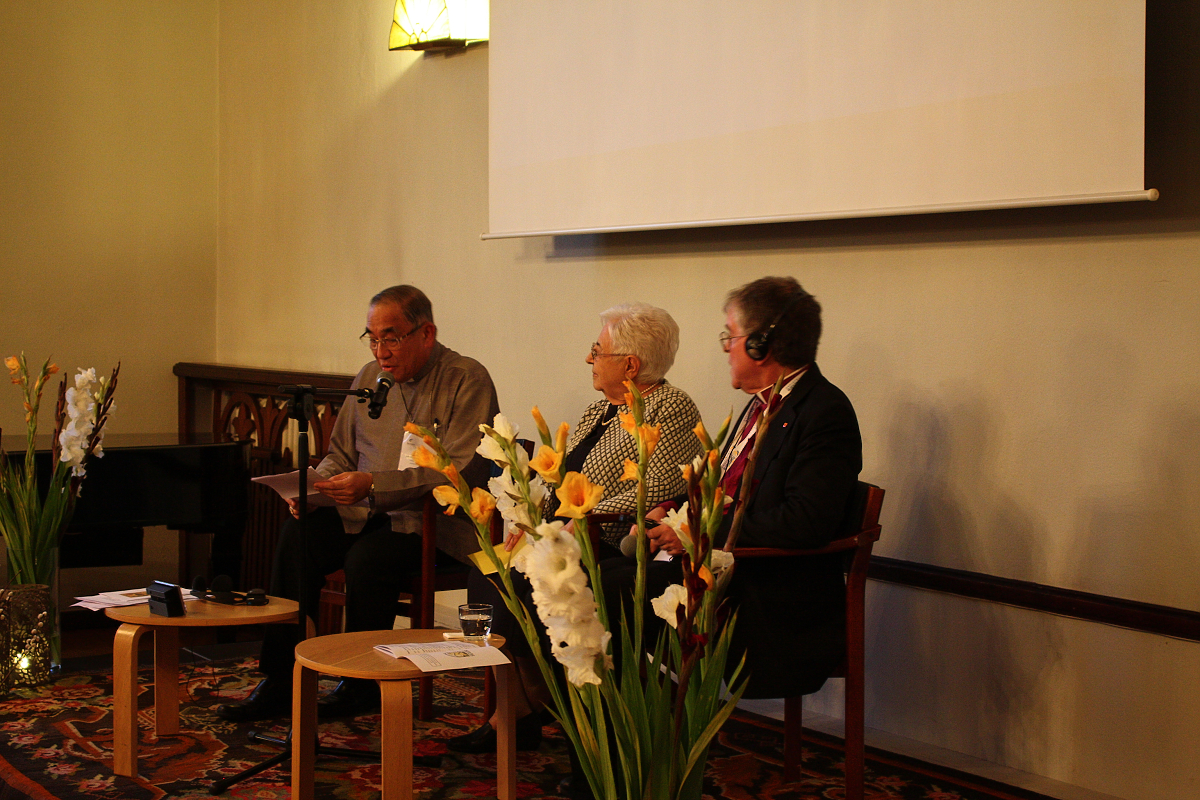 “In addition to our different recounts, we wanted to give ample space to dialogue and sharing about the ecumenical challenges we live in our countries and continents”, said Cardinal Francis Kriengsak Kovithavanij, Archbishop of Bangkok and moderator of the conference. Mons. Brendan Leahy, the Catholic Bishop of the diocese of Limerick, Ireland dealt with the important theme of reconciliation. While speaking about the power of forgiveness in the context of the scandals that hit the Irish Church, he said: “The Spirit urges us not to be robbed of hope (see Rom 8). Discouragement is a great temptations, but the Spirit keeps our hope alive and helps us restart to live a new committment in the Christian adventure of unity and reconciliation”. The Anglican Bishop Trevor Williams, an Irish man, spoke about his experience as a pastor. For several years he has been having under his care the ecumenical community of Corrymeela, in Northern Ireland, who has contributed much towards the path of reconciliation between the different factions in conflict. “Reconciliation is not an option; it is a necessity if we want peace to last. We live in a world of “they” and “we”. But in truth there is only “we”. Revealing this truth is work of reconciliation, work of the Holy Spirit”.
“In addition to our different recounts, we wanted to give ample space to dialogue and sharing about the ecumenical challenges we live in our countries and continents”, said Cardinal Francis Kriengsak Kovithavanij, Archbishop of Bangkok and moderator of the conference. Mons. Brendan Leahy, the Catholic Bishop of the diocese of Limerick, Ireland dealt with the important theme of reconciliation. While speaking about the power of forgiveness in the context of the scandals that hit the Irish Church, he said: “The Spirit urges us not to be robbed of hope (see Rom 8). Discouragement is a great temptations, but the Spirit keeps our hope alive and helps us restart to live a new committment in the Christian adventure of unity and reconciliation”. The Anglican Bishop Trevor Williams, an Irish man, spoke about his experience as a pastor. For several years he has been having under his care the ecumenical community of Corrymeela, in Northern Ireland, who has contributed much towards the path of reconciliation between the different factions in conflict. “Reconciliation is not an option; it is a necessity if we want peace to last. We live in a world of “they” and “we”. But in truth there is only “we”. Revealing this truth is work of reconciliation, work of the Holy Spirit”.  The German Evangelical-Lutheran pastor Jens-Martin Kruse shared his pastoral experience in Rome, an ecumenical laboratory that functions also thanks to Pope Francis. The Archbishop Antje Jackelén, Primate of the Church of Sweden, Cardinal Anders Arborelius, the Catholic Bishop of Stockholm, and Bishop Munib Younan, former president of the Lutheran World Federation, who presided over the historical ecumenical liturgy in Lund together with Pope Francis in 2016, spoke about the journey of common reflection that continues after the 500 years commemoration of the Reformation. “I assure you the Holy Spirit guided us and continues to guide us towards an ecumenical springtime. It is up to us now to reap the fruits of unity. Today we say: let us journey together as living witnesses in our fragmented world so that the world will believe.” One of the highlights of this conference was the ecumenical prayer in the ancient Church of Sigtuna and the signing of the “Pact of Unity”. With the signing of this Pact, the Bishops committed themselves to journey along the path of effective and affective communion, “to love the Church of the other as one’s own”. This commitment was sealed with one’s own signature and a fraternal embrace. Stefania Tanesini
The German Evangelical-Lutheran pastor Jens-Martin Kruse shared his pastoral experience in Rome, an ecumenical laboratory that functions also thanks to Pope Francis. The Archbishop Antje Jackelén, Primate of the Church of Sweden, Cardinal Anders Arborelius, the Catholic Bishop of Stockholm, and Bishop Munib Younan, former president of the Lutheran World Federation, who presided over the historical ecumenical liturgy in Lund together with Pope Francis in 2016, spoke about the journey of common reflection that continues after the 500 years commemoration of the Reformation. “I assure you the Holy Spirit guided us and continues to guide us towards an ecumenical springtime. It is up to us now to reap the fruits of unity. Today we say: let us journey together as living witnesses in our fragmented world so that the world will believe.” One of the highlights of this conference was the ecumenical prayer in the ancient Church of Sigtuna and the signing of the “Pact of Unity”. With the signing of this Pact, the Bishops committed themselves to journey along the path of effective and affective communion, “to love the Church of the other as one’s own”. This commitment was sealed with one’s own signature and a fraternal embrace. Stefania Tanesini
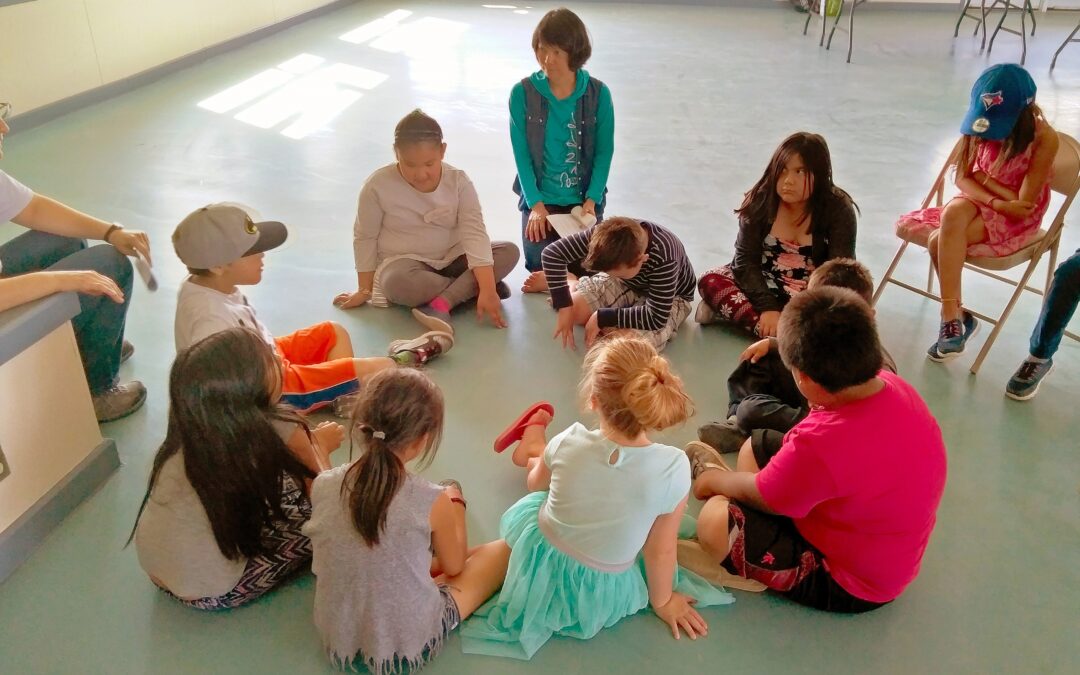
Nov 13, 2018 | Focolare Worldwide
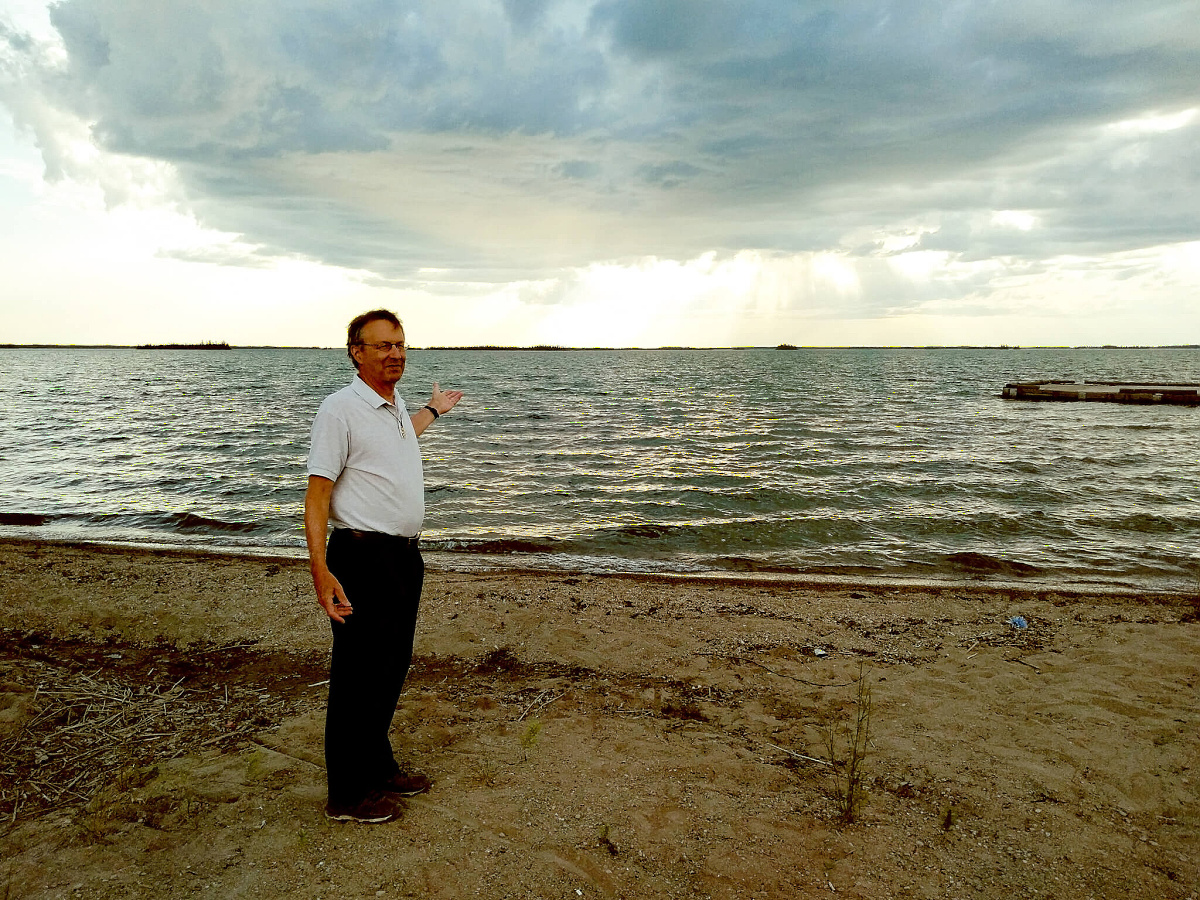 It was a lake so clear you could see the bottom and drink the water with your cupped hands from the canoe. It seemed the perfect world. Yet here and there a plastic bottle was stuck in the bank, held down by low roots. In that extraordinarily beautiful landscape, it was a punch in the eye. Alek’s story is rich with images such as this. He was among the four people who were part of a temporary Focolare at Whati, in Canada, from July 19 to August 20, 2018. “We’re talking about the Great North, almost at the Arctic Circle, a town with 800 inhabitants. It seemed even less, since the meeting of the Tlicho people (Tłı̨chǫ in their original language) had just ended, and many of the locals had left for vacation. “The Tlicho people are Native Americans (called “First Nations” in Canada), who can be found throughout North America. They are part of the Dene, an association of Native Americans in the Northwest Territories, and they live in an area called Tlicho Land, which has four towns with a total population of close to 2,000 people. Whati, which in its native language is Wha Ti, is one of these towns. It’s on beautiful Lac La Martre, which at its widest point is a good 70 km.”
It was a lake so clear you could see the bottom and drink the water with your cupped hands from the canoe. It seemed the perfect world. Yet here and there a plastic bottle was stuck in the bank, held down by low roots. In that extraordinarily beautiful landscape, it was a punch in the eye. Alek’s story is rich with images such as this. He was among the four people who were part of a temporary Focolare at Whati, in Canada, from July 19 to August 20, 2018. “We’re talking about the Great North, almost at the Arctic Circle, a town with 800 inhabitants. It seemed even less, since the meeting of the Tlicho people (Tłı̨chǫ in their original language) had just ended, and many of the locals had left for vacation. “The Tlicho people are Native Americans (called “First Nations” in Canada), who can be found throughout North America. They are part of the Dene, an association of Native Americans in the Northwest Territories, and they live in an area called Tlicho Land, which has four towns with a total population of close to 2,000 people. Whati, which in its native language is Wha Ti, is one of these towns. It’s on beautiful Lac La Martre, which at its widest point is a good 70 km.” 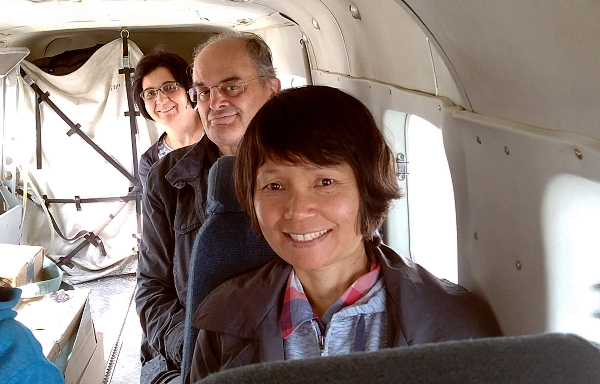 With the youth group, Alek and Fr. Alain organized the cleanup of a stretch of shoreline. “It was just a gesture,” he says, “yet afterwards we heard that one of the residents there brought this to the chief’s attention, and the cleanup has now become a regular activity throughout the year.” This too was a result of the temporary Focolare at Whati. Besides Alek (an Italian who lives in Birmingham, Alabama) and Fr. Alain (a priest from Montreal), the group was made up of Lioba from the Focolare of Vancouver and Ljubica from that of Toronto. The reason for their journey was a request from the bishop of Yellowknife, the capital of the Northwest Territories, to have a few people from the Focolare community come to the area (covering the costs) to give the residents, at least for one month of the year, the chance to come together spiritually and receive some training on Gospel living. At the same time, another group was having a similar experience at the village of Fort Resolution.
With the youth group, Alek and Fr. Alain organized the cleanup of a stretch of shoreline. “It was just a gesture,” he says, “yet afterwards we heard that one of the residents there brought this to the chief’s attention, and the cleanup has now become a regular activity throughout the year.” This too was a result of the temporary Focolare at Whati. Besides Alek (an Italian who lives in Birmingham, Alabama) and Fr. Alain (a priest from Montreal), the group was made up of Lioba from the Focolare of Vancouver and Ljubica from that of Toronto. The reason for their journey was a request from the bishop of Yellowknife, the capital of the Northwest Territories, to have a few people from the Focolare community come to the area (covering the costs) to give the residents, at least for one month of the year, the chance to come together spiritually and receive some training on Gospel living. At the same time, another group was having a similar experience at the village of Fort Resolution. 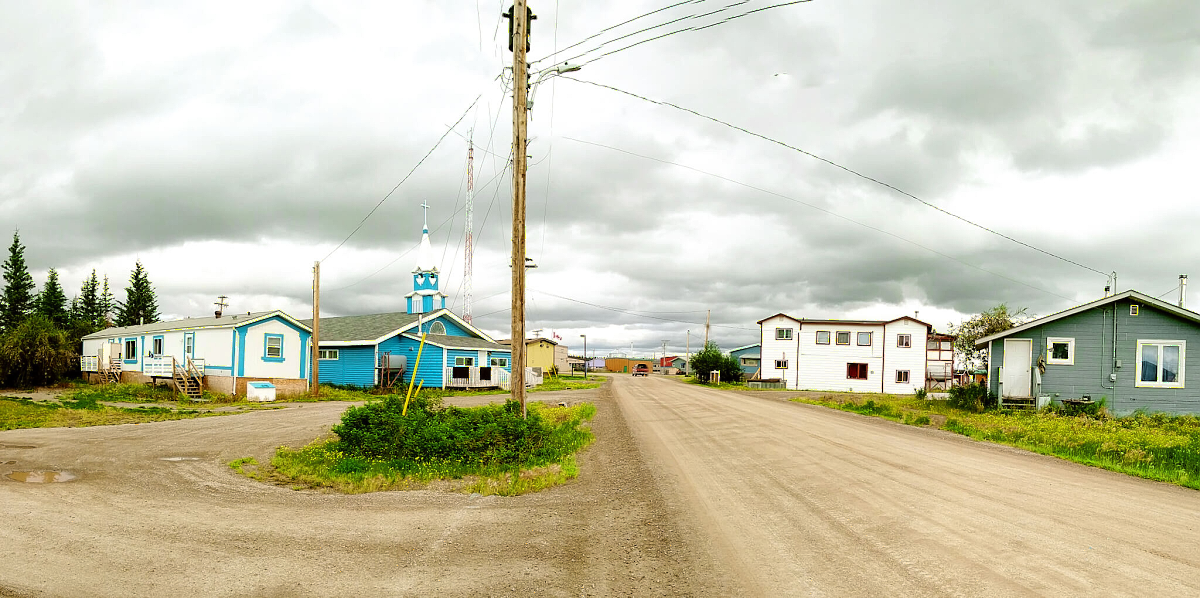 “We were at Yellowknife for a few days, having come from our cities, after trips that were pretty adventurous because of the weather. There we got the chance to know each other and receive the bishop’s blessing.” “Arriving together at Whati, we were there for a total of four weeks, to renew relationships that had begun the year before from another similar experience. We were there to get to know the local leaders and to contribute to a few projects started by the tribal leadership. The second week we organized a Bible camp for the kids, and the third week, at the request of the local leaders, we went to meet some of the elders of the village. It was moving to pray together with them. It seemed to us that there was communication that went beyond any difficulty to understand their language.”
“We were at Yellowknife for a few days, having come from our cities, after trips that were pretty adventurous because of the weather. There we got the chance to know each other and receive the bishop’s blessing.” “Arriving together at Whati, we were there for a total of four weeks, to renew relationships that had begun the year before from another similar experience. We were there to get to know the local leaders and to contribute to a few projects started by the tribal leadership. The second week we organized a Bible camp for the kids, and the third week, at the request of the local leaders, we went to meet some of the elders of the village. It was moving to pray together with them. It seemed to us that there was communication that went beyond any difficulty to understand their language.” 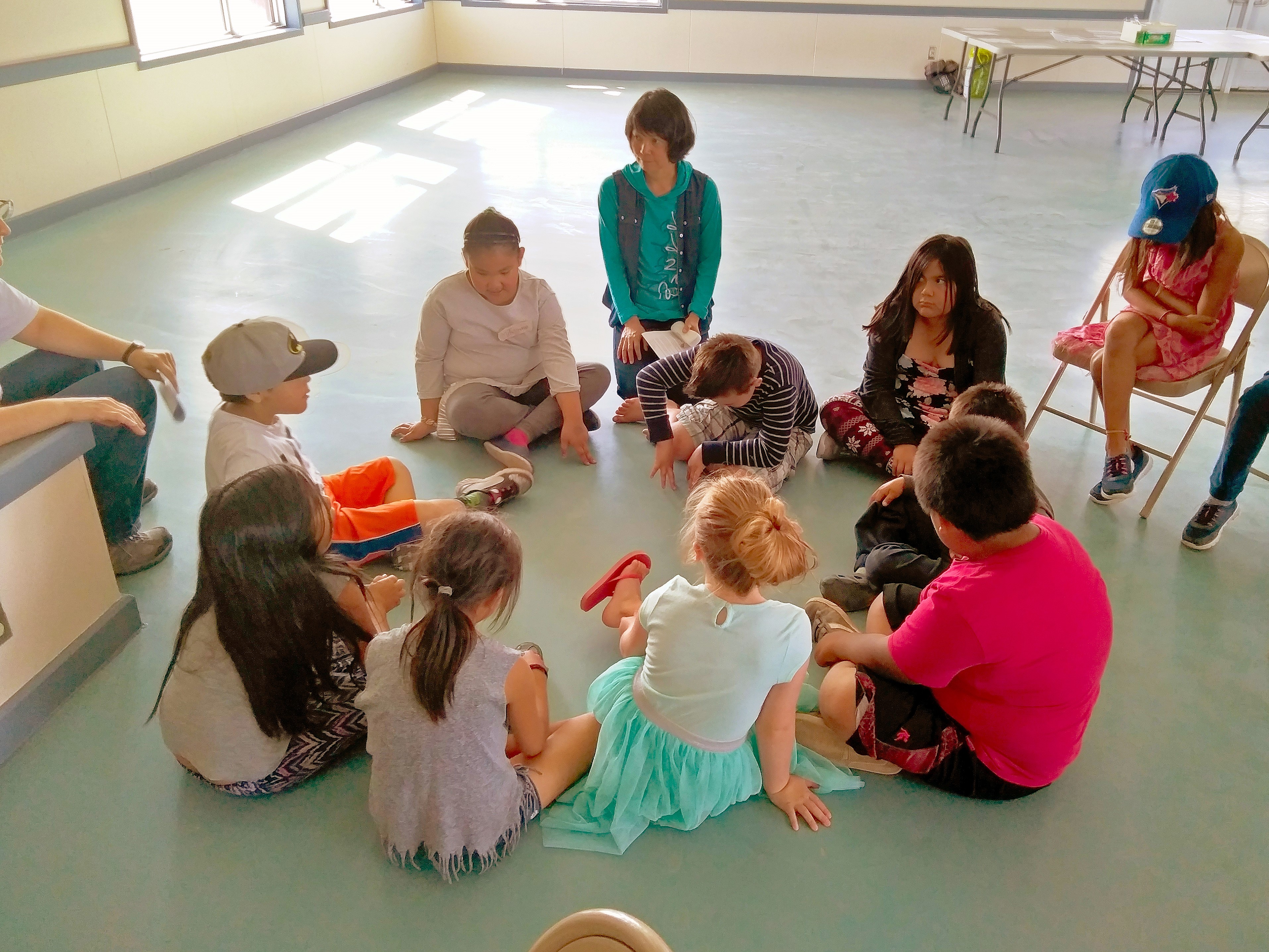 The people of that place are suffering from a difficult transition from tradition to modernity. “In the space of one generation,” Alek explains, “they found themselves entirely deprived of the roots that had been their deepest identity, perhaps for thousands of years. Those of my generation were born and lived in teepees, and speak Tlicho. Their grandchildren no longer speak the traditional language, use smartphones and are taken by consumerism and all its consequences, including alcohol and drugs. “Yet, the community is still driven by a simple, deep faith that is based on reading the Bible and the natural spirituality of its people, who are still sensitive to spiritual things. “For my part, it was a chance to meet face to face with some of these stories. With them I felt at home, perhaps as never before. I was also a way for them to be touched by God.”
The people of that place are suffering from a difficult transition from tradition to modernity. “In the space of one generation,” Alek explains, “they found themselves entirely deprived of the roots that had been their deepest identity, perhaps for thousands of years. Those of my generation were born and lived in teepees, and speak Tlicho. Their grandchildren no longer speak the traditional language, use smartphones and are taken by consumerism and all its consequences, including alcohol and drugs. “Yet, the community is still driven by a simple, deep faith that is based on reading the Bible and the natural spirituality of its people, who are still sensitive to spiritual things. “For my part, it was a chance to meet face to face with some of these stories. With them I felt at home, perhaps as never before. I was also a way for them to be touched by God.”
Nov 12, 2018 | Focolare Worldwide
With an estimated 31 victims thus far, the huge fire that developed in California has broken the record as the worst burning in the history of the Golden State. An additional 220 people are still missing. The main fire that developed north of the capital of Sacramento is still partially out of control. In this area of the Sierra Nevada there has been very severe devastation. The town of Paradise with 27 thousand inhabitants was completely swept away by the flames, with a high number of victims, at least 14. There are two other smaller fronts further south between Los Angeles County and Ventura County. In total, more than 300 thousand people have been displaced from north to the south of the State. In the most affected areas, the scene appears ghostly, with woods and villages reduced to ash heaps and a few areas completely deserted. The strong winds of up to over 110 kilometres an hour, caused a spectacular and devastating “fire tornado” that incinerated everything in its path. This is just one of the umpteenth environmental disasters that have been happening all over the world because of climate change, but also because of the lack of care for the environment.
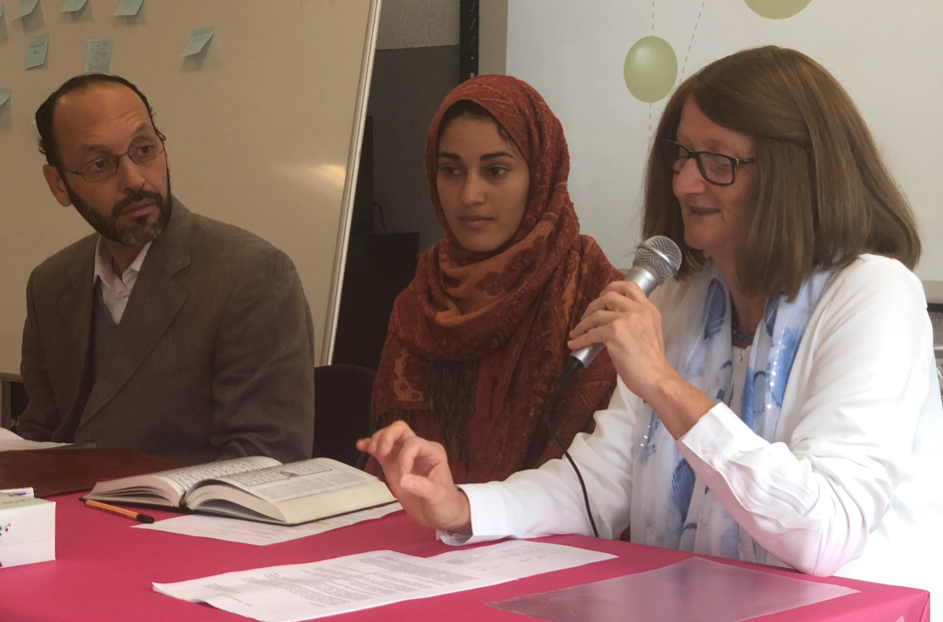
Nov 12, 2018 | Focolare Worldwide
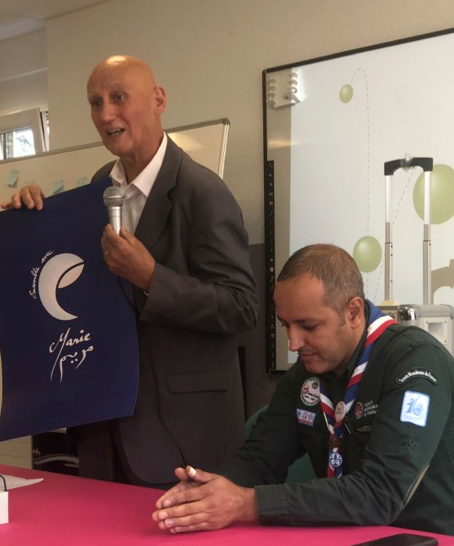 Indifference and mistrust are often born from fear and from a lack of knowledge about one another. In order to face the growing tensions of identity that undermine society, there are many very fruitful opportunities for dialogue and spiritual sharing created by religious institutions and associations. This is the case of Ensemble avec Marie (Together with Mary www.ensembleavecmarie.org) that grew from an experience in Lebanon and has spread through France, Belgium and several African nations, with the goal of promoting and facilitating a more fraternal society, through a more widespread and spiritual approach.” It is open to everyone who is seeking ways of peaceful togetherness while respecting freedom of worship and the right to be different. “Together with Mary” begins from the only woman who is mentioned by name 43 times in the Koran (an entire sura, one of the 114 divisions of the sacred writing is devoted to her) and from the account of the Annunciation, recognized as a true moment of encounter between the Koran and the Gospel. Both traditions, Christian and Muslim acknowledge the virginal conception of Jesus in the womb of Mary (Mariam), following the annunciation by the angel Gabriel (Jibril). The day in Lausanne opened with a reading of this sura on Mary in Arabic and French, followed by the Biblical account. “We are collaborating together for the building of a civilisation of love and peace, respecting the identity of each one,” said the president of the Association, Gérard Testard. The Focolare Movement, which is active in ecumenical and interreligious dialogue on a local and international level, is participating in this initiative. “The words dialogue, encounter and communion are essential for me. Both in a vertical and a horizontal direction. This is the reason why I’m committed to everything that helps to contribute to the unity and renewal of the Church,” says Martin Hoegger, member of the focolare community and pastor of the Reformed Evangelical Church in the Swiss Canton of Vaud, who attended the gathering.
Indifference and mistrust are often born from fear and from a lack of knowledge about one another. In order to face the growing tensions of identity that undermine society, there are many very fruitful opportunities for dialogue and spiritual sharing created by religious institutions and associations. This is the case of Ensemble avec Marie (Together with Mary www.ensembleavecmarie.org) that grew from an experience in Lebanon and has spread through France, Belgium and several African nations, with the goal of promoting and facilitating a more fraternal society, through a more widespread and spiritual approach.” It is open to everyone who is seeking ways of peaceful togetherness while respecting freedom of worship and the right to be different. “Together with Mary” begins from the only woman who is mentioned by name 43 times in the Koran (an entire sura, one of the 114 divisions of the sacred writing is devoted to her) and from the account of the Annunciation, recognized as a true moment of encounter between the Koran and the Gospel. Both traditions, Christian and Muslim acknowledge the virginal conception of Jesus in the womb of Mary (Mariam), following the annunciation by the angel Gabriel (Jibril). The day in Lausanne opened with a reading of this sura on Mary in Arabic and French, followed by the Biblical account. “We are collaborating together for the building of a civilisation of love and peace, respecting the identity of each one,” said the president of the Association, Gérard Testard. The Focolare Movement, which is active in ecumenical and interreligious dialogue on a local and international level, is participating in this initiative. “The words dialogue, encounter and communion are essential for me. Both in a vertical and a horizontal direction. This is the reason why I’m committed to everything that helps to contribute to the unity and renewal of the Church,” says Martin Hoegger, member of the focolare community and pastor of the Reformed Evangelical Church in the Swiss Canton of Vaud, who attended the gathering.  And Gwenaelle Dalalande, who is involved in interreligious dialogue, commented: “Talking about Mary as a model was a very vast topic. I made a choice and wanted to emphasise just a few aspects. Some moments of her life are able to enrich some of the moments in our lives. Regarding the Annunciation, I asked: ‘Are there perhaps moments of our lives that are annunciations?’ They are the moments when God manifests himself and we are called to respond to him. Chiara Lubich emphasises the connection between the Word of God and Mary, presenting her as the one who is “completely clothed with the Word.” In the end, I also shared a personal experience. Mary’s example and her perseverance through suffering helped me to overcome a very difficult period in my life. Renewing my yes to God as she had done, I rediscovered a new life.” Naceur Ghomraci, Imam and spiritual assistant at the jail in the Canton of Vaud: “The strength and commitment of Chiara Lubich are a great discovery for all the faithful. Her invitation to place at the basis of our actions the Golden Rule (Do to others as you would have them do to you, which is present in all religions) struck me very much. This is a project of God that all have to contribute to.” In his community they are in the process of building a new mosque. “I’d like it to be dedicated to Mary,” said the Imam who had attended the international congress of Muslims and Christians, organized by the Focolare Movement last April. Imam Abdel Ahid Kort, who runs the centre that hosted the gathering, described Mary as “a mystery, a fathomless ocean,” expressing the opinion of many Muslim exegetes: “A prophetess and a fulfilled woman, who brings us from an individual spirituality, her communion with God, to an active spirituality, the encounter with others; always animated by love. How did she overcome her trials? She did it in silence, in prayer and in altruism. She lived the real fasting: that of the heart, of words and of worldly vanities.” Who is her son, Jesus, for the Imam? “He is the smile and humility of my Christian brothers and sisters. He teaches me forgiveness and love for my enemy.
And Gwenaelle Dalalande, who is involved in interreligious dialogue, commented: “Talking about Mary as a model was a very vast topic. I made a choice and wanted to emphasise just a few aspects. Some moments of her life are able to enrich some of the moments in our lives. Regarding the Annunciation, I asked: ‘Are there perhaps moments of our lives that are annunciations?’ They are the moments when God manifests himself and we are called to respond to him. Chiara Lubich emphasises the connection between the Word of God and Mary, presenting her as the one who is “completely clothed with the Word.” In the end, I also shared a personal experience. Mary’s example and her perseverance through suffering helped me to overcome a very difficult period in my life. Renewing my yes to God as she had done, I rediscovered a new life.” Naceur Ghomraci, Imam and spiritual assistant at the jail in the Canton of Vaud: “The strength and commitment of Chiara Lubich are a great discovery for all the faithful. Her invitation to place at the basis of our actions the Golden Rule (Do to others as you would have them do to you, which is present in all religions) struck me very much. This is a project of God that all have to contribute to.” In his community they are in the process of building a new mosque. “I’d like it to be dedicated to Mary,” said the Imam who had attended the international congress of Muslims and Christians, organized by the Focolare Movement last April. Imam Abdel Ahid Kort, who runs the centre that hosted the gathering, described Mary as “a mystery, a fathomless ocean,” expressing the opinion of many Muslim exegetes: “A prophetess and a fulfilled woman, who brings us from an individual spirituality, her communion with God, to an active spirituality, the encounter with others; always animated by love. How did she overcome her trials? She did it in silence, in prayer and in altruism. She lived the real fasting: that of the heart, of words and of worldly vanities.” Who is her son, Jesus, for the Imam? “He is the smile and humility of my Christian brothers and sisters. He teaches me forgiveness and love for my enemy.
Nov 11, 2018 | Non categorizzato
11 November commemorates the centennial of the end of the First World War, which was followed by the Peace Conference in Paris (18 January 1919 – 21 January 1920). But for at least another 5 years all of Europe was beset by continual revolutions and violence of all kinds. From Finland to Anatolia, from the Caucasus to Ireland, from Germany to Greece. “Wars are always tragic, affirmed the President of the Italian Republic, Sergio Materella, last 4 November. And citing the words of the writer, Claudio Magris, “Every country thought of teaching a good lesson to the nearest enemy, benefitting in territorial and other advantages. Nobody could have imagined that war would have been so tremendous, and would have lasted so long.” In our time, still marked by winds of war, may the recurrence of the centennial be a warning to persevere in the process of European integration and unification, the only guarantees for an enduring peace.”
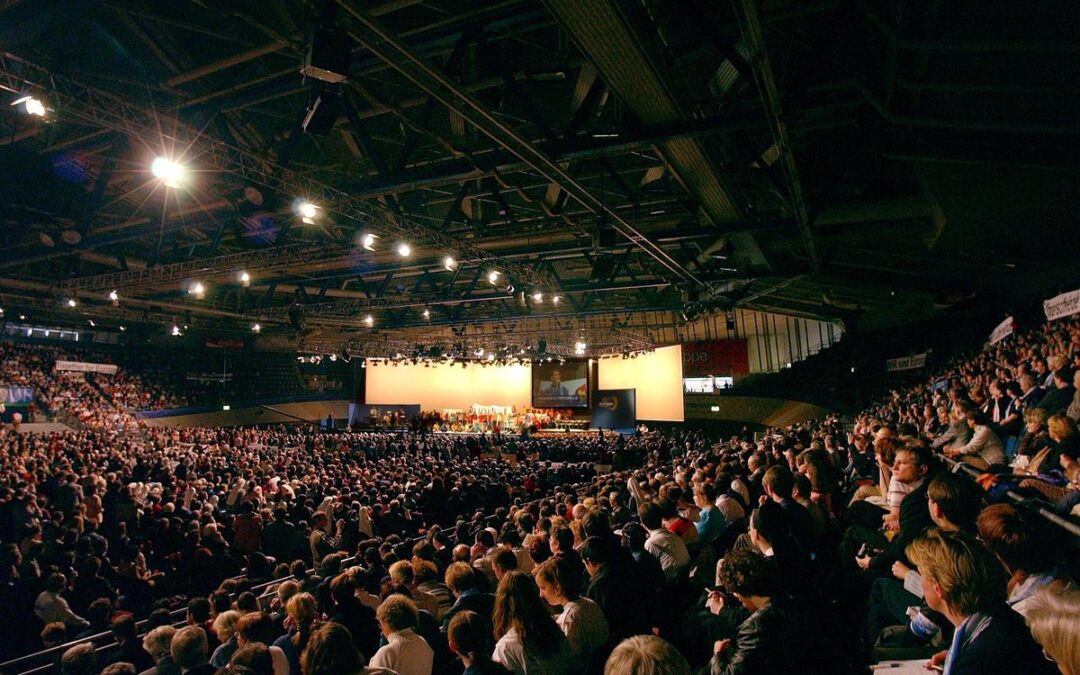
Nov 10, 2018 | Focolare Worldwide
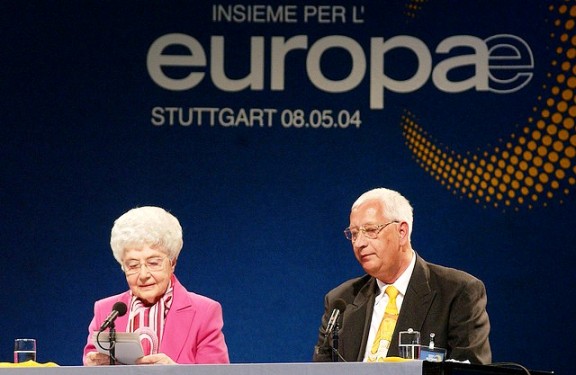 «Universal brotherhood was also the project of people who were not motivated by religious motives, but simply by the desire to benefit humanity. The French Revolution’s motto: “liberty, equality, fraternity”, summarizes the great political project of modernity, a project which, in part, has been disregarded. While numerous countries have built democratic systems of government and have succeeded in achieving some degree of liberty and equality, the same cannot be said of fraternity which has been proclaimed more than it has been lived. But the one who brought fraternity as the essential gift to humanity was above all Jesus. In revealing the fatherhood of God, He broke down the walls which separate those who are “the same” from those who are “different”, friends from enemies. He loosened all people from the bonds that imprison them, from all forms of slavery and subordination, from every unjust relationship, thus carrying out an authentic existential, cultural and political revolution. (…) The instrument that Jesus offered to us in order to accomplish this universal fraternity was love, a great love, a new love, different from the one we usually know. In fact, He transplanted the way of loving of heaven here on earth. This love requires first of all that we love everyone, therefore, not only relatives and friends. It asks that we love the pleasant and the unpleasant, our fellow-countryman and the stranger, the European and the immigrant, those of our Church and of another, of our religion and of another. Today it asks the countries of Western Europe to love those of Central and Eastern Europe – and vice versa – and it asks everyone to be open to those of other continents. In the vision of its founders, in fact, Europe is a family of sister nations, not closed in itself, but open to a universal mission: Europe wants its unity to contribute, then, to the unity of the human family. This love asks that we love our enemies as well and that we forgive them if they have offended us. After the wars which stained our continent with blood, many Europeans were exemplary in loving their enemies and promoting reconciliation.
«Universal brotherhood was also the project of people who were not motivated by religious motives, but simply by the desire to benefit humanity. The French Revolution’s motto: “liberty, equality, fraternity”, summarizes the great political project of modernity, a project which, in part, has been disregarded. While numerous countries have built democratic systems of government and have succeeded in achieving some degree of liberty and equality, the same cannot be said of fraternity which has been proclaimed more than it has been lived. But the one who brought fraternity as the essential gift to humanity was above all Jesus. In revealing the fatherhood of God, He broke down the walls which separate those who are “the same” from those who are “different”, friends from enemies. He loosened all people from the bonds that imprison them, from all forms of slavery and subordination, from every unjust relationship, thus carrying out an authentic existential, cultural and political revolution. (…) The instrument that Jesus offered to us in order to accomplish this universal fraternity was love, a great love, a new love, different from the one we usually know. In fact, He transplanted the way of loving of heaven here on earth. This love requires first of all that we love everyone, therefore, not only relatives and friends. It asks that we love the pleasant and the unpleasant, our fellow-countryman and the stranger, the European and the immigrant, those of our Church and of another, of our religion and of another. Today it asks the countries of Western Europe to love those of Central and Eastern Europe – and vice versa – and it asks everyone to be open to those of other continents. In the vision of its founders, in fact, Europe is a family of sister nations, not closed in itself, but open to a universal mission: Europe wants its unity to contribute, then, to the unity of the human family. This love asks that we love our enemies as well and that we forgive them if they have offended us. After the wars which stained our continent with blood, many Europeans were exemplary in loving their enemies and promoting reconciliation. 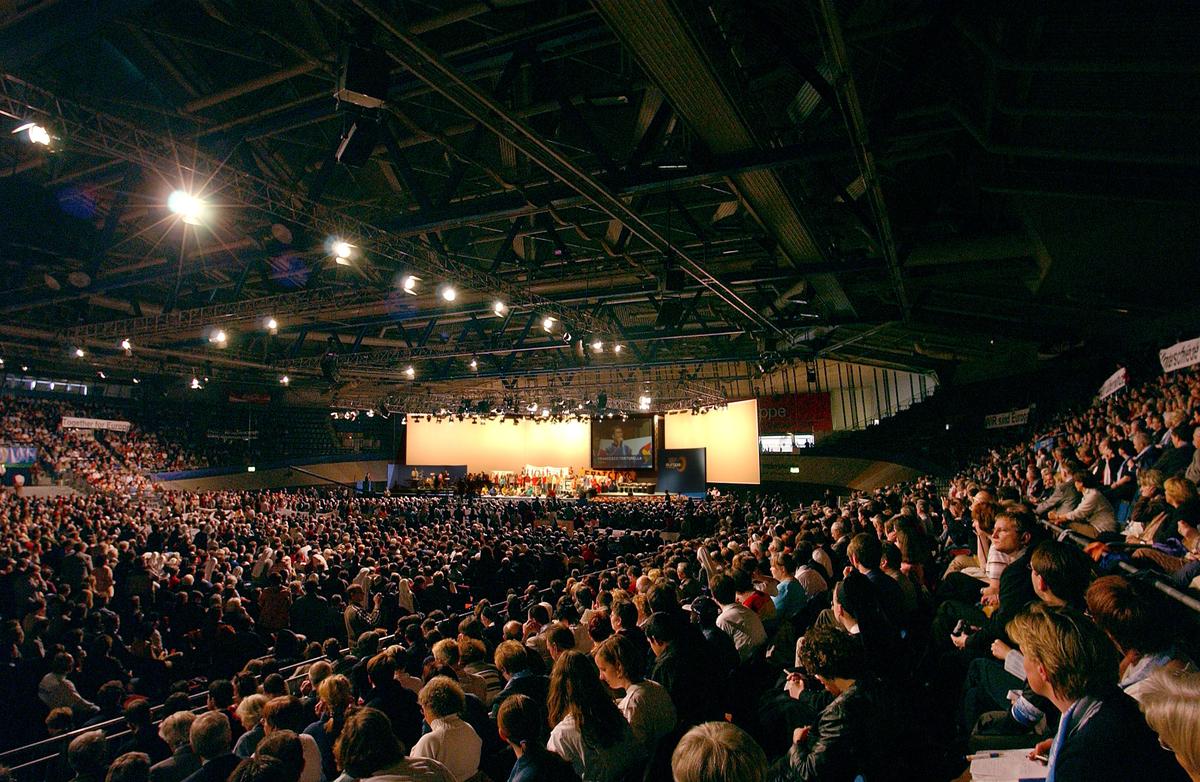 Therefore, the love I am speaking of makes no distinctions and takes into consideration all those we meet in any moment, directly or indirectly: those who are next to us physically, but also those about whom we or others are speaking; those who will receive the work we do day by day, those we come to know about through the newspapers or television…. Because this is the way God our Father loves, making the sun rise on the bad and the good, and causing the rain to fall on the just and the unjust alike (cf Mt 5:45). (…) Furthermore, the love that Jesus brought is not an idealistic, sentimental love, made up of words. It is a concrete love. It needs to be expressed with deeds. And this is possible if we make ourselves all things to all people: sick with those who are sick; joyful with those who are joyful; worried, insecure, hungry, poor with others, feeling in ourselves what they feel and acting accordingly». Chiara Lubich, Stuttgart 8th May 2004
Therefore, the love I am speaking of makes no distinctions and takes into consideration all those we meet in any moment, directly or indirectly: those who are next to us physically, but also those about whom we or others are speaking; those who will receive the work we do day by day, those we come to know about through the newspapers or television…. Because this is the way God our Father loves, making the sun rise on the bad and the good, and causing the rain to fall on the just and the unjust alike (cf Mt 5:45). (…) Furthermore, the love that Jesus brought is not an idealistic, sentimental love, made up of words. It is a concrete love. It needs to be expressed with deeds. And this is possible if we make ourselves all things to all people: sick with those who are sick; joyful with those who are joyful; worried, insecure, hungry, poor with others, feeling in ourselves what they feel and acting accordingly». Chiara Lubich, Stuttgart 8th May 2004
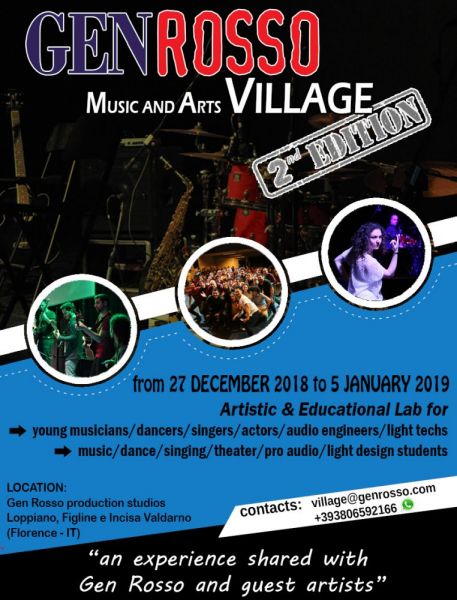
Nov 9, 2018 | Non categorizzato
 After the success of the 1st edition, Gen Rosso (International Performing Arts Group) presents the 2nd edition of “Gen Rosso Music and Arts Village“, a depeening artistic experience and a sharing of values in the light of the charism of unity. The Village, which will take place at Gen Rosso production studios in Loppiano from 27 December 2018 to 5 January 2019, intends to involve young professionals and students of various disciplines such as music, dance, vocals, theater, sound and light engineering, from 18 years old and up.A certificate of participation will be issued at the end of the program. The teaching methodology is designed and managed by Gen Rosso tutors in collaboration with teachers with recognized skills and artistic experience. The program includes the study of specific themes in the arts world, the exchange of experiences, creative spaces and practical workshops that will converge in a final performance. Contributions by professional artists are scheduled for some evenings. The Gen Rosso Village secretary is available to provide further information and all the necessary documentation for registration (limited number). Contacts Secretary VILLAGE: tel +390558339821 (9 am to 1 pm) mobile Franco Gallelli +393806592166 (24h) e-mail village@genrosso.com https://www.youtube.com/watch?v=G9eF6q1PYO4
After the success of the 1st edition, Gen Rosso (International Performing Arts Group) presents the 2nd edition of “Gen Rosso Music and Arts Village“, a depeening artistic experience and a sharing of values in the light of the charism of unity. The Village, which will take place at Gen Rosso production studios in Loppiano from 27 December 2018 to 5 January 2019, intends to involve young professionals and students of various disciplines such as music, dance, vocals, theater, sound and light engineering, from 18 years old and up.A certificate of participation will be issued at the end of the program. The teaching methodology is designed and managed by Gen Rosso tutors in collaboration with teachers with recognized skills and artistic experience. The program includes the study of specific themes in the arts world, the exchange of experiences, creative spaces and practical workshops that will converge in a final performance. Contributions by professional artists are scheduled for some evenings. The Gen Rosso Village secretary is available to provide further information and all the necessary documentation for registration (limited number). Contacts Secretary VILLAGE: tel +390558339821 (9 am to 1 pm) mobile Franco Gallelli +393806592166 (24h) e-mail village@genrosso.com https://www.youtube.com/watch?v=G9eF6q1PYO4
Nov 9, 2018 | Non categorizzato
One unforgettable night, 29 years ago, the citizens of East Berlin started to hammer down the wall that had divided them from the Western side of the city, since 13 August 1961. The Berlin wall was just a tract along the border line that divided all of Europe into two parts during the cold war: the zone under US surveillance to the west and the Soviet zone to the east Today, other walls still remain, like that between North and South Korea, and new ones have been built. These walls violate the people’s fundamental rights to health, education, employment, water and food. And which, at times separate communities and families, like those between Israel and Palestine, between Egypt and Israel, between the USA and Mexico, between India and Bangladesh, between Morocco, Algiers and Mauritius. Also in Europe new walls divide, like those between Ceuta and Mellila, or, or between Greece and Turkey. Lastly, a wall of water, is the Mediterranean sea, which continues to swallow up victims. The unexpected fall of the Berlin wall however, had triggered a hope which is still actual today: that all the walls, thanks to the commitment of man men and women of good will, may one day collapse.
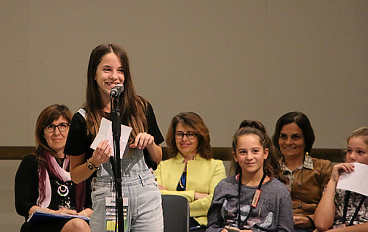
Nov 9, 2018 | Non categorizzato
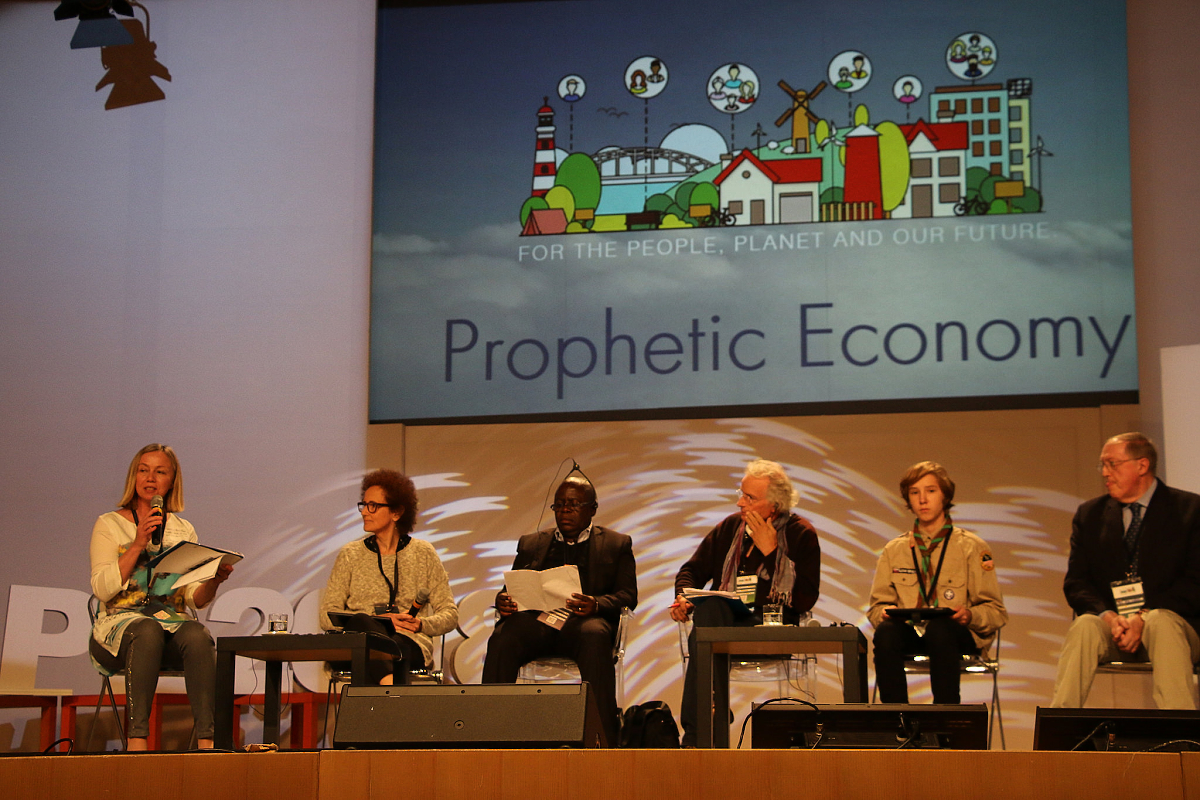 500 “Prophetic Economy” participants from 40 countries and all five continents were gathered from 2 to 4 November at the International Mariapolis Centre, CastelGandolfo, near Rome, Italy. The event facilitated interactive and intergenerational exchange through a program of inspiring contributions, work groups and creative workshops. What began as an international platform of encounter, exchange and encouragement, the event went far beyond the limits of mere networking, to become a driving force of energy and commitment for initiatives and actions at local, regional and international levels. Internationally-renowned economist Jeffrey Sachs, a key speaker at the event, affirmed, “Prophetic economy means an economy that operates in the vision of the prophets, of justice, of peace, a vision of meeting the needs of the poorest people, a vision of protecting creation.”.
500 “Prophetic Economy” participants from 40 countries and all five continents were gathered from 2 to 4 November at the International Mariapolis Centre, CastelGandolfo, near Rome, Italy. The event facilitated interactive and intergenerational exchange through a program of inspiring contributions, work groups and creative workshops. What began as an international platform of encounter, exchange and encouragement, the event went far beyond the limits of mere networking, to become a driving force of energy and commitment for initiatives and actions at local, regional and international levels. Internationally-renowned economist Jeffrey Sachs, a key speaker at the event, affirmed, “Prophetic economy means an economy that operates in the vision of the prophets, of justice, of peace, a vision of meeting the needs of the poorest people, a vision of protecting creation.”. 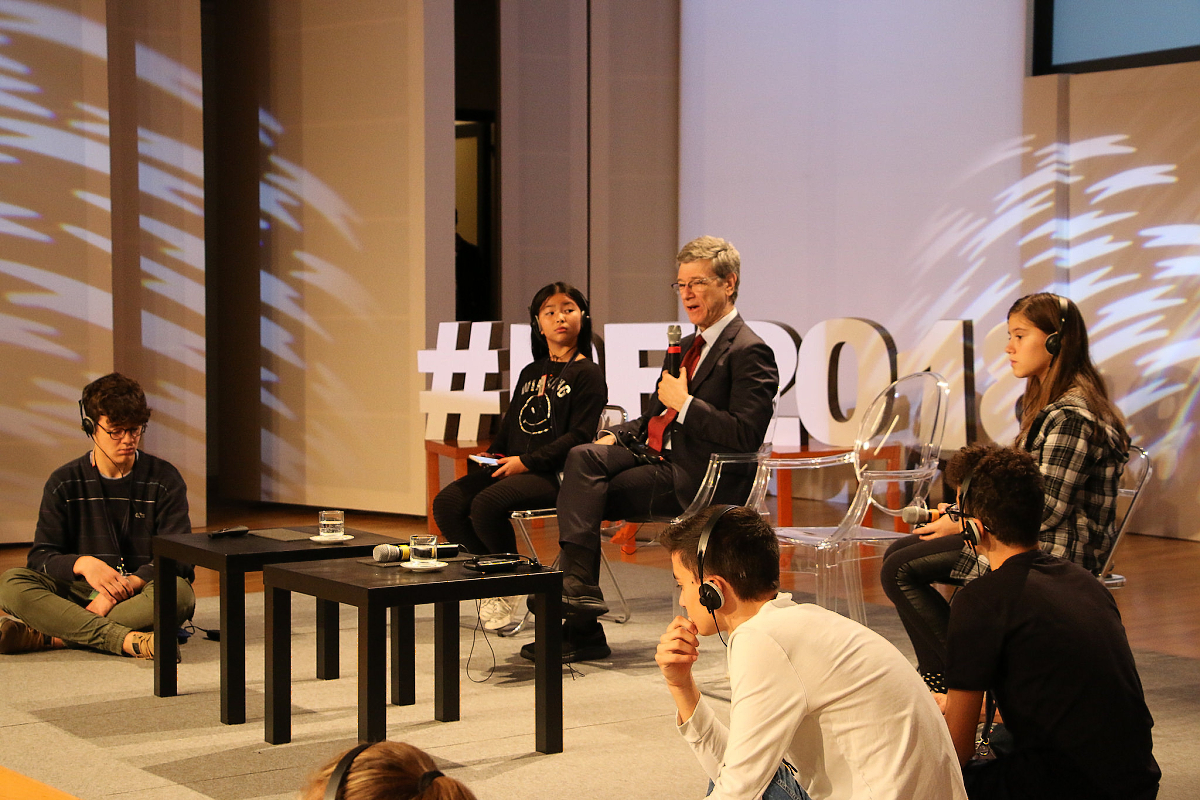 Diversity characterized the participants: economists, ecological activists, experts from the financial sector, students, entrepreneurs, people from a variety of different cultural and religious backgrounds, with a wide age range – the youngest being only 9 years old! The younger attendees were protagonists both in age-specific sessions involving interaction with experts in the fields of economy and ecology, and in cross-generational panels, contributing their own distinctive questions, proposals and life experiences. “How good it has been to have the children and young people with us” said Josiane Gauthier, Secretary General of Catholic Development Alliance CIDSE. Inspiring us with their profound intelligence and grace and truth”. The event highlighted examples of good economic practices. As Italian economist Stefano Zamagni explained, “It‘s those who look ahead and dare to gaze beyond the obstacles. The current economic and social models no longer work”. “These kind of economic practices already exist”, observed Lorna Gold, economist with Trocair, the Irish development agency, “but all too often they’re invisible in the media and our culture.”
Diversity characterized the participants: economists, ecological activists, experts from the financial sector, students, entrepreneurs, people from a variety of different cultural and religious backgrounds, with a wide age range – the youngest being only 9 years old! The younger attendees were protagonists both in age-specific sessions involving interaction with experts in the fields of economy and ecology, and in cross-generational panels, contributing their own distinctive questions, proposals and life experiences. “How good it has been to have the children and young people with us” said Josiane Gauthier, Secretary General of Catholic Development Alliance CIDSE. Inspiring us with their profound intelligence and grace and truth”. The event highlighted examples of good economic practices. As Italian economist Stefano Zamagni explained, “It‘s those who look ahead and dare to gaze beyond the obstacles. The current economic and social models no longer work”. “These kind of economic practices already exist”, observed Lorna Gold, economist with Trocair, the Irish development agency, “but all too often they’re invisible in the media and our culture.” 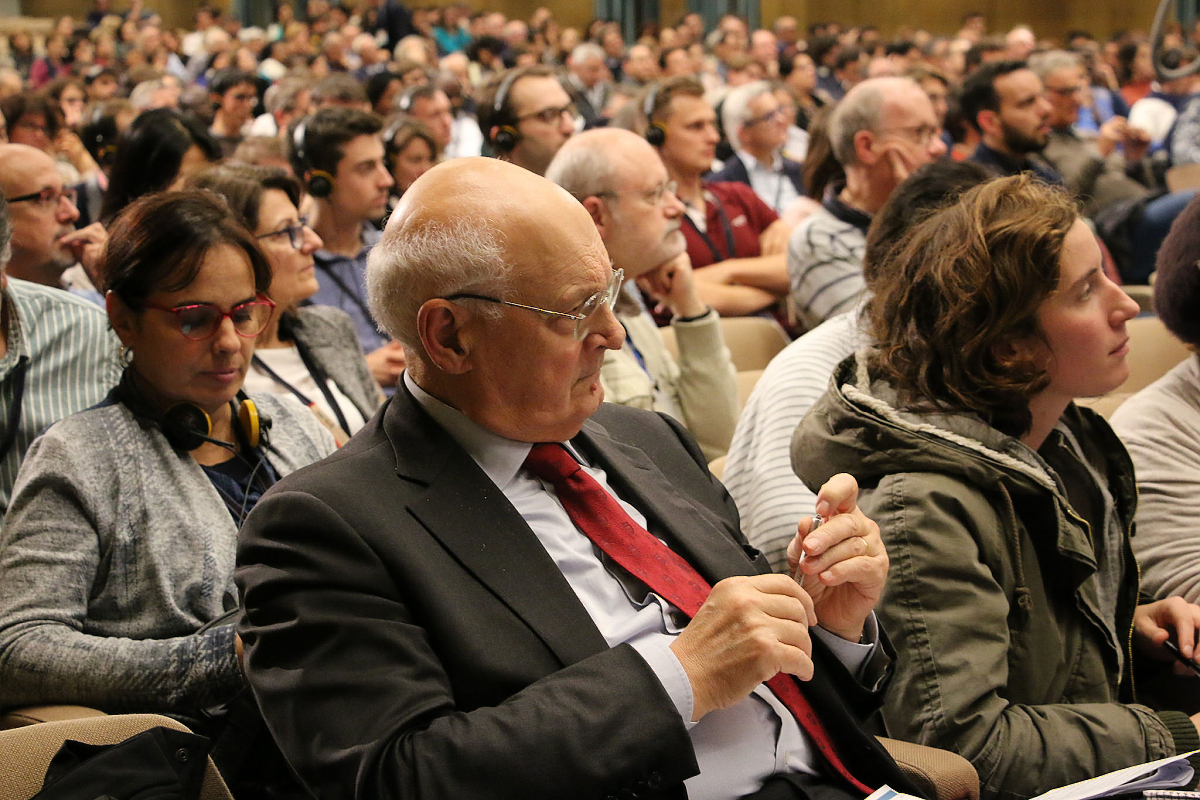 The “Prophetic Economy Award” was launched to promote good practice through examples of the prophetic economy in action. Carlo Petrini, founder of the Slow Food Movement, acknowledged the award winners. “They practice a form of economic reality different from the norm, they see beyond the pervasive economic modes. They are not so much prophetic in vision, as in their daily practice.” “This is not about utopias or ‘small islands’ within an unjust and unchanging system. Here, we’re looking at signals of tangible change,” observed Argentinean economist Cristina Calvo. “In the face of massive global financial mechanisms, we run the risk of feeling powerless. The antidote to being static is to widen the spectrum of action on all levels: micro, medium and macro.” A significant element within this event was the space given to those living in situations of poverty or social exclusion to make their own voice heard. “The time has come to rethink our economy and rethink our world, not ‘for’ the poor, not even with their participation, but starting from them,” concluded Jean Tonglet of ATD Fourth World. “Our knowledge is incomplete until it includes the knowledge of those we want to liberate from poverty, who struggle with its effects on a daily basis.” The challenge launched by this event is to invent new ways of collaboration, in order to be stronger and more creative in efforts to change to lifestyles based on a more sharing, more just and more sustainable economy. “The new idea at the basis of this event,” explained Italian economist Luigino Bruni, “was to bring ecology and economy together. In today’s world, we cannot speak of poverty without mentioning climate. One of the great messages of Pope Francis’ pontificate is the invitation to activate processes, not occupy spaces, because time is superior to space. Here, we can say that a process has been started”.
The “Prophetic Economy Award” was launched to promote good practice through examples of the prophetic economy in action. Carlo Petrini, founder of the Slow Food Movement, acknowledged the award winners. “They practice a form of economic reality different from the norm, they see beyond the pervasive economic modes. They are not so much prophetic in vision, as in their daily practice.” “This is not about utopias or ‘small islands’ within an unjust and unchanging system. Here, we’re looking at signals of tangible change,” observed Argentinean economist Cristina Calvo. “In the face of massive global financial mechanisms, we run the risk of feeling powerless. The antidote to being static is to widen the spectrum of action on all levels: micro, medium and macro.” A significant element within this event was the space given to those living in situations of poverty or social exclusion to make their own voice heard. “The time has come to rethink our economy and rethink our world, not ‘for’ the poor, not even with their participation, but starting from them,” concluded Jean Tonglet of ATD Fourth World. “Our knowledge is incomplete until it includes the knowledge of those we want to liberate from poverty, who struggle with its effects on a daily basis.” The challenge launched by this event is to invent new ways of collaboration, in order to be stronger and more creative in efforts to change to lifestyles based on a more sharing, more just and more sustainable economy. “The new idea at the basis of this event,” explained Italian economist Luigino Bruni, “was to bring ecology and economy together. In today’s world, we cannot speak of poverty without mentioning climate. One of the great messages of Pope Francis’ pontificate is the invitation to activate processes, not occupy spaces, because time is superior to space. Here, we can say that a process has been started”.  The younger participants spent time considering and embracing the challenge launched by the World Food Organization to work to eradicate hunger in the world by 2030 (#zerohunger),formulating their own proposals: – to promote the idea of a “deferred meal”, asking restaurants and bars to encourage their clients to buy an extra meal for someone in need, and issuing a #zerohunger sticker to participating businesses; – to campaign for a new subject in the school curriculum teaching the Sustainable Development Goals promoted by the United Nations. Prophetic Economy is an international project jointly run by seven organizations: Pope John XXIII Community Association, Nomadelfia, The Global Catholic Climate Movement, ATD Fourth World, Associazione Mondo di Comunità e Famiglia (World of Community and Family Association), SlotMob initiative and the international Focolare Movement represented by its Economy of Communion project and ‘Teens for Unity’ youth section.
The younger participants spent time considering and embracing the challenge launched by the World Food Organization to work to eradicate hunger in the world by 2030 (#zerohunger),formulating their own proposals: – to promote the idea of a “deferred meal”, asking restaurants and bars to encourage their clients to buy an extra meal for someone in need, and issuing a #zerohunger sticker to participating businesses; – to campaign for a new subject in the school curriculum teaching the Sustainable Development Goals promoted by the United Nations. Prophetic Economy is an international project jointly run by seven organizations: Pope John XXIII Community Association, Nomadelfia, The Global Catholic Climate Movement, ATD Fourth World, Associazione Mondo di Comunità e Famiglia (World of Community and Family Association), SlotMob initiative and the international Focolare Movement represented by its Economy of Communion project and ‘Teens for Unity’ youth section.
Photo album on Flickr 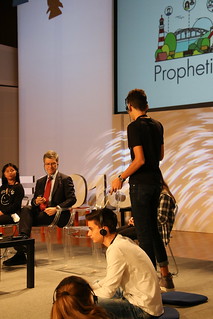
Nov 8, 2018 | Non categorizzato
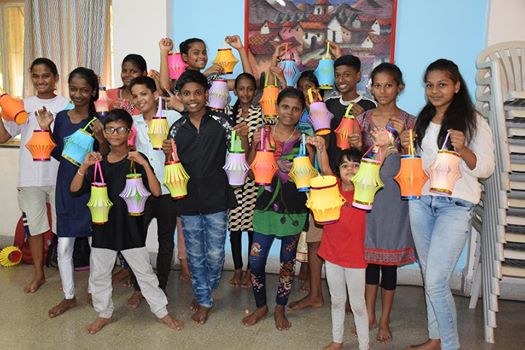
Nov 7, 2018 | Focolare Worldwide
 In India, in these days is the Festival of Light, the most important celebration of the year: Diwali. It commerates the victorious return of Rama, the manifestation of the Divinity Vishnu, in his capital, Ayodhya, after 14 years of exile and wandering. Therefore, today is a sybolic celebration of the return of the Light to its original home: the victory of good over evil. It is customary to light lamps and candles during the feast, which are traditionally called diya. In many areas of India there are light shows. Project Udisha in Mubai has invited everyone to “light a lamp on the front porch to remind us of the victory of Love, which is in our hearts and which we want to make grwo towards all, beginning with our own family.” See the Facebook page UDISHA PROGETTO MUMBAI INDIA
In India, in these days is the Festival of Light, the most important celebration of the year: Diwali. It commerates the victorious return of Rama, the manifestation of the Divinity Vishnu, in his capital, Ayodhya, after 14 years of exile and wandering. Therefore, today is a sybolic celebration of the return of the Light to its original home: the victory of good over evil. It is customary to light lamps and candles during the feast, which are traditionally called diya. In many areas of India there are light shows. Project Udisha in Mubai has invited everyone to “light a lamp on the front porch to remind us of the victory of Love, which is in our hearts and which we want to make grwo towards all, beginning with our own family.” See the Facebook page UDISHA PROGETTO MUMBAI INDIA
Nov 7, 2018 | Non categorizzato
A learning community I’m the headteacher of a school in an impoverished and isolated town with high rates of both unemployment and school absenteeism. Over the years, I have tried to create strong and deep relationships with my pupils, their families, my colleagues and all school empoyees. And I’ve had the joy of seeing a real “learning community” spring up, joined together to promote the dignity of each person, in a spirit of openness towards others. In our attempts to help our pupils not to abandon school, we have welcomed the “adoption at a distance” of pupils with their families, but we’ve also made our own contribution: setting up a traditional handcrafts workshop. This project actually attracted presidential acknowledgement. Recently ill health has forced me to limit my activities, but as long as I have breath in my body I will fight for education to help people discover their own value and the love of God. (I. – Argentina) Take on another’s pain Our family was shaken to the core by the suicide of my brother. Life was never the same again for us. I myself began to doubt my faith. My days became emptier and lost their meaning, until one day I realised that my attitude was not helping my parents at all. I gathered up all my strength in order to take on their terrible pain, so that by sharing it with them, their tragic burden might be lightened. Gradually, in this way, I found that my own wounds began to heal. It was not easy, but it’s helping me too, now that I have myself become a mother. (O.M. – Germany) Making space for others I married Marcello when I was 24 years old. We had so much in common, including our faith and we dreamed of the beautiful family we would have together. 15 years later, Marcello was taken from me in an accident. For six years I remained trapped within the unanswerable “why me”? Until the day I accepted an invitation to a meeting, where they spoke of God Love. This disturbed me but gradually the words sank in and began to change something within me. When I heard how, out of love for us, Jesus on the cross experienced abandonment from the Father, crying out “My God, why have you forsaken me?”, my own forsaken cry began to make sense. My situation did not change, I was still a widow, but within me I was able to begin to love once more. Looking around, I noticed how many people were experiencing a void as great as my own. The more I was able to make space for them, the more God filled me with His peace. (A. – Italy) Thinking of those who come after me I’m a teacher. At the end of each lesson, I try to leave the classroom in good order for those who will use the room after me. I leave the desk tidy, the teaching board clean, the windows open to let in the fresh air. Each room has two baskets for waste: one for paper and one for all other discarded items. Often, when I find them mixed up, I try to sort the rubbish so it is all in the correct basket. This means I often lose a few minutes of my break time, which should be to regain strength for my next lessons, but I believe it is definitely time “lost” well! (A. – Switzerland) Keep the conversation going When our children entered adolescence, we found it harder and harder to understand one other. This led to tensions between me and my husband because we had very different approaches to their behaviour. When we realised that our relationships with our children were under threat, with one son in particular, we understood that we had to go beyond the limits of our own ideas and set ourselves to be the first to love, constantly keeping a conversation going between us and with our children. Now they have all grown up, but we know that our role in educating our children is far from over! (Mariolina – Italy)
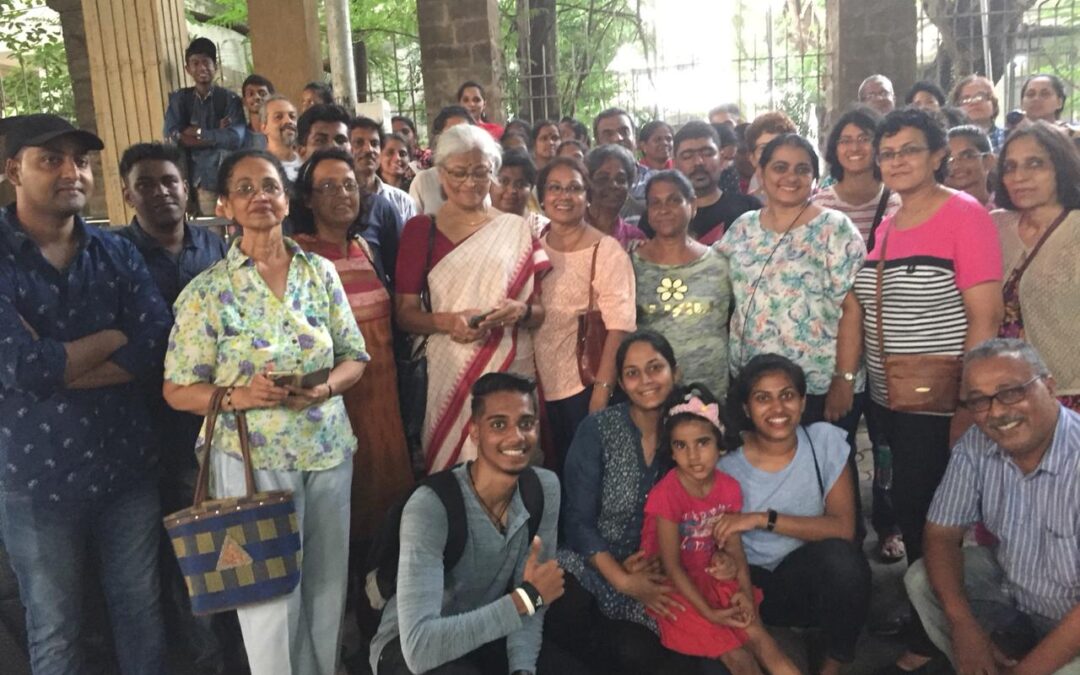
Nov 6, 2018 | Focolare Worldwide
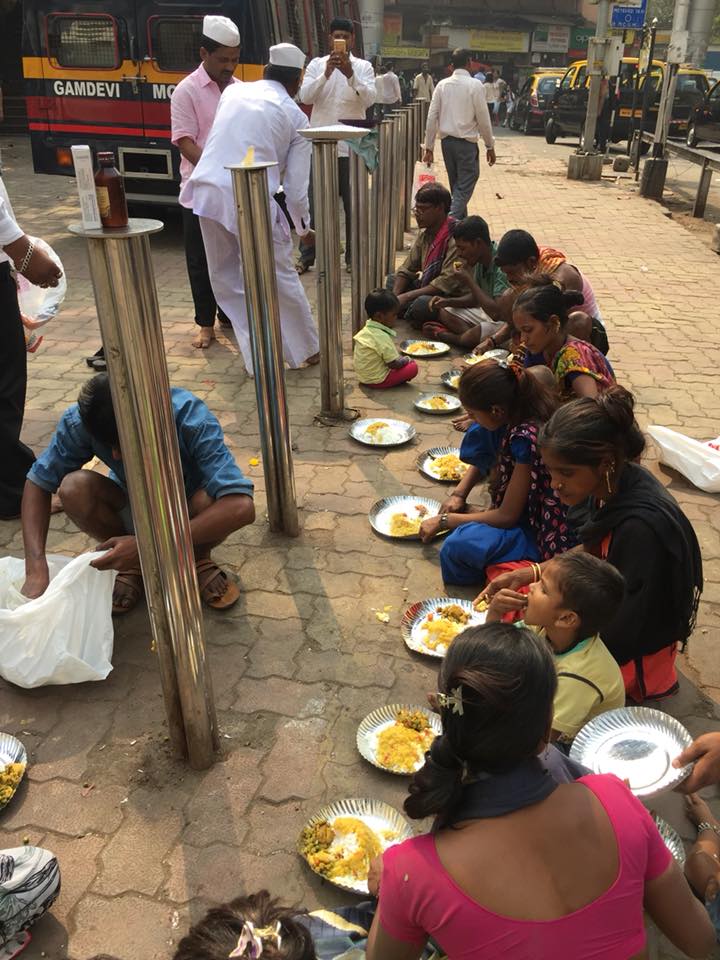 With one of the fastest growing economies, India is a country which is racing toward constant improvement in life expectancy, literacy rates and health conditions. However, of the 1.2 billion inhabitants of the country, the conditions of those living in the poorest regions are still difficult. Despite its status as an economic power, mortal malnutrition persists. Every evening in India, 200 million people try to fall asleep despite the gnawing hunger. And every day, 3,000 children die of hunger. In Mumbai, where thousands of people go for cancer treatments, Sunny of the Focolare community, wrote: “During the treatments, the families sleep on the road or around the hospital, in the lack of all necessities.” This is an alarming situation of poverty, especially if compared with the data related to the growing waste of perfectly whole foodstuffs, thrown away at the end of wedding banquets, rites, and family parties. The country is one of the world’s main producers of foodstuff, but is likewise one in which a good part of these goods are wasted. Among the causes are also the shortage of transport and warehousing systems especially the “cold chain” system: according to estimates in 2017 of the Indian Ministry of Agriculture, the value of the losses connected to foodstuff wastes (not only in terms of farming goods and foodstuffs, but also in the use of water and energy) could range between 8 and 15 billion dollars yearly.
With one of the fastest growing economies, India is a country which is racing toward constant improvement in life expectancy, literacy rates and health conditions. However, of the 1.2 billion inhabitants of the country, the conditions of those living in the poorest regions are still difficult. Despite its status as an economic power, mortal malnutrition persists. Every evening in India, 200 million people try to fall asleep despite the gnawing hunger. And every day, 3,000 children die of hunger. In Mumbai, where thousands of people go for cancer treatments, Sunny of the Focolare community, wrote: “During the treatments, the families sleep on the road or around the hospital, in the lack of all necessities.” This is an alarming situation of poverty, especially if compared with the data related to the growing waste of perfectly whole foodstuffs, thrown away at the end of wedding banquets, rites, and family parties. The country is one of the world’s main producers of foodstuff, but is likewise one in which a good part of these goods are wasted. Among the causes are also the shortage of transport and warehousing systems especially the “cold chain” system: according to estimates in 2017 of the Indian Ministry of Agriculture, the value of the losses connected to foodstuff wastes (not only in terms of farming goods and foodstuffs, but also in the use of water and energy) could range between 8 and 15 billion dollars yearly. 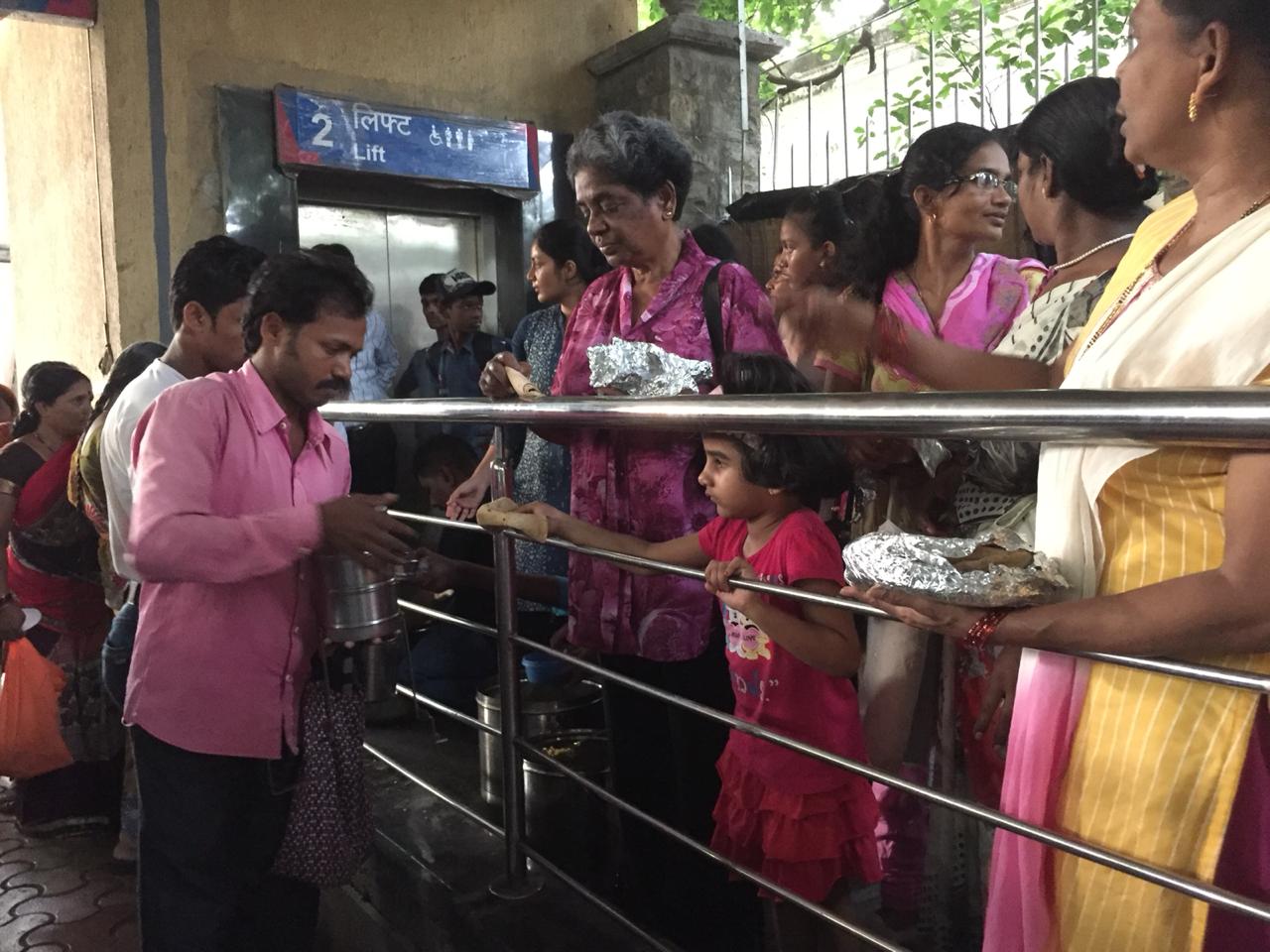 From 2017 onward the nonprofit RotiBank has been working to gather food rejects or those freshly prepared from food companies, like hotels or cafeterias, and involving them in a safe way in the slums or for homeless people. “Roti” is a typical, round Indian bread, from a dough of whole-bran flour and water, baked also on stones. After having received a van as a gift, RotiBank is now working to increase the number of vehicles and staff. Many of the people benefited are children or labourers who do not get a minimum salary to be able to survive. The non-profit initiative avails of a chain of volunteers who, after their normal work hours, participate in the collection and distribution of leftover food. “It is essential – the presentation of the initiative says – to redistribute the leftovers, and perfectly edible food intended for the dumpsite, to people who are really in need.”
From 2017 onward the nonprofit RotiBank has been working to gather food rejects or those freshly prepared from food companies, like hotels or cafeterias, and involving them in a safe way in the slums or for homeless people. “Roti” is a typical, round Indian bread, from a dough of whole-bran flour and water, baked also on stones. After having received a van as a gift, RotiBank is now working to increase the number of vehicles and staff. Many of the people benefited are children or labourers who do not get a minimum salary to be able to survive. The non-profit initiative avails of a chain of volunteers who, after their normal work hours, participate in the collection and distribution of leftover food. “It is essential – the presentation of the initiative says – to redistribute the leftovers, and perfectly edible food intended for the dumpsite, to people who are really in need.” 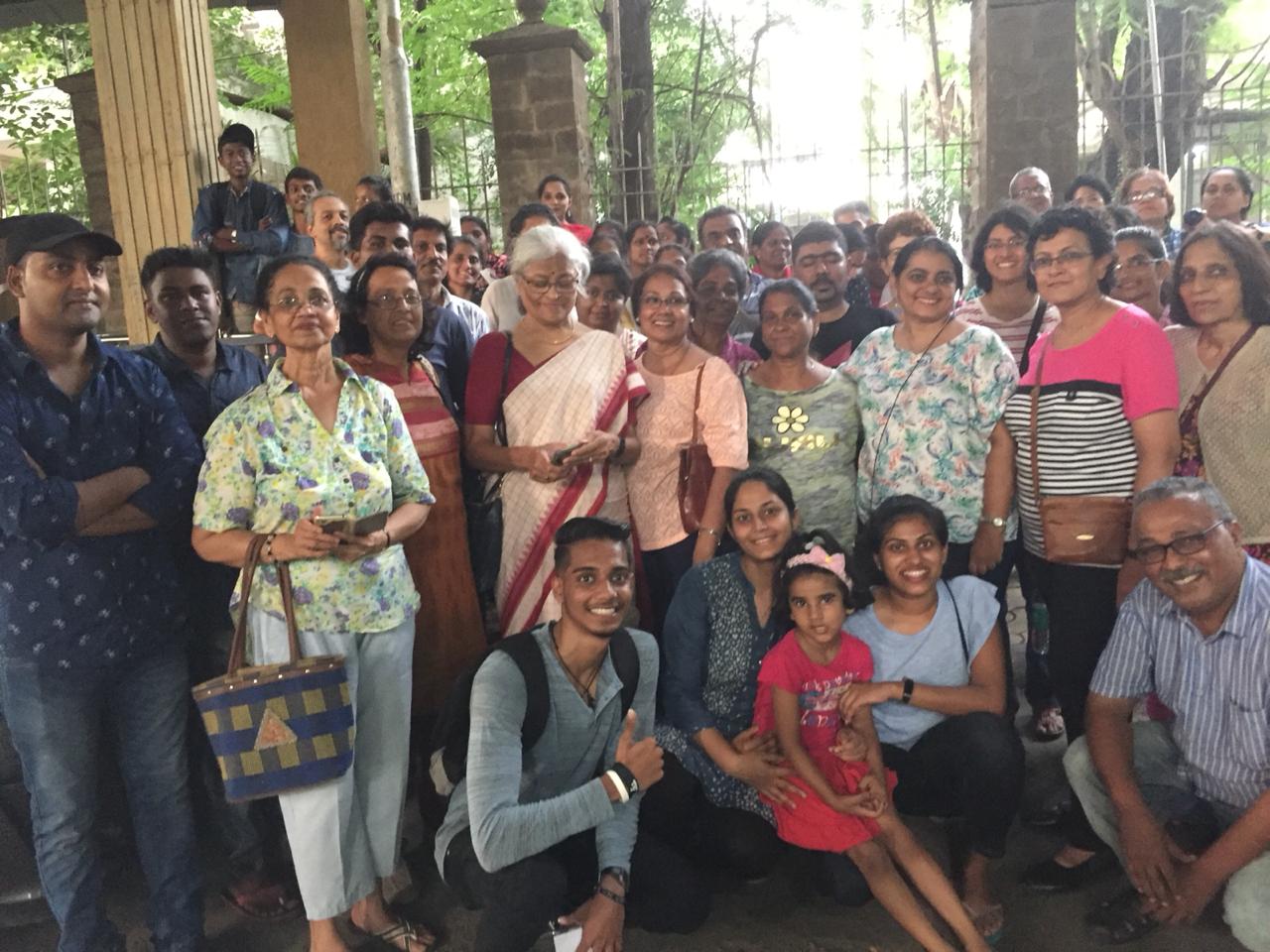 Sunny explained: “We decided to start our battle with an awareness afternoon in support of this non-profit organisation. About 45 members of the Mumbai Focolare community placed themselves at disposal to serve the meals. It was an occasion for us to verify our own shopping methods, and realise that every day we can put something aside to allow these families to have their lunch. It was moving to see how many people were waiting to receive a bit of food. One of the participants said: “I’m so happy to be part of this experience. I shall never forget the expression on the faces of the people queueing up.” Perhaps all of us should see it. Chiara Favotti
Sunny explained: “We decided to start our battle with an awareness afternoon in support of this non-profit organisation. About 45 members of the Mumbai Focolare community placed themselves at disposal to serve the meals. It was an occasion for us to verify our own shopping methods, and realise that every day we can put something aside to allow these families to have their lunch. It was moving to see how many people were waiting to receive a bit of food. One of the participants said: “I’m so happy to be part of this experience. I shall never forget the expression on the faces of the people queueing up.” Perhaps all of us should see it. Chiara Favotti
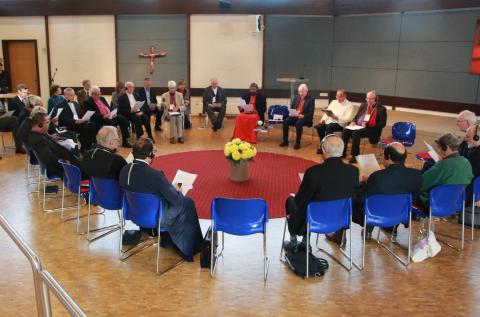
Nov 5, 2018 | Focolare Worldwide
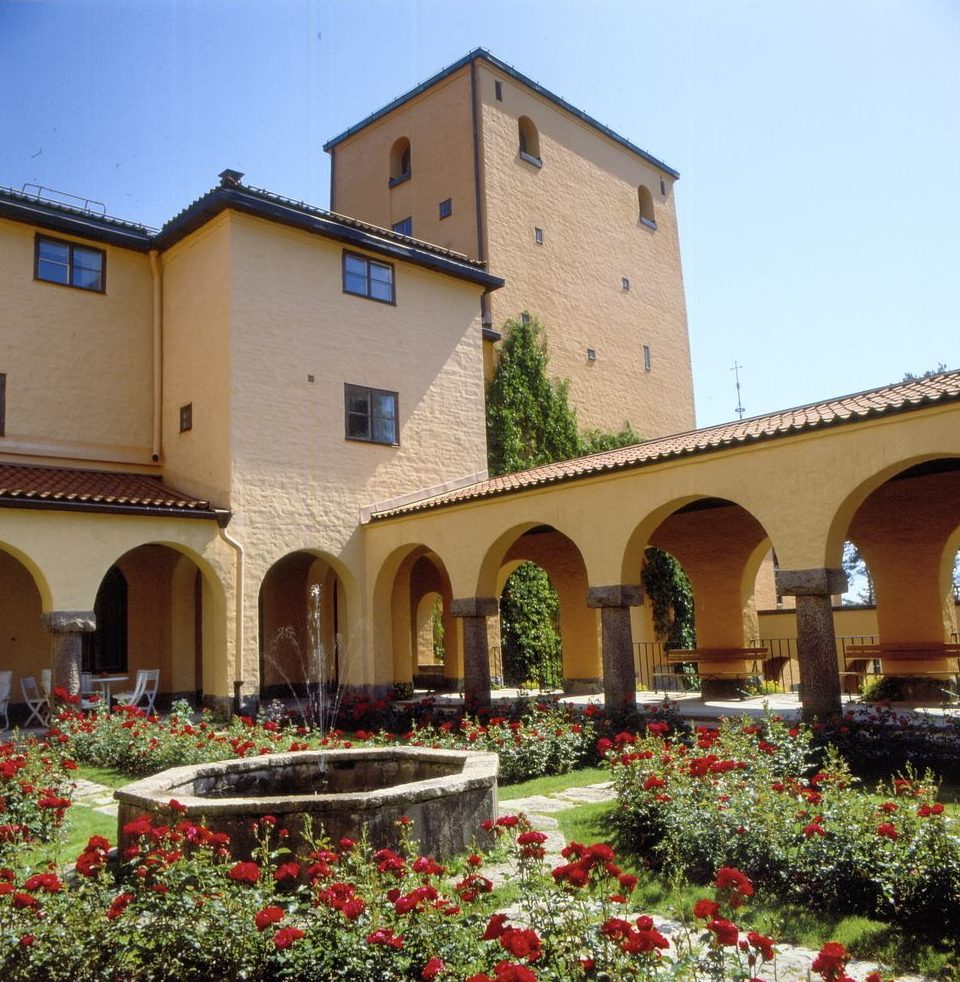 The 40 bishops, who are friends of the Focolari and come from various Christian Churches, have decided to meet in Sweden because of its profound significance in the ecumenial journey. The meeting will be taking place two years after the Lund event, one that has given a new impetus to ecumenical dialogue. In the joint declaration signed by Pope Francis and Bishop Munib Youman, who was then President of the Lutheran World Federation, one reads: “We pledge to witness together to God’s merciful grace, made visible in the crucified and risen Christ. Aware that the way we relate to one another shapes our witness to the Gospel, we commit ourselves to further growth in communion rooted in Baptism, as we seek to remove the remaining obstacles that hinder us from attaining full unity. Christ desires that we be one, so that the world may believe (cf. John 17:21)”. The periodic meetings of these bishops, who also wish to go deeper into the spirituality of unity that stemmed from Chiara Lubich’s charism, aim towards a communion that is a witness to the Gospel. They were held in Jerusalem, Constantinople (Istanbul), London, Augsburg, Katowice and other cities of significant importance in the ecumenical journey.
The 40 bishops, who are friends of the Focolari and come from various Christian Churches, have decided to meet in Sweden because of its profound significance in the ecumenial journey. The meeting will be taking place two years after the Lund event, one that has given a new impetus to ecumenical dialogue. In the joint declaration signed by Pope Francis and Bishop Munib Youman, who was then President of the Lutheran World Federation, one reads: “We pledge to witness together to God’s merciful grace, made visible in the crucified and risen Christ. Aware that the way we relate to one another shapes our witness to the Gospel, we commit ourselves to further growth in communion rooted in Baptism, as we seek to remove the remaining obstacles that hinder us from attaining full unity. Christ desires that we be one, so that the world may believe (cf. John 17:21)”. The periodic meetings of these bishops, who also wish to go deeper into the spirituality of unity that stemmed from Chiara Lubich’s charism, aim towards a communion that is a witness to the Gospel. They were held in Jerusalem, Constantinople (Istanbul), London, Augsburg, Katowice and other cities of significant importance in the ecumenical journey.  The participants attending this 37th meeting belong to 12 Christian Churches and come from 18 different countries; they will reflect on: “The Spirit’s breath of life and today’s world”. Maria Voce, president of the Focolare Movement will also be present and she will speak about “The Holy Spirit, Soul of the Church in the experience and thought of Chiara Lubich”. Other related themes will range: from the ecumenical challenge in different geographical regions to the meaning of reconciliation in today’s culture; from the Church’s renewal to synodality. Space will also be dedicated to the joint commemoration of the Reformation (2017) and its meaning for the Churches today. Stefania Tanesini
The participants attending this 37th meeting belong to 12 Christian Churches and come from 18 different countries; they will reflect on: “The Spirit’s breath of life and today’s world”. Maria Voce, president of the Focolare Movement will also be present and she will speak about “The Holy Spirit, Soul of the Church in the experience and thought of Chiara Lubich”. Other related themes will range: from the ecumenical challenge in different geographical regions to the meaning of reconciliation in today’s culture; from the Church’s renewal to synodality. Space will also be dedicated to the joint commemoration of the Reformation (2017) and its meaning for the Churches today. Stefania Tanesini
Nov 3, 2018 | Non categorizzato
“In Jesus, God simply made himself our brother. He did not only stand beside us, but he entered into us, into our hearts, into our wounds. In doing so he made the wounds of man his own, and thus the wounds that burn in humanity became God’s in this man, Jesus of Nazareth. When he says, ‘I am the way,’ all we need to do is look to the open wound in his side, and there we will find the way. This is certainly not easy; it’s not obvious, either. Yet if we try, if we attempt it, if we risk it, we will realize that he is the way.” (from a homily in 1993) “In Jesus in shows how God, who up to now in the history of his people seemed to have been silent, had not fallen asleep, had not fallen mute. He comes, gathers his poor people and takes them in. He doesn’t do it, however, with lightning action produced by his omnipotence, but in a smaller way, the way of Jesus, the hidden way of service: the way of the cross.” (from a radio interview on September 17, 1978) “Jesus was accused of being a friend to sinners and tax collectors, for having kept ‘bad company.’ His behavior certainly left himself open to misunderstandings. You might say it was a simple criticism of the established order, simple likable eccentricity, or simple protest against the establishment and fixed values. But no: for Jesus, in whom God’s heart beat, he cared for everyone and everything. He didn’t care about those on fringes just in themselves, but rather in that they were part of the whole. “He too is a son of Abraham” (Luke 19:9) is how Jesus himself justified, to the so-called ‘gentlemen’ and those who pretended an external legality, his friendship with Zacchaeus the tax collector.” (from an article in December 1973)
Nov 1, 2018 | Non categorizzato
The saints are great men and women who, having seen their greatness in the Lord, risk for God, as his children, everything that is theirs. They give, demanding nothing. They give their life, their soul, their joy, every earthly bond, every richness. Free and alone, launched into infinity, they wait for Love to bring them into the eternal kingdom; but, already in this life, they feel their hearts fill with love, true love, the only love that satisfies, that consoles, that love which shatters the eyelids of the soul and gives new tears. Ah, no one knows who a saint is! He or she has given and now receives, and an endless flow passes between heaven and earth, joins earth to heaven, and filters from the depths rare ecstasy, celestial sap that does not stop at the saint, but flows over the tired, the mortal, the blind and paralyzed in soul, and breaks through and refreshes, comforts and attracts and saves. If you want to know about love, ask a saint. Chiara Lubich, Essential Writings, New City Press, Hyde Park, NY, 2007, p. 116
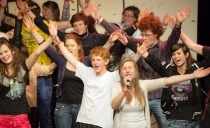
Oct 31, 2018 | Non categorizzato
 Maria Voce Emmaus and Jesús Morán respectively President and Co-President of the Focolare Movement will travel to Belgium for the 60th anniversary of the arrival of the Focolare in that country. Official Focolare website https://www.focolare.org/belgium/news/60-ans-du-mouvement-des-focolari-en-belgique/
Maria Voce Emmaus and Jesús Morán respectively President and Co-President of the Focolare Movement will travel to Belgium for the 60th anniversary of the arrival of the Focolare in that country. Official Focolare website https://www.focolare.org/belgium/news/60-ans-du-mouvement-des-focolari-en-belgique/
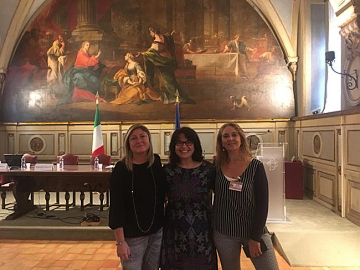
Oct 31, 2018 | Non categorizzato
 It’s called “TST” (tempi senza tensioni, “Time Without Tensions”), a program aimed at balancing work and family life. It was produced by the Il Sentiero di Arianna social cooperative (“Arianna’s way”), which is part of the Economy of Communion, and received first prize in the fourth edition of Family Friendly Businesses that is put on by a forum of family associations in Lazio, Italy. The cooperative, which is part of the Consorzio Tassano Servizi Territoriali network, primarily works in the field of home assistance, education, school services and career support. The TST program produces a series of specific services for employees (dispute resolution, family help, counseling services, working remotely, telecommuting, flexible banking hours, informative actions for management, being a Jack of all trades, and pathways that help employees returning to work after a period of reconciliation). These have shown themselves to be highly effective in creating a positive workplace culture that is based on authentic relationships of collaboration and cooperation. Started in 1996 by nine young women, who for a year pooled the resources that they had earned and reinvested them in training and development, today Il Sentiero di Arianna counts more than 130 members, 85% of whom are women. The tightly knit initial group and the pioneers of the local coop, inspired by the values of the Economy of Communion project that Chiara Lubich launched in 1991, became the foundations upon which the business was developed.
It’s called “TST” (tempi senza tensioni, “Time Without Tensions”), a program aimed at balancing work and family life. It was produced by the Il Sentiero di Arianna social cooperative (“Arianna’s way”), which is part of the Economy of Communion, and received first prize in the fourth edition of Family Friendly Businesses that is put on by a forum of family associations in Lazio, Italy. The cooperative, which is part of the Consorzio Tassano Servizi Territoriali network, primarily works in the field of home assistance, education, school services and career support. The TST program produces a series of specific services for employees (dispute resolution, family help, counseling services, working remotely, telecommuting, flexible banking hours, informative actions for management, being a Jack of all trades, and pathways that help employees returning to work after a period of reconciliation). These have shown themselves to be highly effective in creating a positive workplace culture that is based on authentic relationships of collaboration and cooperation. Started in 1996 by nine young women, who for a year pooled the resources that they had earned and reinvested them in training and development, today Il Sentiero di Arianna counts more than 130 members, 85% of whom are women. The tightly knit initial group and the pioneers of the local coop, inspired by the values of the Economy of Communion project that Chiara Lubich launched in 1991, became the foundations upon which the business was developed.  Since its constitution, the Sentiero di Arianna cooperative has promoted a family friendly business culture, which in turn positively influenced other businesses it is connected to. It is an organization where the news of a pregnancy is always good news, where someone can become a mother and return to work without worry. Yet it is also a company where the women who are not mothers are the innovators, knowing how to fuse positive organizational improvement processes that harmonize work with caring for those closest to them. The needs of people and families are many. “If you go back to the origins of the word ‘economy,’ you find the word ‘house’. Those of us in business cannot feel separate from everyone else. You cannot be a worker and then, when you go home, be a parent. Each person is unique, and as such they have their work experience,” said the firm’s president, Simona Rizzi, as she received the prize on October 9 in the Chamber of Deputies in Rome. Among other things, the prize states: “This is an entity endowed with a vision that is particularly attentive to people. Starting with the needs of its employees, they developed an innovative organizational flexibility that set up tangible support both internally and throughout its territory, weaving a network of social and economic relationships to find appropriate solutions that meet the need of harmonizing work and family life.” “This award is the result of a long journey the cooperative has been on since its origins up to today. It is a journey that has developed through many important experiences these past years,” Rizzi added. “It is the women themselves who have won, with their ability to build a business that is fit for people and to build an economy that is fit for a community.” “Businesses that adopt best practices of reconciliation also demonstrate increases in productivity among other things. The women who work there reach management and high-profile leadership positions sooner,” was a comment from the Minister for Family and Disability, who was interviewed at the awards. Source: www.edc-online.org
Since its constitution, the Sentiero di Arianna cooperative has promoted a family friendly business culture, which in turn positively influenced other businesses it is connected to. It is an organization where the news of a pregnancy is always good news, where someone can become a mother and return to work without worry. Yet it is also a company where the women who are not mothers are the innovators, knowing how to fuse positive organizational improvement processes that harmonize work with caring for those closest to them. The needs of people and families are many. “If you go back to the origins of the word ‘economy,’ you find the word ‘house’. Those of us in business cannot feel separate from everyone else. You cannot be a worker and then, when you go home, be a parent. Each person is unique, and as such they have their work experience,” said the firm’s president, Simona Rizzi, as she received the prize on October 9 in the Chamber of Deputies in Rome. Among other things, the prize states: “This is an entity endowed with a vision that is particularly attentive to people. Starting with the needs of its employees, they developed an innovative organizational flexibility that set up tangible support both internally and throughout its territory, weaving a network of social and economic relationships to find appropriate solutions that meet the need of harmonizing work and family life.” “This award is the result of a long journey the cooperative has been on since its origins up to today. It is a journey that has developed through many important experiences these past years,” Rizzi added. “It is the women themselves who have won, with their ability to build a business that is fit for people and to build an economy that is fit for a community.” “Businesses that adopt best practices of reconciliation also demonstrate increases in productivity among other things. The women who work there reach management and high-profile leadership positions sooner,” was a comment from the Minister for Family and Disability, who was interviewed at the awards. Source: www.edc-online.org
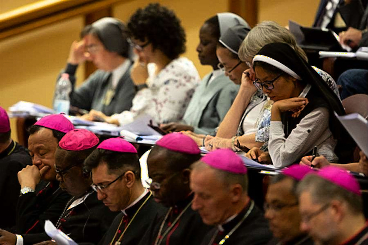
Oct 30, 2018 | Non categorizzato
 “It is often to the youngest that the Lord reveals better solutions.” These are words from Saint Benedict in his “Rule.” These were also the words chosen by Pope Francis when he announced the 15th Ordinary General Assembly of Bishops, on October 3-28 , which has just concluded. Preceded by a Preparatory Document (January 2017), a Questionnaire in several languges and by a Pre-Synodal Reunion (March 2018) with the participation of around three-hundred young people and several thousand others through social media, the Synod was the final step on a long and well organised walk. It was a walk of mutual listening, attentiveness, sharp and open dialogue ‘with’ and ‘about’ the new generations. Sixteen thousand responses arrived from Uganda alone. In line with previous Assemblies, the Synod had a common thread: renewal of the Church and society starting from their very foundations: the family and the youth who guarantee the future generations,” as Cardinal Lorenzo Baldisseri , Secretary General of the Synod of Bishops, explained during his inaugural press conference. “Youth doesn’t last a lifetime,” remarked Archbishop Rino Fisichella, president of the Pontifical Council for the Promotion of the New Evangelization. The period of youth comes to an end at a certain point. But what remains is having lived it intensely. The most important thing is to give meaning to the great gift of life that has been placed in our hands.”
“It is often to the youngest that the Lord reveals better solutions.” These are words from Saint Benedict in his “Rule.” These were also the words chosen by Pope Francis when he announced the 15th Ordinary General Assembly of Bishops, on October 3-28 , which has just concluded. Preceded by a Preparatory Document (January 2017), a Questionnaire in several languges and by a Pre-Synodal Reunion (March 2018) with the participation of around three-hundred young people and several thousand others through social media, the Synod was the final step on a long and well organised walk. It was a walk of mutual listening, attentiveness, sharp and open dialogue ‘with’ and ‘about’ the new generations. Sixteen thousand responses arrived from Uganda alone. In line with previous Assemblies, the Synod had a common thread: renewal of the Church and society starting from their very foundations: the family and the youth who guarantee the future generations,” as Cardinal Lorenzo Baldisseri , Secretary General of the Synod of Bishops, explained during his inaugural press conference. “Youth doesn’t last a lifetime,” remarked Archbishop Rino Fisichella, president of the Pontifical Council for the Promotion of the New Evangelization. The period of youth comes to an end at a certain point. But what remains is having lived it intensely. The most important thing is to give meaning to the great gift of life that has been placed in our hands.”  On Sunday, a solemn celebration and the publication of a Final Document concluded the Assembly. More than 150 bishops attended the Synod, two of whom came for the first time from continental China. There were 40 young people under the age of 30 attending as auditors. They were a significant presence, exuberant and at times noisy, always active on the digital channels with the publication of posts and selfies with the Pope and the other bishops, whom they met informally in the corridors, moments of recreation or in more official settings like the small discussion groups. They were always ready for a conversation or for offering their contribution of positive criticisms and concrete proposals. Without any fear of the high-sounding titles or silver hair, they took to heart the Pope’s invitation to: “cling to the bark of the Church which, even through impestuous storms in the world, continues to offer refuge and hospitality to all.” It’s worth the trouble, he had said, “to place ourselves in a position of listening towards each other.” “A Synod of very particular significance,” affirmed Cardinal Reinhard Marx, Archbishop of Muchen und Freising, president of the German Bishops Conference, during one of the many briefings with journalists, “a place of learning about the youth,” whom the Synod of bishops wanted to know in depth, thanks to the input of the ones they were directly interested in knowing about. The relationship between the virtual world and the real world, immigration, the role of school and universities, parish life and the formation of catechists, friendships and relationships, were just a few of the topics they dealt with. “They also talked about digital pastoral ministry, how the Church can find its place in the world of social communications,” explained Paolo Ruffini, Prefect of the Dicastery for Communication. “We have the same problems,” insisted Bishop Andrew Nkea Fuanya, Bishop of Mamfe, Cameroon, “but we face them from different points of view.” The churches in Cameroon are filled to the brim, but the youth are unhappy because of the many problems that spread across Africa. How are we to help them? We’re all in search of the same solution.” “A Synod on the youth with the youth,’ said Tadeusz Kondrusiewicz, Archbishop of Minsk-Mohilev and president of the Bishops Conference of Bielorussia, “which makes it particularly dynamic, because the young are never static.” “Vibrant was the surprise over the closeness of the topics that were faced, in the challenges of today’s Church even in the diversity of circumstances,” said Pastor Marco Fornerone from the Evangelical Church in Rome, who was attending as one of the 8 fraternal representatives. In the course of the Assembly, on October 6, a special meeting was held between the young people, the Pope and other bishops, against the backdrop of Paul VI Hall, titled “WE FOR – Unique, Supportive, Creative” There were three main topics: the search for identity, relationships and life as service and giving. There were also many life testimonies , studies, work and the difficulty of making decisions for the future. The program was interspersed with music and artistic pieces. In conclusion, at the end of the Synod, there was still one last gift from the Pope to the young auditors: a copy of Docat, a source of the church’s social teaching, Leo XIII’s “Rerum Novarum”, and all the writings of Pope Francis, including the most recent. The handbook has a question and answer format and focuses on the role of the human being in the Church and in the society. Chiara Favotti
On Sunday, a solemn celebration and the publication of a Final Document concluded the Assembly. More than 150 bishops attended the Synod, two of whom came for the first time from continental China. There were 40 young people under the age of 30 attending as auditors. They were a significant presence, exuberant and at times noisy, always active on the digital channels with the publication of posts and selfies with the Pope and the other bishops, whom they met informally in the corridors, moments of recreation or in more official settings like the small discussion groups. They were always ready for a conversation or for offering their contribution of positive criticisms and concrete proposals. Without any fear of the high-sounding titles or silver hair, they took to heart the Pope’s invitation to: “cling to the bark of the Church which, even through impestuous storms in the world, continues to offer refuge and hospitality to all.” It’s worth the trouble, he had said, “to place ourselves in a position of listening towards each other.” “A Synod of very particular significance,” affirmed Cardinal Reinhard Marx, Archbishop of Muchen und Freising, president of the German Bishops Conference, during one of the many briefings with journalists, “a place of learning about the youth,” whom the Synod of bishops wanted to know in depth, thanks to the input of the ones they were directly interested in knowing about. The relationship between the virtual world and the real world, immigration, the role of school and universities, parish life and the formation of catechists, friendships and relationships, were just a few of the topics they dealt with. “They also talked about digital pastoral ministry, how the Church can find its place in the world of social communications,” explained Paolo Ruffini, Prefect of the Dicastery for Communication. “We have the same problems,” insisted Bishop Andrew Nkea Fuanya, Bishop of Mamfe, Cameroon, “but we face them from different points of view.” The churches in Cameroon are filled to the brim, but the youth are unhappy because of the many problems that spread across Africa. How are we to help them? We’re all in search of the same solution.” “A Synod on the youth with the youth,’ said Tadeusz Kondrusiewicz, Archbishop of Minsk-Mohilev and president of the Bishops Conference of Bielorussia, “which makes it particularly dynamic, because the young are never static.” “Vibrant was the surprise over the closeness of the topics that were faced, in the challenges of today’s Church even in the diversity of circumstances,” said Pastor Marco Fornerone from the Evangelical Church in Rome, who was attending as one of the 8 fraternal representatives. In the course of the Assembly, on October 6, a special meeting was held between the young people, the Pope and other bishops, against the backdrop of Paul VI Hall, titled “WE FOR – Unique, Supportive, Creative” There were three main topics: the search for identity, relationships and life as service and giving. There were also many life testimonies , studies, work and the difficulty of making decisions for the future. The program was interspersed with music and artistic pieces. In conclusion, at the end of the Synod, there was still one last gift from the Pope to the young auditors: a copy of Docat, a source of the church’s social teaching, Leo XIII’s “Rerum Novarum”, and all the writings of Pope Francis, including the most recent. The handbook has a question and answer format and focuses on the role of the human being in the Church and in the society. Chiara Favotti
Letter from the Synod Fathers to Young People https://www.facebook.com/vaticannews/videos/298336587473577/
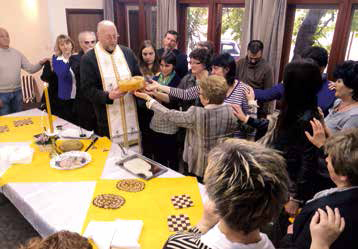
Oct 29, 2018 | Focolare Worldwide
 I am an internist and belong to the Russian-Orthodox church. As a person and believer, I was educated by my parish priest and the spirituality of Chiara Lubich. I was still very young when, through contact with the focolarine in Moscow, I felt the call to follow God in a radical way and I have been living in the focolare house of Belgrade (Serbia) for 7 years now. There is a particular and unique tradition in Serbia: the Slava feast, which the families celebrate on the day of that family’s patron saint; for the Serbs, the Slava is as ancient as Christianity itself. No Christian nation has this type of celebration, except the Orthodox Serbs. For a Serbian family the Slava comes after Easter and Christmas in terms of importance. The Orthodox-Christian missionaries who converted the Serbs to the Holy Orthodox faith, also Christianised their customs. Upon becoming Orthodox Christians, the Serbs accept the saint or saints of the day on which they are baptized. In Serbian culture, the Slava has always been a unique element throughout the history of the Serbian Orthodox people. Since the Serbs find themselves in a geographic region between the East and the West, and between different cultures, the Slava has become a feast identified with one’s own name and existence. It is celebrated by cities and even by military units also through cultural and social organisations. On that day, relatives, friends and acquaintances get together. The house is open to all. Our focolare is composed of Catholic focolarine from various countries and by me. For some time now we have felt the desire to make this beautiful tradition of the Serbian people our very own, and celebrate it together with our brothers and sisters. In the ecumenical spirit of the Focolare, our monk-friend, Fr. Djordje, helped us to choose our patron saint, and he suggested celebrating the holy “mironosice” women (the “women who went to the sepulchre with the herbs and spices”), and to whom the Orthodox Church dedicate an entire week starting from the second Sunday after Easter. So we have celebrated the Slava in the focolare for 4 years now. Many of our Orthodox friends were enthusiastic about our decision and helped us to prepare the things needed for the feast. Every year, for the Sunday of the holy women at the sepulchre, we welcome our friends of various churches, among whom are also our next-door neighbours, and some colleague, labourer or doctor. The highlight – the rite of slicing the Slava bread – is celebrated by our friend, Fr. Djordje, before the icon of the women at the sepulchre. We start with a devout prayer, accompanied by songs, and then, very moved and hand in hand, we pray according to the Slava feast tradition. Giving us the first benediction, Fr. Djordje pointed to the holy women of the sepulchre as models and protectors of the focolare, encouraging us to follow the example of the women, follow Jesus and become “like the salt that transforms society and its surroundings.” The rite is followed by the agape, with various culinary specialties in an atmosphere of joy and communion, as in a family. One of our acquaintances told us that he considered this step “a real enculturation that appreciates and makes the other’s culture one’s own: true Christianity.” Source: NU, new humanity, no. 231, p. 75.
I am an internist and belong to the Russian-Orthodox church. As a person and believer, I was educated by my parish priest and the spirituality of Chiara Lubich. I was still very young when, through contact with the focolarine in Moscow, I felt the call to follow God in a radical way and I have been living in the focolare house of Belgrade (Serbia) for 7 years now. There is a particular and unique tradition in Serbia: the Slava feast, which the families celebrate on the day of that family’s patron saint; for the Serbs, the Slava is as ancient as Christianity itself. No Christian nation has this type of celebration, except the Orthodox Serbs. For a Serbian family the Slava comes after Easter and Christmas in terms of importance. The Orthodox-Christian missionaries who converted the Serbs to the Holy Orthodox faith, also Christianised their customs. Upon becoming Orthodox Christians, the Serbs accept the saint or saints of the day on which they are baptized. In Serbian culture, the Slava has always been a unique element throughout the history of the Serbian Orthodox people. Since the Serbs find themselves in a geographic region between the East and the West, and between different cultures, the Slava has become a feast identified with one’s own name and existence. It is celebrated by cities and even by military units also through cultural and social organisations. On that day, relatives, friends and acquaintances get together. The house is open to all. Our focolare is composed of Catholic focolarine from various countries and by me. For some time now we have felt the desire to make this beautiful tradition of the Serbian people our very own, and celebrate it together with our brothers and sisters. In the ecumenical spirit of the Focolare, our monk-friend, Fr. Djordje, helped us to choose our patron saint, and he suggested celebrating the holy “mironosice” women (the “women who went to the sepulchre with the herbs and spices”), and to whom the Orthodox Church dedicate an entire week starting from the second Sunday after Easter. So we have celebrated the Slava in the focolare for 4 years now. Many of our Orthodox friends were enthusiastic about our decision and helped us to prepare the things needed for the feast. Every year, for the Sunday of the holy women at the sepulchre, we welcome our friends of various churches, among whom are also our next-door neighbours, and some colleague, labourer or doctor. The highlight – the rite of slicing the Slava bread – is celebrated by our friend, Fr. Djordje, before the icon of the women at the sepulchre. We start with a devout prayer, accompanied by songs, and then, very moved and hand in hand, we pray according to the Slava feast tradition. Giving us the first benediction, Fr. Djordje pointed to the holy women of the sepulchre as models and protectors of the focolare, encouraging us to follow the example of the women, follow Jesus and become “like the salt that transforms society and its surroundings.” The rite is followed by the agape, with various culinary specialties in an atmosphere of joy and communion, as in a family. One of our acquaintances told us that he considered this step “a real enculturation that appreciates and makes the other’s culture one’s own: true Christianity.” Source: NU, new humanity, no. 231, p. 75.
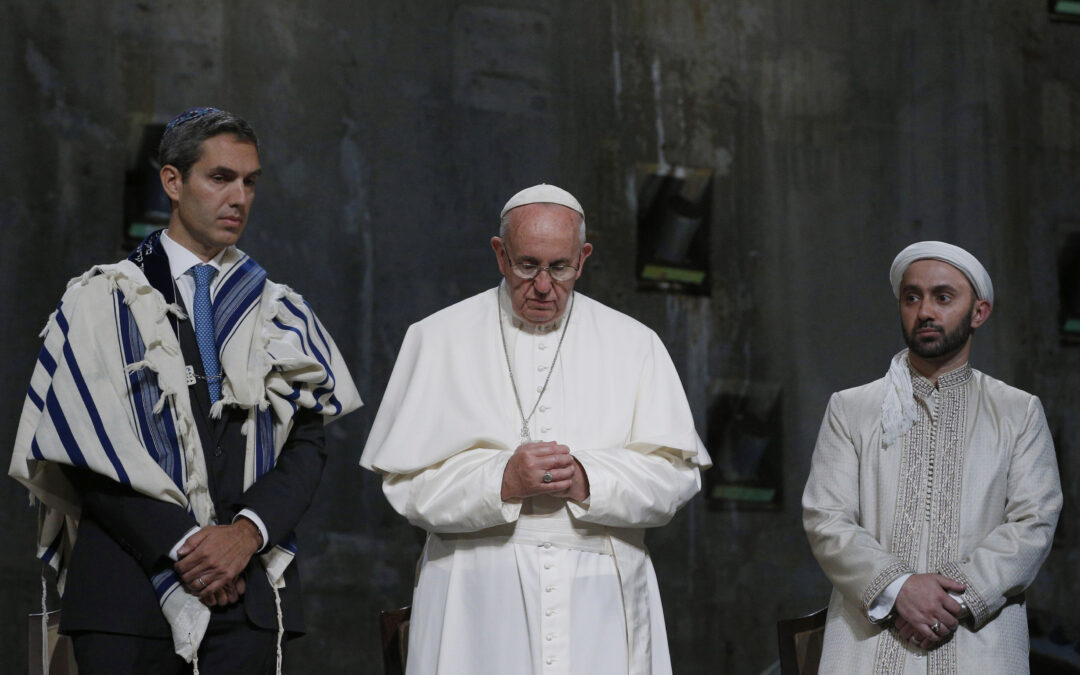
Oct 28, 2018 | Non categorizzato
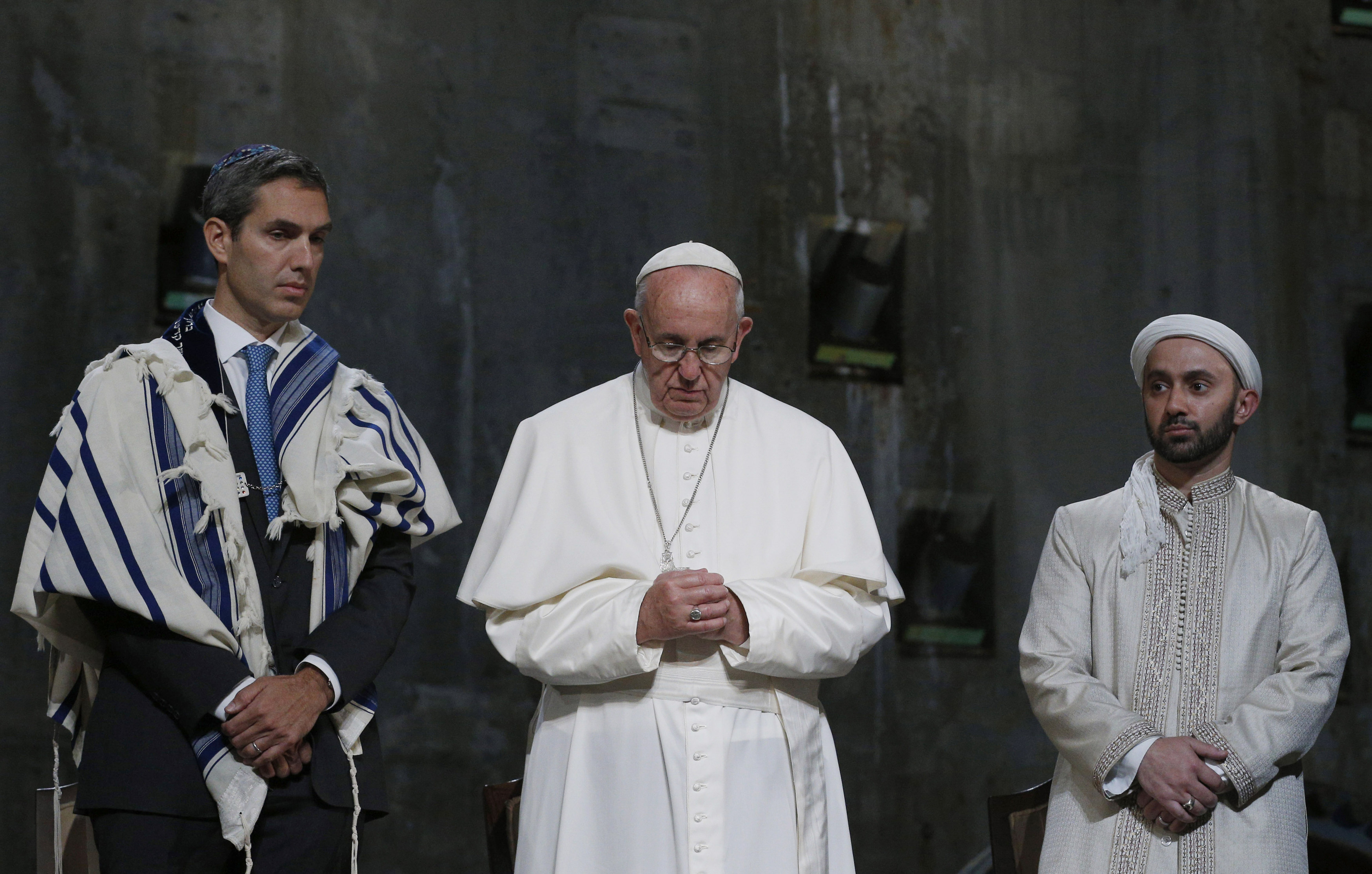 53 years have passed since, Pope Paul VI, 28 October 1965, signed the first historical “Declaration on the Relation of the Church to non-Christian religions,” known as Nostra Aetate (in our time). The Declaration affirms that “The Catholic Church rejects nothing of what is true and holy in these religions. She has a high regard for the manner of life and conduct, the precepts and doctrines, which, although differing in many ways from her own teaching, nevertheless often reflect a ray of that truth which enlightens all men.” But it also underlines that the Church “is duty bound to announce without fail that Christ is the “way, the truth and the life” (Jn 14,6), in him whom God reconciled all things to himself, men find the fullness of their religious life.” The Declaration urges all Christians “to enter with prudence and charity into discussion and collaboration with the members of other religions, while witnessing to their own faith and way of life, and acknowledge, preserve and encourage the spiritual and moral truths found among non-Christians and also their social life and culture.” Read the entire text
53 years have passed since, Pope Paul VI, 28 October 1965, signed the first historical “Declaration on the Relation of the Church to non-Christian religions,” known as Nostra Aetate (in our time). The Declaration affirms that “The Catholic Church rejects nothing of what is true and holy in these religions. She has a high regard for the manner of life and conduct, the precepts and doctrines, which, although differing in many ways from her own teaching, nevertheless often reflect a ray of that truth which enlightens all men.” But it also underlines that the Church “is duty bound to announce without fail that Christ is the “way, the truth and the life” (Jn 14,6), in him whom God reconciled all things to himself, men find the fullness of their religious life.” The Declaration urges all Christians “to enter with prudence and charity into discussion and collaboration with the members of other religions, while witnessing to their own faith and way of life, and acknowledge, preserve and encourage the spiritual and moral truths found among non-Christians and also their social life and culture.” Read the entire text
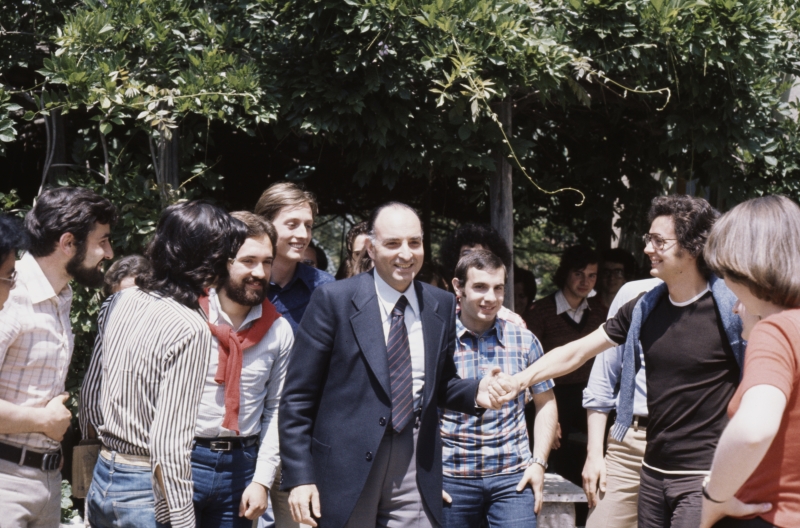
Oct 26, 2018 | Non categorizzato

Archival photo: Pasquale Foresi with the young people of the Focolare Movement.
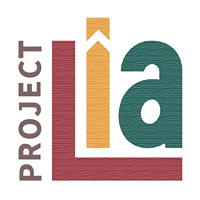
Oct 25, 2018 | Focolare Worldwide
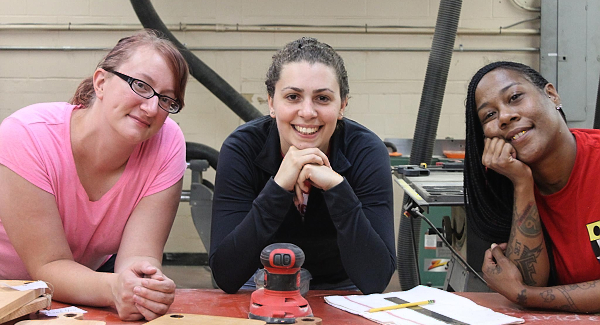 “During the summer months I attended the business programme of the network of businesses that belong to the Economy of Communion in the United States. So, in addition to the two-year course in Economics and Management that I was taking at the Sophia University Institute in the international town of Loppiano, Italy, I found myself in Indiana during the months of July and August. I only expected it to be an experience of scientific research. Instead, I found myself immersed in a series of activities, but also in the midst of a compelling personal adventure. (A reminder for the next times: How necessary it is to disarm ourselves of any expectations in order to embrace the full depth of every experience!) The internship for young people is held at Mundell & Associates Inc headquartered in Indianapolis, USA. But this year was something more: The interns could spend time and share their professional skills inside Project Lia, which is another EoC business that is developed along two tracks: social impact and environmental impact. It was really an extra bonus to be able to draw closer to this business sector as well.
“During the summer months I attended the business programme of the network of businesses that belong to the Economy of Communion in the United States. So, in addition to the two-year course in Economics and Management that I was taking at the Sophia University Institute in the international town of Loppiano, Italy, I found myself in Indiana during the months of July and August. I only expected it to be an experience of scientific research. Instead, I found myself immersed in a series of activities, but also in the midst of a compelling personal adventure. (A reminder for the next times: How necessary it is to disarm ourselves of any expectations in order to embrace the full depth of every experience!) The internship for young people is held at Mundell & Associates Inc headquartered in Indianapolis, USA. But this year was something more: The interns could spend time and share their professional skills inside Project Lia, which is another EoC business that is developed along two tracks: social impact and environmental impact. It was really an extra bonus to be able to draw closer to this business sector as well. 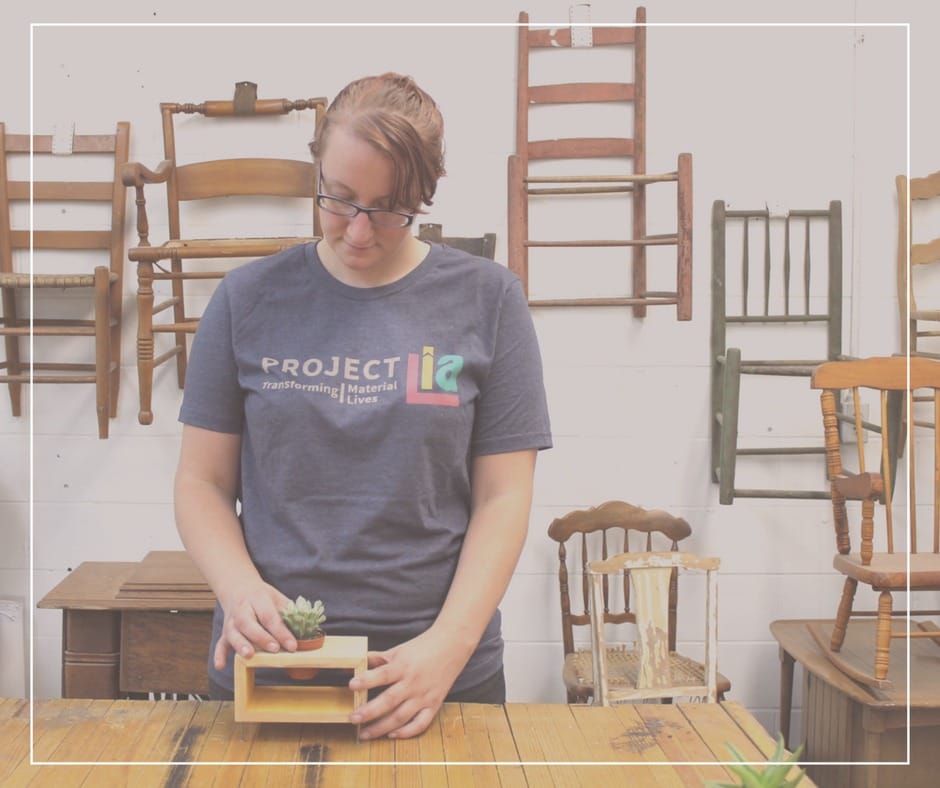 I’d like to share a couple of thoughts. First of all, I think that one of the most important things about studying, observing, practicing and promoting the EoC is the will to collaborate. In order to enter into the relational dynamic of this proposal, it is necessary to open one’s heart, mind and eyes to those small details that make each day something extraordinary: mutual encouragement and a welcoming smile, recognizing the value and the humanity of the other person, the personal encounter with people you never knew before, the ability to wonder, striving for a balance among the different aspects of life, the decision to appreciate every learning opportunity, to assimilate new information, to recognize and support the change that is taking place, to take part in the transformation of obsolete concepts. EoC is an economic proposal that is different from the others, because it is managed by a diverse group of people. It’s not the model in itself, but the people that constitute the center of all the action.
I’d like to share a couple of thoughts. First of all, I think that one of the most important things about studying, observing, practicing and promoting the EoC is the will to collaborate. In order to enter into the relational dynamic of this proposal, it is necessary to open one’s heart, mind and eyes to those small details that make each day something extraordinary: mutual encouragement and a welcoming smile, recognizing the value and the humanity of the other person, the personal encounter with people you never knew before, the ability to wonder, striving for a balance among the different aspects of life, the decision to appreciate every learning opportunity, to assimilate new information, to recognize and support the change that is taking place, to take part in the transformation of obsolete concepts. EoC is an economic proposal that is different from the others, because it is managed by a diverse group of people. It’s not the model in itself, but the people that constitute the center of all the action.  At the conclusion, when I was getting ready to leave I asked myself: How will I describe this experience? The internship was very demanding: the encounter with Project Lia, an innovative business experience, had given me so much. Among other things, working so closely with Elizabeth Wallin, who had begun the project, I saw myself in the future being able to face and overcome challenges and difficult moments. I so much appreciate the time that I had to learn her story: it permitted me to understand business, but also to enter into contact with what is the essence of a business that serves a social purpose. I saw that launching a start-up is quite an enriching process. It’s no secret that doing business is an ongoing Discovery of new things, a real battle. Watching Elizabeth, day after day, I admire her capacity to navigate in a sea of changes. Giving one’s life for a business is an activity that is born from intelligence, but also heart. To launch a project of the EoC society, you need to be able to step out of your comfort zone and encounter the others, just as they are. Patience is needed, humility and flexibility. When this path opens for me too, I’ll be a little closer to what I really am.” Source: Sophia University Institute sophiauniversity.org See also: Project Lia: Transforming Lives
At the conclusion, when I was getting ready to leave I asked myself: How will I describe this experience? The internship was very demanding: the encounter with Project Lia, an innovative business experience, had given me so much. Among other things, working so closely with Elizabeth Wallin, who had begun the project, I saw myself in the future being able to face and overcome challenges and difficult moments. I so much appreciate the time that I had to learn her story: it permitted me to understand business, but also to enter into contact with what is the essence of a business that serves a social purpose. I saw that launching a start-up is quite an enriching process. It’s no secret that doing business is an ongoing Discovery of new things, a real battle. Watching Elizabeth, day after day, I admire her capacity to navigate in a sea of changes. Giving one’s life for a business is an activity that is born from intelligence, but also heart. To launch a project of the EoC society, you need to be able to step out of your comfort zone and encounter the others, just as they are. Patience is needed, humility and flexibility. When this path opens for me too, I’ll be a little closer to what I really am.” Source: Sophia University Institute sophiauniversity.org See also: Project Lia: Transforming Lives
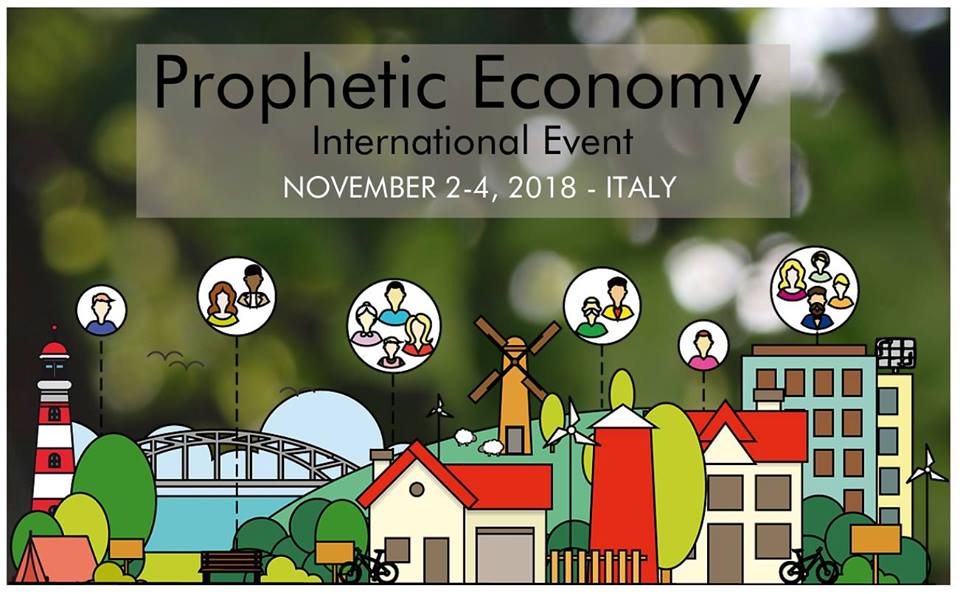
Oct 24, 2018 | Focolare Worldwide
 On November 2-4 the International Prophetic Economy event will be held in Castel Gandolfo, Italy. It is being organized by several international movements and institutions whose goal is to create new paths of collaboration among change-makers (individuals as well as private and public organizations) from around the globe. These are change-makers who utilise sustainable solutions for social and environmental problems, work and become engaged in new creative forms of “prophetic” economy that favor the human person, especially the most needy. “Our world,” they claim, “faces an ecological and social crisis. Climate change and growing inequality are nourished by unjust political structures and short-term aid, along with obsolete policies and procedures. Many people around the world believe passionately in human development and in sustainable development that can change the rules and require justice. It’s time to put ourselves together and be more than the sum of our parts. The event was preceded by an award contest, the Prophetic Practices Award 2018, which 135 change-makers held in 35 countries. The experiences of the finalists, chosen by an international jury of experts (Vandana Shiva, Jeff Sachs, Cristina Calvo and Stefano Zamagni), will be presented live during the event in November. See: Prophetic Economy website
On November 2-4 the International Prophetic Economy event will be held in Castel Gandolfo, Italy. It is being organized by several international movements and institutions whose goal is to create new paths of collaboration among change-makers (individuals as well as private and public organizations) from around the globe. These are change-makers who utilise sustainable solutions for social and environmental problems, work and become engaged in new creative forms of “prophetic” economy that favor the human person, especially the most needy. “Our world,” they claim, “faces an ecological and social crisis. Climate change and growing inequality are nourished by unjust political structures and short-term aid, along with obsolete policies and procedures. Many people around the world believe passionately in human development and in sustainable development that can change the rules and require justice. It’s time to put ourselves together and be more than the sum of our parts. The event was preceded by an award contest, the Prophetic Practices Award 2018, which 135 change-makers held in 35 countries. The experiences of the finalists, chosen by an international jury of experts (Vandana Shiva, Jeff Sachs, Cristina Calvo and Stefano Zamagni), will be presented live during the event in November. See: Prophetic Economy website
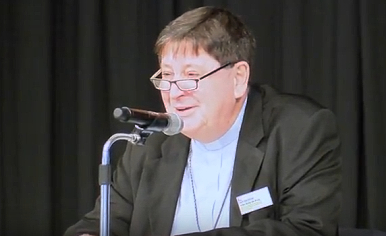
Oct 24, 2018 | Focolare Worldwide
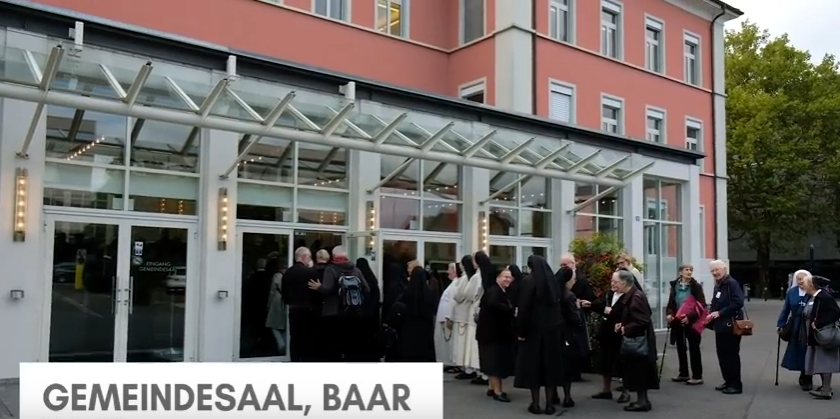 In the heart of Europe with its 7.8 million inhabitants within a territory of 41 thousand km, Switzerland is a small country with a broad variety of languages, cultures and religions which has also been held up as a model of successful integration. The spirituality of unity, which is particularly congenial to a social fabric oriented towards relationships and acceptance spread rapidly in this land ever since 1960 and caught on quickly. Many successive spiritual intutions regarding the development of Focolare spirituality are linked to the summer holidays Chiara Lubich spent in the Swiss valleys. A centre of formation has been operating in Baar since 1975. It is open to all and has become, over time, the heart of the Focolare town of “Eckstein” (cornerstone) where several small businesses operate. The centre offers opportunities for contact and encounter not only among Catholic and Reformed Christians.
In the heart of Europe with its 7.8 million inhabitants within a territory of 41 thousand km, Switzerland is a small country with a broad variety of languages, cultures and religions which has also been held up as a model of successful integration. The spirituality of unity, which is particularly congenial to a social fabric oriented towards relationships and acceptance spread rapidly in this land ever since 1960 and caught on quickly. Many successive spiritual intutions regarding the development of Focolare spirituality are linked to the summer holidays Chiara Lubich spent in the Swiss valleys. A centre of formation has been operating in Baar since 1975. It is open to all and has become, over time, the heart of the Focolare town of “Eckstein” (cornerstone) where several small businesses operate. The centre offers opportunities for contact and encounter not only among Catholic and Reformed Christians. 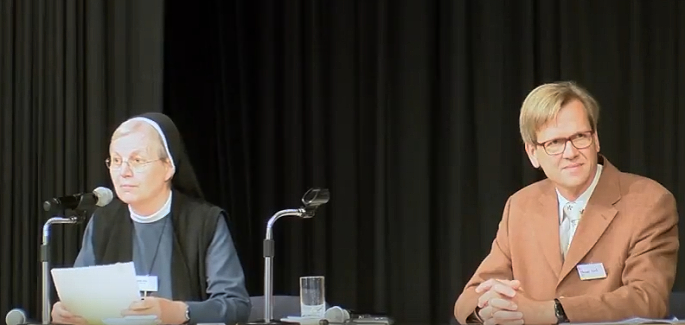 At the end of September a meeting was held for around 400 men and women Religious, first at City Hall which is not far from the Centre. The group was restricted to superiors and persons in positions of responsibility, with the behind the scenes assistance of Focolare members. The participants were members of eighty communities, including a dozen from the Reformed Church and an Orthodox community, as well as members of Secular Institutes, Movements and Ecclesial Families.
At the end of September a meeting was held for around 400 men and women Religious, first at City Hall which is not far from the Centre. The group was restricted to superiors and persons in positions of responsibility, with the behind the scenes assistance of Focolare members. The participants were members of eighty communities, including a dozen from the Reformed Church and an Orthodox community, as well as members of Secular Institutes, Movements and Ecclesial Families.  “In today’s world we have to help each other to stand together, to not look at the barriers between us, not our differences that must nevertheless be preserved. But we have to do in such a way that all our differences shine in one grand experience, in the footsteps of Christ and of our founders.” These were the words of Cardinal Joâo Braz de Aviz, who attended the meeting. In one interview, the Prefect of the Congregation for the Consecrated Life explained: “All the structures that form the Church – Religious, Hermits, Monks, Nuns, Brothers, Sisters, Secular Institutes – all of them are seeking a common life. In today’s culture everything has drawn closer together.” “At this moment in time,” he explained, “we are in need of a path that we can take together and, even we who belong to Orders, Congregations and Consecrated Life, need a tool, a way of life that draws us together in all ways. This is not the path we took at first, that of an individual spirituality, that is preserved. We need to move on to ‘looking’ together, to looking at the other with the same attentiveness with which we look at ourselves. All of this we are just beginning to learn, including us cardinals…” He concluded: “I wish that all of us, in this moment, would sum up all of our beauties and form one grand unity, remembering what Pope Francis says: “Unity is not built [by] destroying, but harmonizing the diversity.” It’s a path that at times causes fatigue, because we have to learn to go out towards the others, “the first move we have to make is to go towards the other,” as the Pope points out. If we don’t go out of ourselves, we remain at the centre. This is beginning here in Switzerland, with simplicity, as if we were all at the School of Mary.”
“In today’s world we have to help each other to stand together, to not look at the barriers between us, not our differences that must nevertheless be preserved. But we have to do in such a way that all our differences shine in one grand experience, in the footsteps of Christ and of our founders.” These were the words of Cardinal Joâo Braz de Aviz, who attended the meeting. In one interview, the Prefect of the Congregation for the Consecrated Life explained: “All the structures that form the Church – Religious, Hermits, Monks, Nuns, Brothers, Sisters, Secular Institutes – all of them are seeking a common life. In today’s culture everything has drawn closer together.” “At this moment in time,” he explained, “we are in need of a path that we can take together and, even we who belong to Orders, Congregations and Consecrated Life, need a tool, a way of life that draws us together in all ways. This is not the path we took at first, that of an individual spirituality, that is preserved. We need to move on to ‘looking’ together, to looking at the other with the same attentiveness with which we look at ourselves. All of this we are just beginning to learn, including us cardinals…” He concluded: “I wish that all of us, in this moment, would sum up all of our beauties and form one grand unity, remembering what Pope Francis says: “Unity is not built [by] destroying, but harmonizing the diversity.” It’s a path that at times causes fatigue, because we have to learn to go out towards the others, “the first move we have to make is to go towards the other,” as the Pope points out. If we don’t go out of ourselves, we remain at the centre. This is beginning here in Switzerland, with simplicity, as if we were all at the School of Mary.”
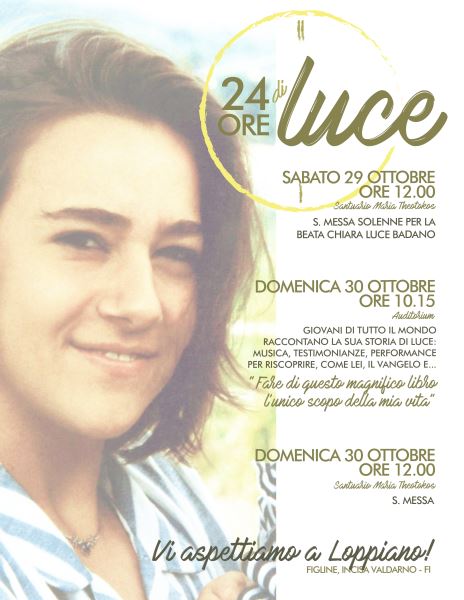
Oct 23, 2018 | Focolare Worldwide
 At the Focolare’s international town of Loppiano, “24 Hours of Light” returns on October 27-28, dedicated to Chiara Luce Badano. The event will offer two days of prayer, performances, testimonies and music about the life of Blessed Chiara Luce Badano who died of osteosarcoma at the age of 18. She is one of the young witnesses at the Synod on Youth and, together with her, this years protagonist is the Gospel that the Blessed Chiara Luce described as “her only scope in life.” The event is open to all and will begin on Saturday, October 27 with Holy Mass at noon in the Mary Theotokos Shrine of Loppiano. “24 Hours of Light” is promoted by the Focolare youth living in Loppiano and attending the Gen School formation centre for young people from around the world.
At the Focolare’s international town of Loppiano, “24 Hours of Light” returns on October 27-28, dedicated to Chiara Luce Badano. The event will offer two days of prayer, performances, testimonies and music about the life of Blessed Chiara Luce Badano who died of osteosarcoma at the age of 18. She is one of the young witnesses at the Synod on Youth and, together with her, this years protagonist is the Gospel that the Blessed Chiara Luce described as “her only scope in life.” The event is open to all and will begin on Saturday, October 27 with Holy Mass at noon in the Mary Theotokos Shrine of Loppiano. “24 Hours of Light” is promoted by the Focolare youth living in Loppiano and attending the Gen School formation centre for young people from around the world.
Oct 23, 2018 | Non categorizzato
The joy of service When our son died after the treatment he received was ineffective, my wife began to suffer from depression. She found visits from other children unbearable and, gradually, we became very isolated to the extent that life didn’t have meaning anymore. One day we got to know a community that tried to put the words of the Gospel into practice. There was one Gospel sentence that made a big impact on her and changed her life. It was, “There is more joy in giving than receiving.” After reflecting for a while, she went back to work as an assistant in a centre for children suffering from cancer. From then onwards, she recovered very quickly. One day she told me about the joy she had found in serving other children. R.A. France The shoe rack Poor health forced me to stay at home for a few weeks. I wanted to do something and so I decided to make a shoe rack but I made such a bad job of – it had so many defects – that I was quite depressed with the result. My wife and children, however, kept saying that it was wonderful and praising me. That made me think that maybe it wasn’t as terrible as it seemed to me and so I began to make other things that would be useful around the house. When I returned to work, I was really happy to see my colleagues again. I think love made me well. S.V. Czech Republic The new car Our old car wasn’t worth repairing but we couldn’t afford another one. We have a daughter who suffers from autism and can’t use public transport or walk very far. With great faith we prayed for a solution believing that God had already answered us. Soon afterwards, some friends in the parish told us about a car they had found: it was second hand but in perfect condition. Once again, God helped us. R.C. Great Britain No keys On account of poverty and unemployment, many people on our island resort to stealing and burglary. One evening, Nanou wanted to go to a meeting in the parish while her parents were out. She didn’t have keys to lock the door and so she pushed it shut with a brick and asked Jesus to keep the house safe. When she was coming back she met her parents who were also making their way home. Her father was furious when he found the door unlocked but he couldn’t match her faith and trust in Jesus. What’s more, nothing had happened. D.R. Madagascar I am free to love I didn’t take much notice of the early symptoms. My voice sounded lower, I had backache, difficulty in swallowing, I had poor balance and fell over, I had problems with my nose. Then, on June 13 2016, in Bologna, I received the diagnosis: amyotrophic lateral sclerosis – ALS. There were just the initials written on a tiny piece of paper. For several days, the words of Saint Paul kept coming into my mind; “We are afflicted in every way but not crushed, perplexed but not driven to despair.” I kept looking at that piece of paper. The initials reminded me of the Italian words which say “I am free to love.” When my muscles won’t work, when I can’t smell anything, when my senses of touch and taste have disappeared, I can still love. If you can transform suffering into a gift of love, then life smiles back at you. We are not made for defeat. F.S. Italy
Oct 22, 2018 | Focolare Worldwide
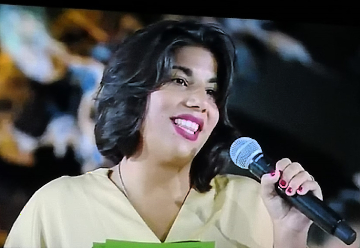
Oct 21, 2018 | Focolare Worldwide
 Ana is 19 and lives in Spain. She started to talk while she walked onto the stage of the Paul VI Hall. “In order to better know about the socio-sanitary sector, last March I went to a hospital in my city,” she recounted. In the hospital she was received by a social worker who, instead of many words, lent her a gown, put a case sheet in her hand, and accompanied her to the room of a patient: “When I entered and saw him, a shiver ran down my spine. I had to leave for a second to take a deep breath.” On the bed lay a boy, just a bit older than her, a terminal cancer patient. Ana took courage and returned to the room: «How are you?» He looked her with surprise, and asked her to repeat the question. “The first thing I did was to present myself – then he said – I have been here for two months now. I have bone cancer and I don’t have much time to live and I feel that I am losing everything: the family, my job, my girlfriend. My life no longer has a meaning.” Ana was in a state of shock. A million emotions and thoughts passed through her heart and mind. However, she tried to start a conversation by telling him about herself and her life. After a few minutes of silence the boy asked: “Do you believe in God?” Once again Ana was taken aback but answered with a big “yes.” “I instead, say no, since he has abandoned me – he added – because in just a few month he will take my life. He has really left me alone.” The young Andalusian girl entrusted herself to God before answering: “What you feel now has a name, it is ‘Jesus Forsaken.’ God has not abandoned you and he continues to stand by you more than ever. He is putting you to the test and with what you are undergoing is asking you a question which you still may not have answered: “Can you follow me also in the greatest suffering?” He has chosen this cross for you and for you alone, for a reason, because he wants you to bear witness to his love. He wants to make you a saint. You can become a saint if you accept and receive this suffering, and if you take it as something that comes from God and not as something you own. Then, without second thoughts, start loving the people around you, your parents, your girlfriend, your friends, making them see that you do not fear death because you have found something precious that helps you to live moment by moment, without thinking of what you will be tomorrow.” “Through the social worker I found out a few days after my visit, that his health had worsened, Ana recounted – and that he asked to receive the sacrament of the sick, to be able to go in peace. After some time, I received this letter…” On the stage of the Paul VI Hall, a young actor reads out Hugo’s letter: “Hi Ana, let me tell you something about myself. These have been difficult days since the cancer has advanced much faster. I felt more tired and weak, but those were the occasions in which I had to love more. These have been hard days since I saw that death was coming closer and it scared me a bit. But when this happened, I remembered that it is not death that beckons, but God: he was calling me to be with Him in Heaven, and this gave me the strength to smile, to love. I have now very little time left down here, Ana, but I must tell you that now I am not afraid because I know that I shall be fine up there. Thank you for pulling me out of that deep hole, for listening to me, but above all, thanks for having brought a new God into my life. I want you now to live for both of us, enjoy for both of us, and fulfill all your dreams. I shall always be beside you, and from Heaven, I will take care of you every day, I shall be like your little guardian angel. I gave the social worker a cross which she will give you on my behalf. I have always worn it since my first Communion, but I want you to have it so that when you look at it, you will remember that this is the Cross that God wished for you and has to be borne with joy and love always. I shall await you in Paradise, Ana.” Tamara Pastorelli Source: www.cittanuova.it
Ana is 19 and lives in Spain. She started to talk while she walked onto the stage of the Paul VI Hall. “In order to better know about the socio-sanitary sector, last March I went to a hospital in my city,” she recounted. In the hospital she was received by a social worker who, instead of many words, lent her a gown, put a case sheet in her hand, and accompanied her to the room of a patient: “When I entered and saw him, a shiver ran down my spine. I had to leave for a second to take a deep breath.” On the bed lay a boy, just a bit older than her, a terminal cancer patient. Ana took courage and returned to the room: «How are you?» He looked her with surprise, and asked her to repeat the question. “The first thing I did was to present myself – then he said – I have been here for two months now. I have bone cancer and I don’t have much time to live and I feel that I am losing everything: the family, my job, my girlfriend. My life no longer has a meaning.” Ana was in a state of shock. A million emotions and thoughts passed through her heart and mind. However, she tried to start a conversation by telling him about herself and her life. After a few minutes of silence the boy asked: “Do you believe in God?” Once again Ana was taken aback but answered with a big “yes.” “I instead, say no, since he has abandoned me – he added – because in just a few month he will take my life. He has really left me alone.” The young Andalusian girl entrusted herself to God before answering: “What you feel now has a name, it is ‘Jesus Forsaken.’ God has not abandoned you and he continues to stand by you more than ever. He is putting you to the test and with what you are undergoing is asking you a question which you still may not have answered: “Can you follow me also in the greatest suffering?” He has chosen this cross for you and for you alone, for a reason, because he wants you to bear witness to his love. He wants to make you a saint. You can become a saint if you accept and receive this suffering, and if you take it as something that comes from God and not as something you own. Then, without second thoughts, start loving the people around you, your parents, your girlfriend, your friends, making them see that you do not fear death because you have found something precious that helps you to live moment by moment, without thinking of what you will be tomorrow.” “Through the social worker I found out a few days after my visit, that his health had worsened, Ana recounted – and that he asked to receive the sacrament of the sick, to be able to go in peace. After some time, I received this letter…” On the stage of the Paul VI Hall, a young actor reads out Hugo’s letter: “Hi Ana, let me tell you something about myself. These have been difficult days since the cancer has advanced much faster. I felt more tired and weak, but those were the occasions in which I had to love more. These have been hard days since I saw that death was coming closer and it scared me a bit. But when this happened, I remembered that it is not death that beckons, but God: he was calling me to be with Him in Heaven, and this gave me the strength to smile, to love. I have now very little time left down here, Ana, but I must tell you that now I am not afraid because I know that I shall be fine up there. Thank you for pulling me out of that deep hole, for listening to me, but above all, thanks for having brought a new God into my life. I want you now to live for both of us, enjoy for both of us, and fulfill all your dreams. I shall always be beside you, and from Heaven, I will take care of you every day, I shall be like your little guardian angel. I gave the social worker a cross which she will give you on my behalf. I have always worn it since my first Communion, but I want you to have it so that when you look at it, you will remember that this is the Cross that God wished for you and has to be borne with joy and love always. I shall await you in Paradise, Ana.” Tamara Pastorelli Source: www.cittanuova.it
Oct 20, 2018 | Non categorizzato
If we are united, Jesus is among us. And this has value. It is worth more than any other treasure that our heart may possess; more than mother, father, brothers, sisters and children. It is worth more than our house, our work, or our property; more than the works of art in a great city like Rome; more than our business deals; more than nature which surrounds us with flowers and fields, the sea and the stars; more than our own soul. It is He who, inspiring his saints with his eternal truths, leaves his mark upon every age. This too is His hour. Not so much the hour of a saint but of Him, of Him among us, of Him living in us as we build up — in the unity of love — his Mystical Body and the Christian community. But we must expand Christ, make him grow in other members, become bearers of Fire like Him, (that dissolves the human side of us into the divine which is Charity lived out). Make one of all and in all the One. It is then that we live the life that He gives us, moment by moment, in charity. The basic commandment is brotherly love (see 1Pt 4:8). Everything is of value if it expresses sincere fraternal charity. Nothing we do is of value if there is no feeling of love for our brothers and sisters in it. For God is a Father and in his heart he has always and only his children. Source: Centro Chiara Lubich

Oct 20, 2018 | Non categorizzato
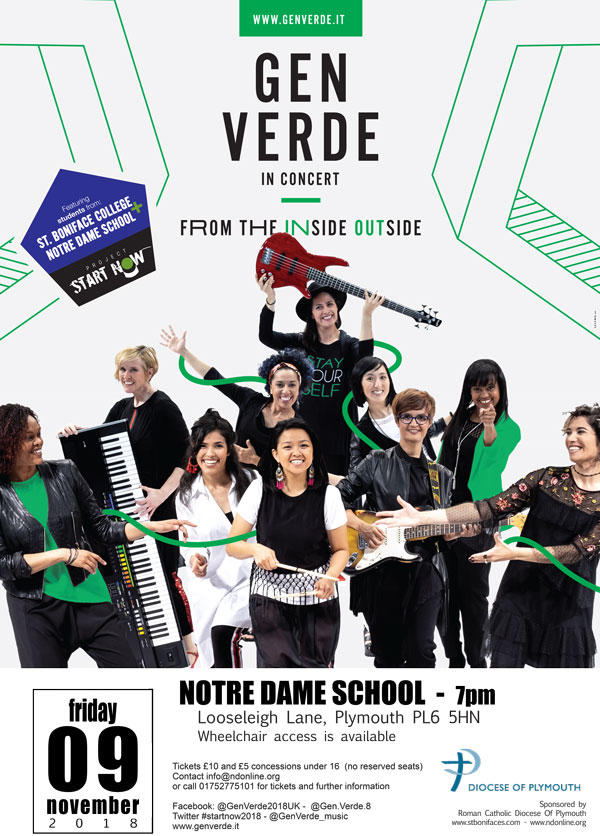 Dates: Plymouth:
Dates: Plymouth:
6-7-8 November: Workshop with young people 9: Concert 10: Feedback with young people
Welwyn Garden City:
16-17-18 November: workshop with young people
Birmingham: 20, 21 and 22 November: workshop with young people November 23rd: concert November 24rd: Feedback GenVerde Tours
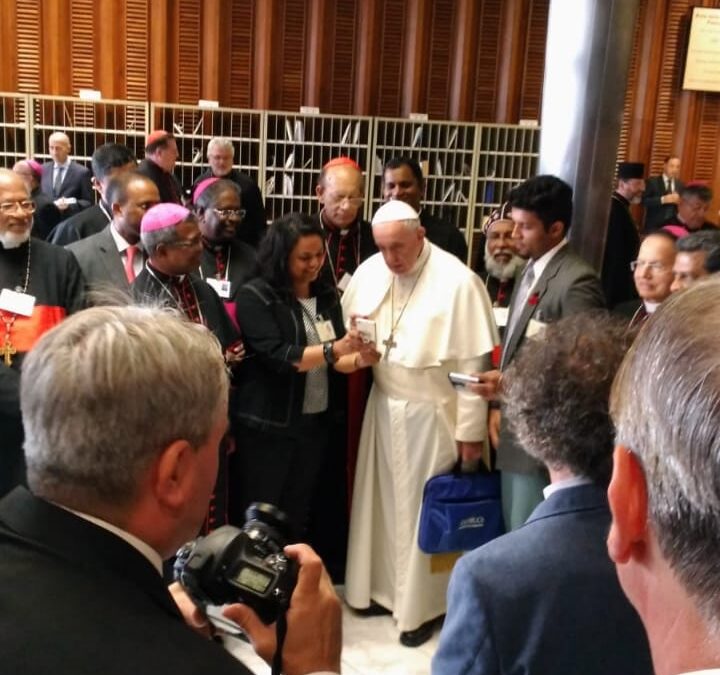
Oct 19, 2018 | Focolare Worldwide
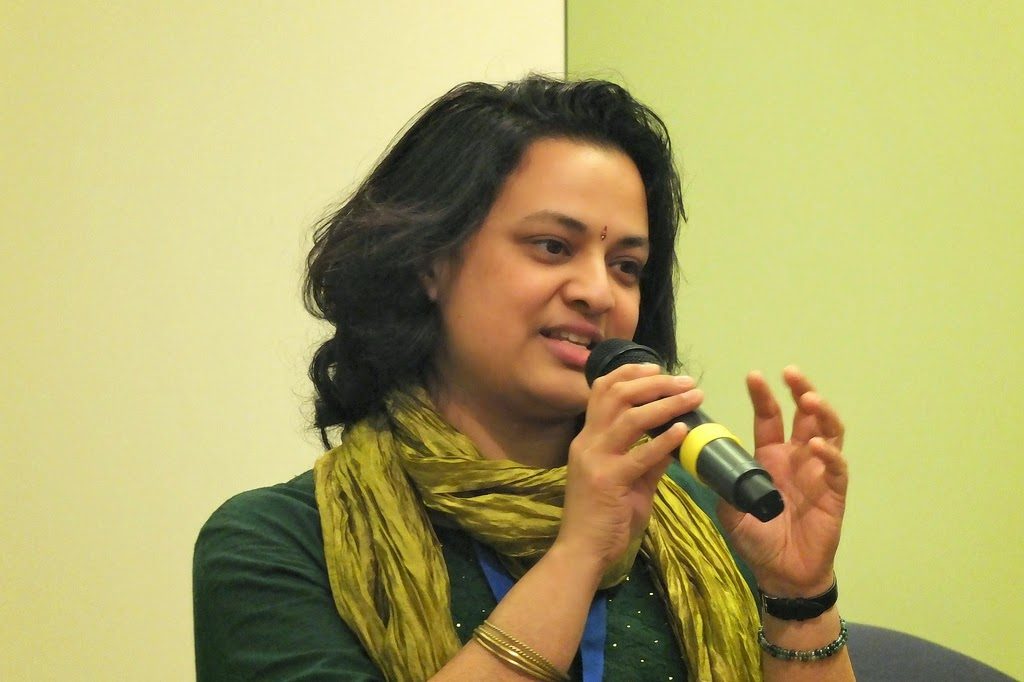 Cherylanne (Doni) Menezes is from Mumbai. She is part of the delegation of 11 members representing India at the Synod on Youth, underway in Rome up to 28 October. Raised in a family that is very active in the district parish, and within the context of a multi-religious community, after her studies in economy and business Cherylanne started to work in the field of management. But her broad range of interests led her to acquire a Master’s at the Sophia University in Loppiano, Italy, where she wrote a thesis on Hindu-Christian dialogue in the Focolare Movement, where still today she is committed with the young people of her country. I met her during a break during the synodal works. The Indian delegation is headed by Cardinal Oswald Gracias, Archbishop of Mumbai, and is composed of 9 bishops (of the Latin, Syro- Malabar and Syro-Malankar churches) and another lay person, Percival, President of the Indian Catholic Youth Movement. Cherylanne is attending the Synod as a representative of the Focolare Movement in India. She has met Pope Francis twice, together with the delegation. The first was at the start of the works (“Also the Hindu youths of the Focolare Movement are praying for you and for this event,” she said to the Pope, who reacted with a happy exclamation) and the second when the Synod had already started.
Cherylanne (Doni) Menezes is from Mumbai. She is part of the delegation of 11 members representing India at the Synod on Youth, underway in Rome up to 28 October. Raised in a family that is very active in the district parish, and within the context of a multi-religious community, after her studies in economy and business Cherylanne started to work in the field of management. But her broad range of interests led her to acquire a Master’s at the Sophia University in Loppiano, Italy, where she wrote a thesis on Hindu-Christian dialogue in the Focolare Movement, where still today she is committed with the young people of her country. I met her during a break during the synodal works. The Indian delegation is headed by Cardinal Oswald Gracias, Archbishop of Mumbai, and is composed of 9 bishops (of the Latin, Syro- Malabar and Syro-Malankar churches) and another lay person, Percival, President of the Indian Catholic Youth Movement. Cherylanne is attending the Synod as a representative of the Focolare Movement in India. She has met Pope Francis twice, together with the delegation. The first was at the start of the works (“Also the Hindu youths of the Focolare Movement are praying for you and for this event,” she said to the Pope, who reacted with a happy exclamation) and the second when the Synod had already started. 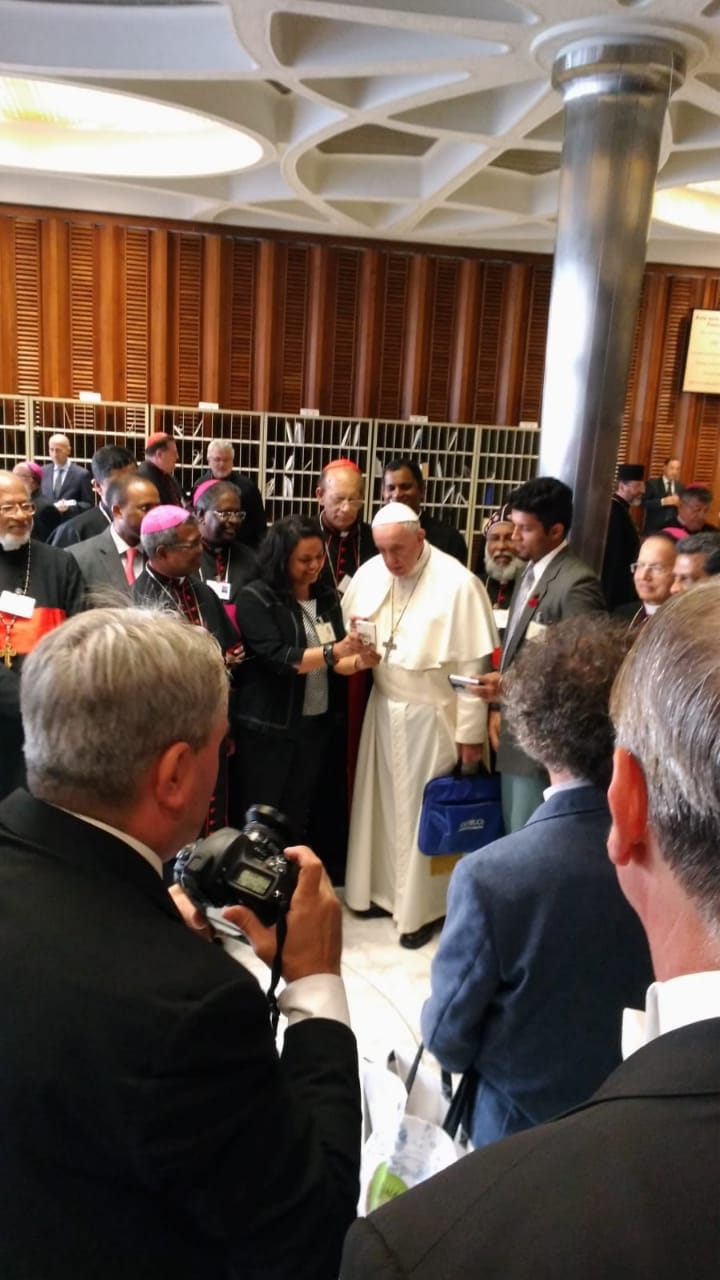 The new appointment was for 17 October. The delegation arrived on time, at the entrance of Aula Nervi, at 4 p.m., together with that of South America. The afternoon session started at 4.30, and half an hour earlier Pope Francis met the single groups, in a joyful and informal personal encounter that was an integral part of the Synodal spirit. Percival gave the Pope a sandalwood cross bearing the image of the Good Shepherd, work of a Hindu artist. “I have also letters for you, Holy Father” Cherylanne added. The letters are wonderful, full of affection of the youth and families of India. Among these were also those of two youths, a Hindu and a Muslim. Besides talking of themselves, they put down in writing the promise to pray for the Pope and the Synod. “Yes, because this is the Synod of all the youth,” Cherylanne explained. On consigning the cross and the letters, Cherylanne dared to ask: “Holy Father, would you like to answer with a video-message to these two young people?” “Certainly,” the Pope answered. She took out her cell phone and the Pope turned to look right into the screen. “I want to thank you for your greeting. I greet you too. I pray for you, and ask you to pray for me. We are one in friendship. Unity is always superior to the wars. Work for unity among peoples, respect the identity of one another, whatever religion you profess. May the Lord bless you… Pray for me!” The very short video captured a last frame, the smile of Pope Francis, and the mission ended successfully. Taking a shoot of Pope Francis’ greeting with one’s own cell phone is not something that happens every day, I said. “It wasn’t an act of courage – she said – I just grabbed the opportunity, Pope Francis is always so easy to approach.” How is the experience of the Synod coming along? I asked. “We are experiencing a moment of insight in which the Holy Spirit is at work, and renews everything. The experience which the disciples on the road to Emmaus had lived well describes what we are experiencing. The Church is becoming aware not only of its challenges, but also of its internal wealth and potential. I see a growing convergence in our ideas, here at the Synod, and the urgency to walk together, youths and bishops, clergy and laity, religious movements and associations, in order to go towards the world together and demonstrate our love in action.” Chiara Favotti https://vimeo.com/296453712
The new appointment was for 17 October. The delegation arrived on time, at the entrance of Aula Nervi, at 4 p.m., together with that of South America. The afternoon session started at 4.30, and half an hour earlier Pope Francis met the single groups, in a joyful and informal personal encounter that was an integral part of the Synodal spirit. Percival gave the Pope a sandalwood cross bearing the image of the Good Shepherd, work of a Hindu artist. “I have also letters for you, Holy Father” Cherylanne added. The letters are wonderful, full of affection of the youth and families of India. Among these were also those of two youths, a Hindu and a Muslim. Besides talking of themselves, they put down in writing the promise to pray for the Pope and the Synod. “Yes, because this is the Synod of all the youth,” Cherylanne explained. On consigning the cross and the letters, Cherylanne dared to ask: “Holy Father, would you like to answer with a video-message to these two young people?” “Certainly,” the Pope answered. She took out her cell phone and the Pope turned to look right into the screen. “I want to thank you for your greeting. I greet you too. I pray for you, and ask you to pray for me. We are one in friendship. Unity is always superior to the wars. Work for unity among peoples, respect the identity of one another, whatever religion you profess. May the Lord bless you… Pray for me!” The very short video captured a last frame, the smile of Pope Francis, and the mission ended successfully. Taking a shoot of Pope Francis’ greeting with one’s own cell phone is not something that happens every day, I said. “It wasn’t an act of courage – she said – I just grabbed the opportunity, Pope Francis is always so easy to approach.” How is the experience of the Synod coming along? I asked. “We are experiencing a moment of insight in which the Holy Spirit is at work, and renews everything. The experience which the disciples on the road to Emmaus had lived well describes what we are experiencing. The Church is becoming aware not only of its challenges, but also of its internal wealth and potential. I see a growing convergence in our ideas, here at the Synod, and the urgency to walk together, youths and bishops, clergy and laity, religious movements and associations, in order to go towards the world together and demonstrate our love in action.” Chiara Favotti https://vimeo.com/296453712
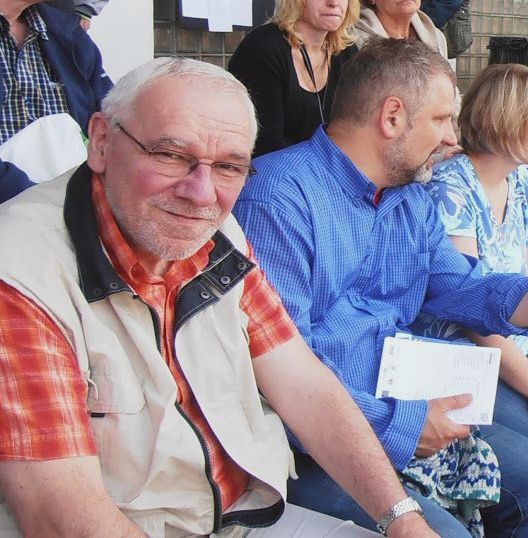
Oct 18, 2018 | Focolare Worldwide
The next event with the Friends of “Together for Europe” is going to be held in Prague, the land of the Hussites, the Prague Spring and the Velvet Revolution. The vast history of the Czech people will serve as the backdrop for the conversation among participants. It is a troubled history, marked by grand idealistic and spiritual re-awakenings and by a search for truth and justice that often ended in disappointment. Thus was the case of the three examples just mentioned: the Hussite Movement that began after the death of the priest Jan Hus, who was burned at the stake in 1415 and considered a martyr for the truth by his followers. Unfortunately, the wars that followed didn’t deal in truth, but in the lust for power and they completely devastated the country. Likewise, many centuries later, in 1968, the main actors in the Prague Spring, with the enthusiastic support of the whole country, wanted to install a Socialist regime with a human face, free of all the lies and cruelty of the recent past. Unfortunately, this hope was crushed under the wheels of armed tanks and ended in general resignation. Then came the Velvet Revolution in 1989, which many still remember. It was brought forward by its main protagonist, Vaclav Havel: “Love and the truth must win over the lies and the hate.” But no one expected the hard battle that followed: the spiritual values that were so strongly felt during the mass demonstrations in the public squares slowly dwindled as they were substituted with the pragmatism of the “technology of power.” The President of the Republic’s banner bears the words: “The Truth Wins.” However, two words were removed from the original version of that slogan: “The Truth of God Wins.” We’re sure that his truth will win before the end of the story.

Jiři Kratochvil
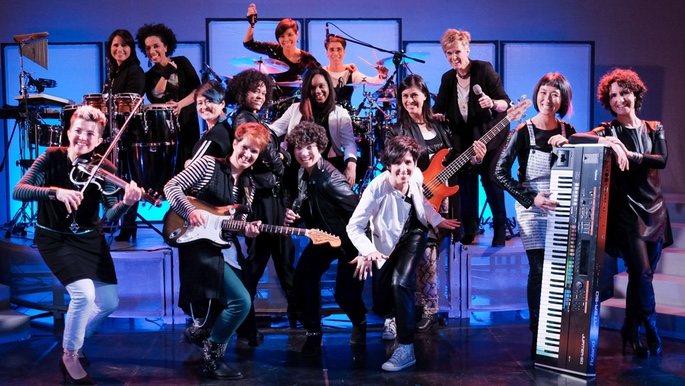
Oct 18, 2018 | Non categorizzato
 Rome: Partecipation in the event “Quando la Carità ti chiama”, (When Charity calls you), promoted by the Vincentian Family as part of the “Finding Vince 400” (FV400), International Film Festival. Auditorium Conciliazione. GenVerde Tours
Rome: Partecipation in the event “Quando la Carità ti chiama”, (When Charity calls you), promoted by the Vincentian Family as part of the “Finding Vince 400” (FV400), International Film Festival. Auditorium Conciliazione. GenVerde Tours
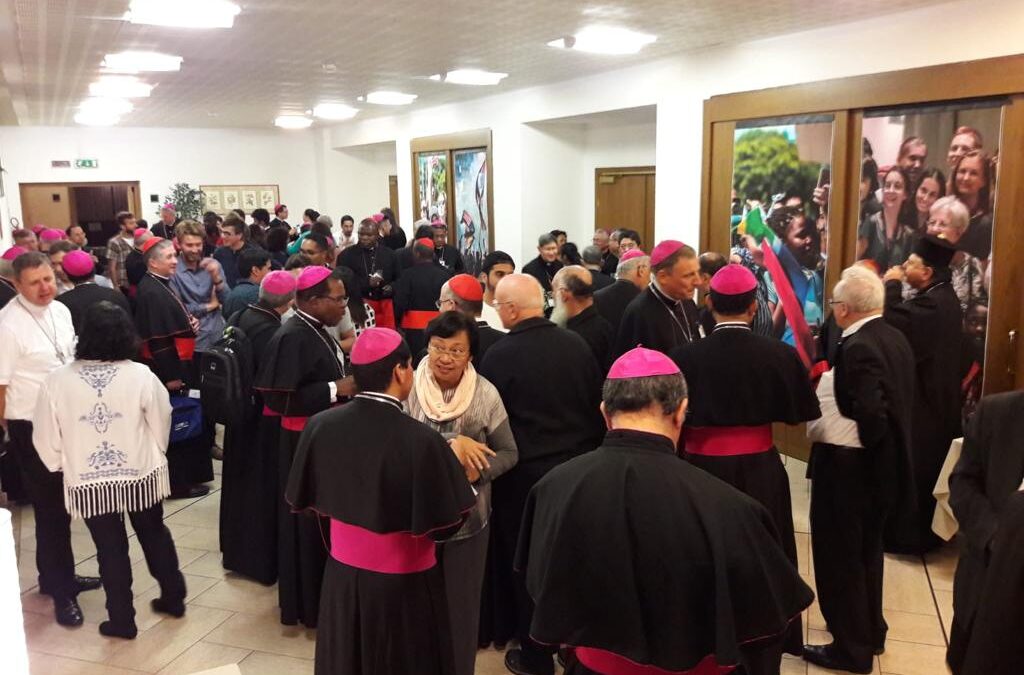
Oct 17, 2018 | Non categorizzato
Conversations in different languages could be heard amid the tastefully and simply set tables. For three evenings, the young people of the Focolare acted as hosts in a hall, close to where the works of the Synod will carry on up to 28 October. After a warm welcome, the three dinners revealed to be the right occasions for the exchange of ideas, informal sharing and mutual interaction. During dessert, there was a presentation of the recent international Genfest held in Manila and some experiences, and stories of commitment and coherence to boost closer contact with the synodal Fathers, in line with a meeting held a day earlier, where they express queries, uncertainties, choices, in the hope that the Synod would propose some answers. In the second soiree, František from Czechia took the floor. His words highlighted a genuine passion for politics and concrete commitment in view of the next European Parliament elections emerged with the request, “Please support me with your prayers, so that I may always be faithful to the choice of serving my people, without any personal interest.” A similar story came from Nicola. She is 33 and a pediatric therapist in a university hospital. “I engage in rare pathologies and pediatric insurgence, and therefore I am always in contact with situations often at the brink of death. The difficulty at times lies in communicating to the relatives, the prognosis and life expectancies of the child. In these moments, I entrust myself to God, so that he may help me find the right words and attitude. Cynical detachment is a due form of survival, but we mustn’t lose the human dimension. Every day for me is like a gym in which to love and serve God.” Then it was Nicola’s turn. “Practicing this profession – he explained – means living at the limit between faith and reason; in these years I have learned what suffering is, and what it means to live immobile on a bed, attached to the mechanical lung for breathing. At times my faith is harshly put to the test, but then I have no time to reflect, being ’forced’ to see to the people I have before me, and loving them. This is really a countenance of Jesus Forsaken. If I manage to welcome him poor and miserable as he is, this fills up the void. I have to face many situations. 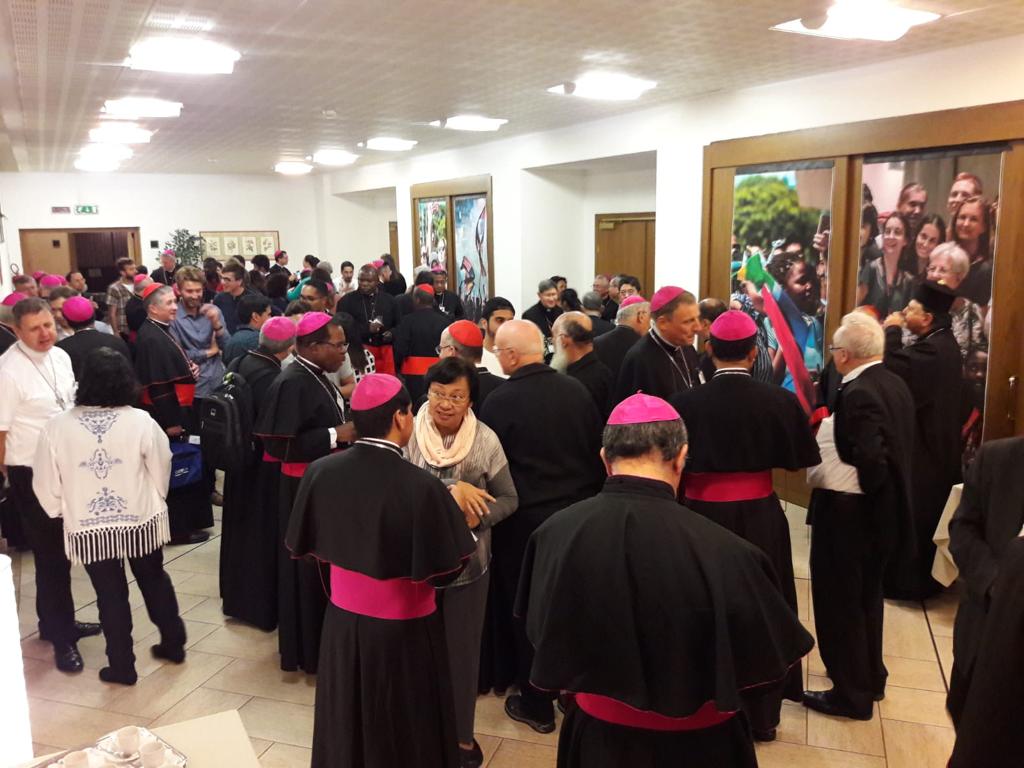 The families of the eastern countries are at times the most desperate since they do not have adequate healthcare systems, both from the economic and clinical standpoints that can help them. This is why they undertake hope journeys to our hospitals in search of treatments, which in some cases imply great expenses, given that these are issued only to Italian citizens. These situations lead us to reflect that at times, being born in one part of the world is just a matter of luck. It is in these cases that God reveals his grandeur and asks you to do the impossible. We certainly must not break the laws but we can try to help in other ways, for example, proposing strategies to limit at best the deformity of the joints, or trying to stand by and be of help.” Time had flown. It seemed like the guests did not wish to leave. The challenge of a deep and reciprocal listening between generations, the reason for the Synod itself, had also taken the form and consistency even in a dinner. And the dinner ended with the words of the song dedicated to Mary, the silent response of utmost love. By Chiara Favotti and Gustavo Clariá
The families of the eastern countries are at times the most desperate since they do not have adequate healthcare systems, both from the economic and clinical standpoints that can help them. This is why they undertake hope journeys to our hospitals in search of treatments, which in some cases imply great expenses, given that these are issued only to Italian citizens. These situations lead us to reflect that at times, being born in one part of the world is just a matter of luck. It is in these cases that God reveals his grandeur and asks you to do the impossible. We certainly must not break the laws but we can try to help in other ways, for example, proposing strategies to limit at best the deformity of the joints, or trying to stand by and be of help.” Time had flown. It seemed like the guests did not wish to leave. The challenge of a deep and reciprocal listening between generations, the reason for the Synod itself, had also taken the form and consistency even in a dinner. And the dinner ended with the words of the song dedicated to Mary, the silent response of utmost love. By Chiara Favotti and Gustavo Clariá
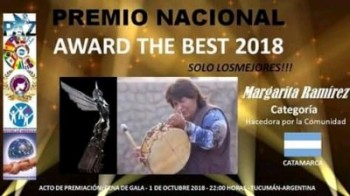
Oct 16, 2018 | Focolare Worldwide
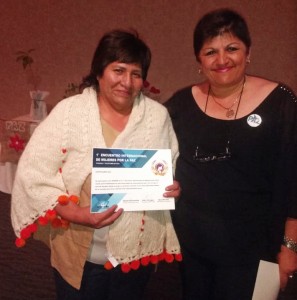 Many of our readers are familiar with the story of Margarita Ramirez De Moreno who comes from Santa Maria di Catamarca in the north east of Argentina. She is a descendent of Calchaquies Aborigines whose leader was Juan Calchaqui. These people were well known for their abilities in many forms of traditional crafts. Margarita certainly inherited an enterprising spirit and great talent in weaving from her ancestors. When she was young, she studied for a diploma at the “Aurora School” in her town: this institute is recognised by the Argentinian government for the outstanding contribution it makes to teaching about designs and traditional skills deriving from the “quechuan” culture. Later on in life, Margarita was unemployed but she did not give in to the personal challenges that she and many women like her faced but decided to open a spinning mill to provide thread for the looms in the school workshop. This enabled her to overcome discrimination and reclaim her cultural identity. On October 1st in Tucuman, Margarita received an award during the first international meeting of “Women for Peace” organised by the “World Federation of Grand Master Ladies”. This is an international association, found in many parts of the world that works with individuals, groups and foundations: its spirit facilitates women in establishing links of friendship, fraternity and support and enables them engage politically in initiatives promoting peace, security and protection.
Many of our readers are familiar with the story of Margarita Ramirez De Moreno who comes from Santa Maria di Catamarca in the north east of Argentina. She is a descendent of Calchaquies Aborigines whose leader was Juan Calchaqui. These people were well known for their abilities in many forms of traditional crafts. Margarita certainly inherited an enterprising spirit and great talent in weaving from her ancestors. When she was young, she studied for a diploma at the “Aurora School” in her town: this institute is recognised by the Argentinian government for the outstanding contribution it makes to teaching about designs and traditional skills deriving from the “quechuan” culture. Later on in life, Margarita was unemployed but she did not give in to the personal challenges that she and many women like her faced but decided to open a spinning mill to provide thread for the looms in the school workshop. This enabled her to overcome discrimination and reclaim her cultural identity. On October 1st in Tucuman, Margarita received an award during the first international meeting of “Women for Peace” organised by the “World Federation of Grand Master Ladies”. This is an international association, found in many parts of the world that works with individuals, groups and foundations: its spirit facilitates women in establishing links of friendship, fraternity and support and enables them engage politically in initiatives promoting peace, security and protection. 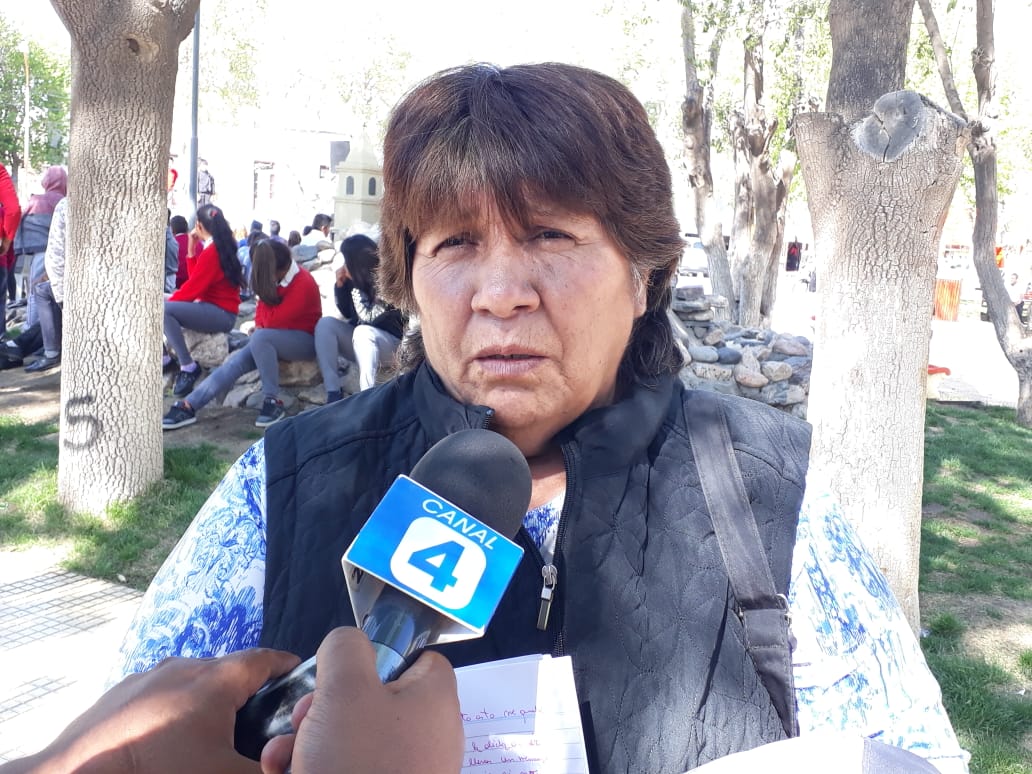 “There is no peace without justice and there is no justice without peace,” affirmed Mariela Martin Domenichelli, the co ordinator of the Latin American branch of the federation. “It’s important to listen to the women describing the situations in which they live so they can transform their ideas into political action that benefits the entire community.” The meeting wanted to showcase the positive contribution made by women in various fields of action. After the federation visited her area, Margarita was chosen as the person who symbolises the complete integration of women and the entire Aboriginal community to which they belong. Margarita – who now has seven children – said that it had not been easy to convince women in her area to work in spinning mills once again because they had suffered discrimination for so long. In addition, they had to walk long distances, crossing rivers to reach the mill because there was no transport. However, they gradually began to share the little they had: a bobbin, some wool or their skills in traditional crafts.
“There is no peace without justice and there is no justice without peace,” affirmed Mariela Martin Domenichelli, the co ordinator of the Latin American branch of the federation. “It’s important to listen to the women describing the situations in which they live so they can transform their ideas into political action that benefits the entire community.” The meeting wanted to showcase the positive contribution made by women in various fields of action. After the federation visited her area, Margarita was chosen as the person who symbolises the complete integration of women and the entire Aboriginal community to which they belong. Margarita – who now has seven children – said that it had not been easy to convince women in her area to work in spinning mills once again because they had suffered discrimination for so long. In addition, they had to walk long distances, crossing rivers to reach the mill because there was no transport. However, they gradually began to share the little they had: a bobbin, some wool or their skills in traditional crafts.  “The cost of machinery was a big problem,” Margarita said. “One day I was getting a lift and I told the driver about the difficulties we had. He told me that he knew how to make spinning machines and that we could pay him later, when we had the money. There were many difficulties but there were also signs that confirmed that what we were doing was right.” Margarita continued, “One day, when we were moving some fittings in the workshop, we found a picture of Mary, the Mother of God. This made a big impact on me and I felt that we should make a pact together to always love one another each day at work. We did this and soon after we received a donation that we used to buy better fittings and machinery.” We named our workshop “Tinku Kamayu” which in the local dialect means “Gathered together to work.” “We have found our identity and with that comes hope, growth, job opportunities for ourselves and others and the richness of our cultural origins. We feel we are useful – we don’t feel humiliated any longer. Other people appreciate us and want to hear our ideas.”
“The cost of machinery was a big problem,” Margarita said. “One day I was getting a lift and I told the driver about the difficulties we had. He told me that he knew how to make spinning machines and that we could pay him later, when we had the money. There were many difficulties but there were also signs that confirmed that what we were doing was right.” Margarita continued, “One day, when we were moving some fittings in the workshop, we found a picture of Mary, the Mother of God. This made a big impact on me and I felt that we should make a pact together to always love one another each day at work. We did this and soon after we received a donation that we used to buy better fittings and machinery.” We named our workshop “Tinku Kamayu” which in the local dialect means “Gathered together to work.” “We have found our identity and with that comes hope, growth, job opportunities for ourselves and others and the richness of our cultural origins. We feel we are useful – we don’t feel humiliated any longer. Other people appreciate us and want to hear our ideas.”
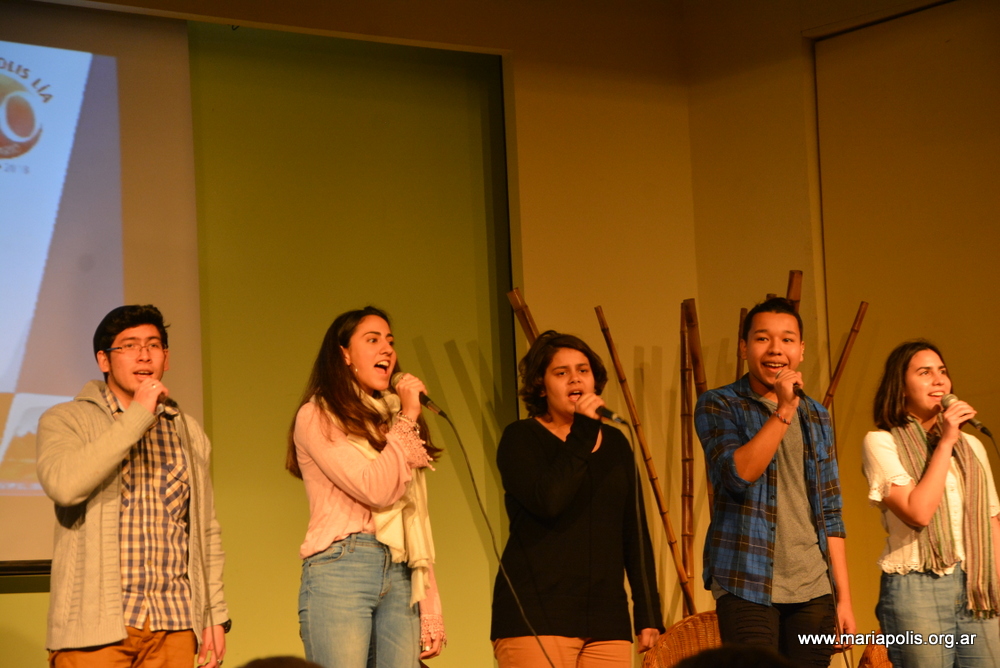
Oct 15, 2018 | Non categorizzato
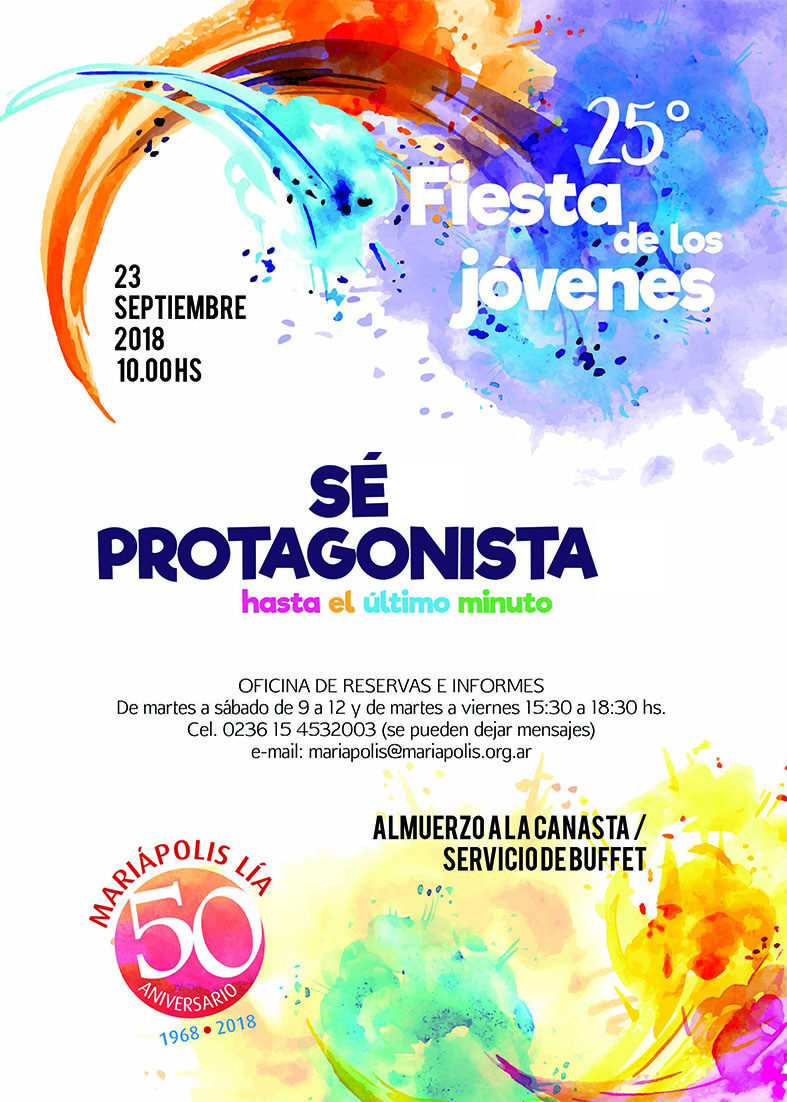 Argentina, Mariapolis Lia. 800 young people learning how to take lead roles, not only in drama but in real life. In the Argentine Pampas, the Focolare town Mariapolis Lia – named after Lia Brunet, a pioneer of the Focolare Movement in South America – is not slowing down after celebrating the 50th anniversary of its foundation in July. It launched an invitation over a spring weekend in September for young people to take the lead in their own lives “right to the last moment”. «This expression – explained a Mariapolis Lia resident – is inspired by Guillermo Curti, a Focolarino priest who died suddenly early in the year and who was for us a model of faithfulness and of love right to his last moment». The weekend of 22nd-23rd September saw the arrival of 800 young people from Paraguay, Uruguay and Argentina. «On the first day, we worked together in groups according to our countries of origin in order to prepare stands across the whole little town which showcased our own cultures and helped us all to get to know each other on a personal level. In the evening we put on a wonderful show of dance and performances reflecting our different folkloristic traditions. All of us young people found ourselves taking the lead in the preparation of the second day, Sunday, when more young people arrived from different regions of Argentina».
Argentina, Mariapolis Lia. 800 young people learning how to take lead roles, not only in drama but in real life. In the Argentine Pampas, the Focolare town Mariapolis Lia – named after Lia Brunet, a pioneer of the Focolare Movement in South America – is not slowing down after celebrating the 50th anniversary of its foundation in July. It launched an invitation over a spring weekend in September for young people to take the lead in their own lives “right to the last moment”. «This expression – explained a Mariapolis Lia resident – is inspired by Guillermo Curti, a Focolarino priest who died suddenly early in the year and who was for us a model of faithfulness and of love right to his last moment». The weekend of 22nd-23rd September saw the arrival of 800 young people from Paraguay, Uruguay and Argentina. «On the first day, we worked together in groups according to our countries of origin in order to prepare stands across the whole little town which showcased our own cultures and helped us all to get to know each other on a personal level. In the evening we put on a wonderful show of dance and performances reflecting our different folkloristic traditions. All of us young people found ourselves taking the lead in the preparation of the second day, Sunday, when more young people arrived from different regions of Argentina».  For Sunday’s programme, the Mariapolis was transformed into a cinema set, ready to start filming various movies set in five different eras (the 70s, 80s, 90s, 2000s and 2010s), in a range of genres, ranging from horror to musical, drama to science fiction. «The five decades represented the fiftieth anniversary of the Mariapolis town – they explained. Each film explored, through experiences and life stories, at least one of the challenges faced by young people today: forms of dependency, consumerism, life choices, social and mass media». To conclude, an award ceremony along with speeches in front of a live audience in the Mariapolis town, with another 200 groups following on a live link and thousands more viewing online over the following days. «What emerged as the weekend came to a close was an all pervasive sense of joy. Together we had faced up to many difficulties and shared a deep experience of unity which changed us. We experienced it as the presence of Jesus among us». As hundreds of young people travelled home in many directions, for those who remained in the Mariapolis Lia, the celebration continued with a shared supper and more singing and dancing, to express their joy at such an inspiring experience lived together.
For Sunday’s programme, the Mariapolis was transformed into a cinema set, ready to start filming various movies set in five different eras (the 70s, 80s, 90s, 2000s and 2010s), in a range of genres, ranging from horror to musical, drama to science fiction. «The five decades represented the fiftieth anniversary of the Mariapolis town – they explained. Each film explored, through experiences and life stories, at least one of the challenges faced by young people today: forms of dependency, consumerism, life choices, social and mass media». To conclude, an award ceremony along with speeches in front of a live audience in the Mariapolis town, with another 200 groups following on a live link and thousands more viewing online over the following days. «What emerged as the weekend came to a close was an all pervasive sense of joy. Together we had faced up to many difficulties and shared a deep experience of unity which changed us. We experienced it as the presence of Jesus among us». As hundreds of young people travelled home in many directions, for those who remained in the Mariapolis Lia, the celebration continued with a shared supper and more singing and dancing, to express their joy at such an inspiring experience lived together.
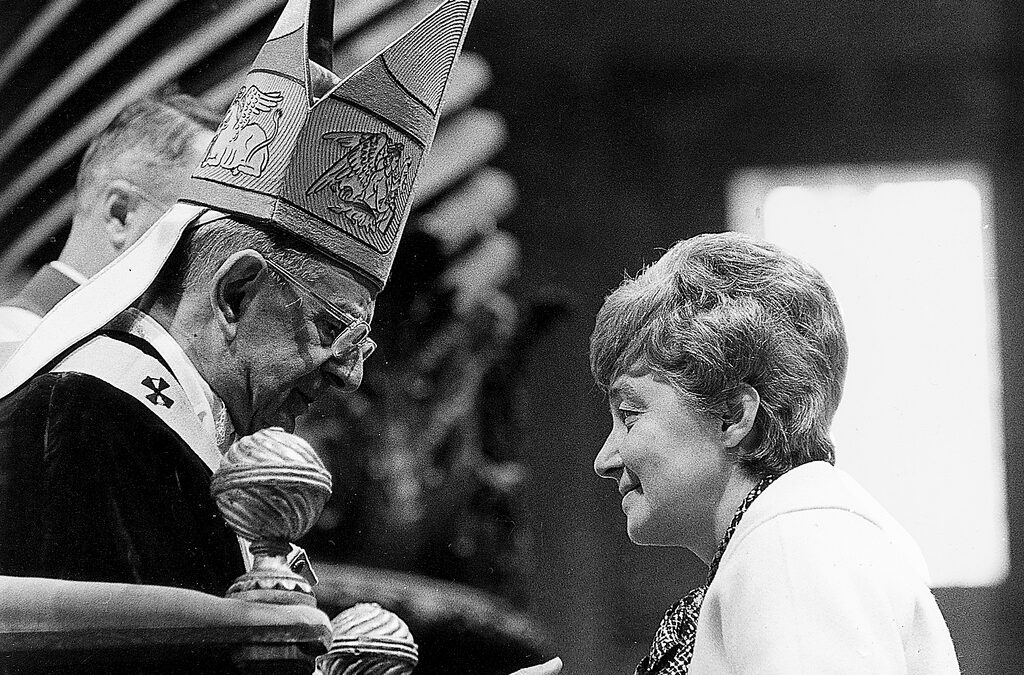
Oct 14, 2018 | Focolare Worldwide
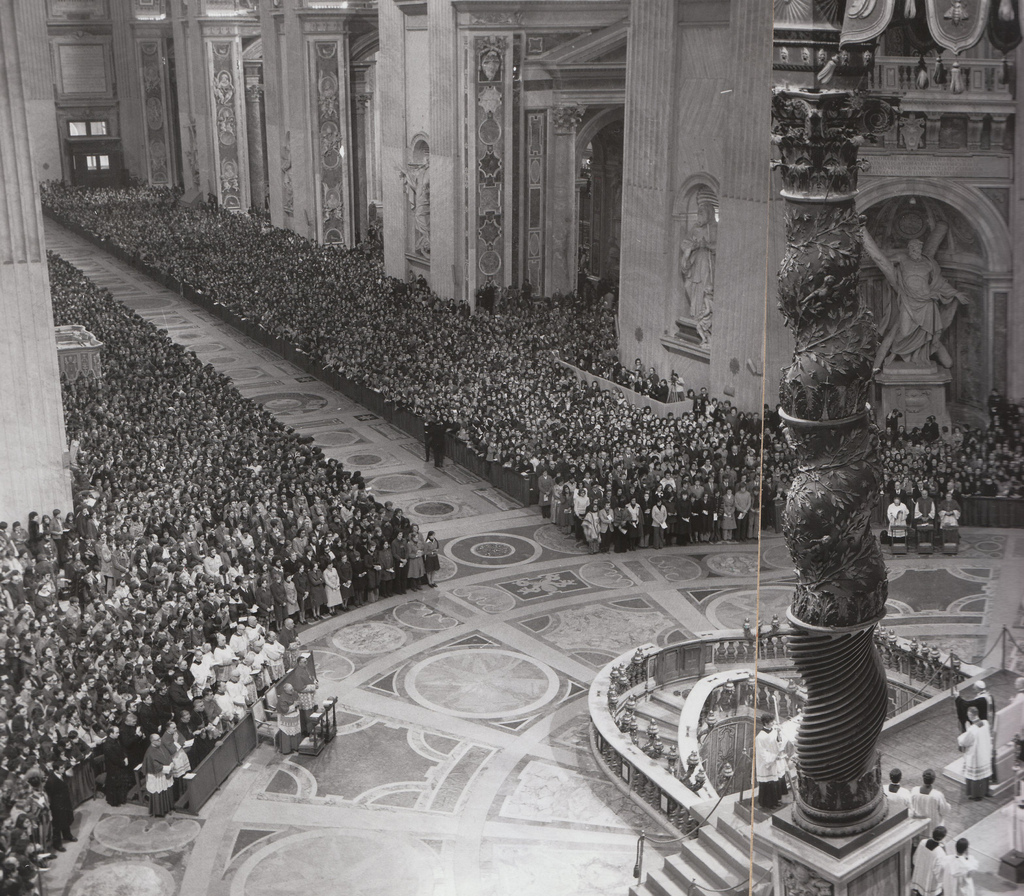 “YOUNG GEN! We welcome you with great joy as sons and daughters, brothers and sisters, friends! […] To search is really part of being a young person. Once the eyes of consciousness have opened on the world around us, curiosity is aroused in the souls of young people: they want to know, they want to try above anything else, and they want to attempt. Search, but for what? […] You, the young people of our times, you already have a negative answer, an almost rebellious answer in your hearts: we don’t want, you say, a world that presents itself to use like this! It’s a strange phenomenon: a world that offers you the most beautiful, the most perfect, the most enjoyable fruits of contemporary civilisation, doesn’t satisfy you, doesn’t please you. You benefit from the achievements, the comforts, the wonders placed at your disposal by modern progress. Yet a sense of criticism, protest and even nausea stops your search in this direction. This is a direction that takes you out of yourselves, an alienation because at the basis, it is a materialistic, hedonistic and selfish direction. It does not fully satisfy the soul. It does not completely resolve the important and personal problems of life. […] You have made a different choice. This is why you are called Gen, new generation. It is before all else a liberating choice, liberating from the passive conformism that affects so many young people of our times… At the basis of your psychology is a personal and sovereign act of free determination. The choice of Christ. […] Jesus Christ has crossed your path; and this is why you are here. Yes, the meeting with Him, Jesus Christ. But who is Jesus Christ? What an infinite question! […] Well: first, in Himself, Christ is the word of God made man; Christ is for us the Saviour of humanity. Two oceans: the Jesus Christ’s divinity, and Jesus Christ’s mission in the world. […] It seems to us that you, Focolarini, have faced this dual problem: Who is He, Christ? And Who is He, Christ, for us? And now the fire of light, enthusiasm, action, the gift of self and joy has been lit within you, and with a newfound inner fullness you have understood everything, God, yourselves, your life, people, our times, the central direction to take for the whole of your existence. Yes, this is the solution, this is the key, this is the formula, ancient and eternal, and when it is discovered, new. You have intuited it, and you have, rightfully, given your movement the definition of ‘New Generation’, Gen!
“YOUNG GEN! We welcome you with great joy as sons and daughters, brothers and sisters, friends! […] To search is really part of being a young person. Once the eyes of consciousness have opened on the world around us, curiosity is aroused in the souls of young people: they want to know, they want to try above anything else, and they want to attempt. Search, but for what? […] You, the young people of our times, you already have a negative answer, an almost rebellious answer in your hearts: we don’t want, you say, a world that presents itself to use like this! It’s a strange phenomenon: a world that offers you the most beautiful, the most perfect, the most enjoyable fruits of contemporary civilisation, doesn’t satisfy you, doesn’t please you. You benefit from the achievements, the comforts, the wonders placed at your disposal by modern progress. Yet a sense of criticism, protest and even nausea stops your search in this direction. This is a direction that takes you out of yourselves, an alienation because at the basis, it is a materialistic, hedonistic and selfish direction. It does not fully satisfy the soul. It does not completely resolve the important and personal problems of life. […] You have made a different choice. This is why you are called Gen, new generation. It is before all else a liberating choice, liberating from the passive conformism that affects so many young people of our times… At the basis of your psychology is a personal and sovereign act of free determination. The choice of Christ. […] Jesus Christ has crossed your path; and this is why you are here. Yes, the meeting with Him, Jesus Christ. But who is Jesus Christ? What an infinite question! […] Well: first, in Himself, Christ is the word of God made man; Christ is for us the Saviour of humanity. Two oceans: the Jesus Christ’s divinity, and Jesus Christ’s mission in the world. […] It seems to us that you, Focolarini, have faced this dual problem: Who is He, Christ? And Who is He, Christ, for us? And now the fire of light, enthusiasm, action, the gift of self and joy has been lit within you, and with a newfound inner fullness you have understood everything, God, yourselves, your life, people, our times, the central direction to take for the whole of your existence. Yes, this is the solution, this is the key, this is the formula, ancient and eternal, and when it is discovered, new. You have intuited it, and you have, rightfully, given your movement the definition of ‘New Generation’, Gen! 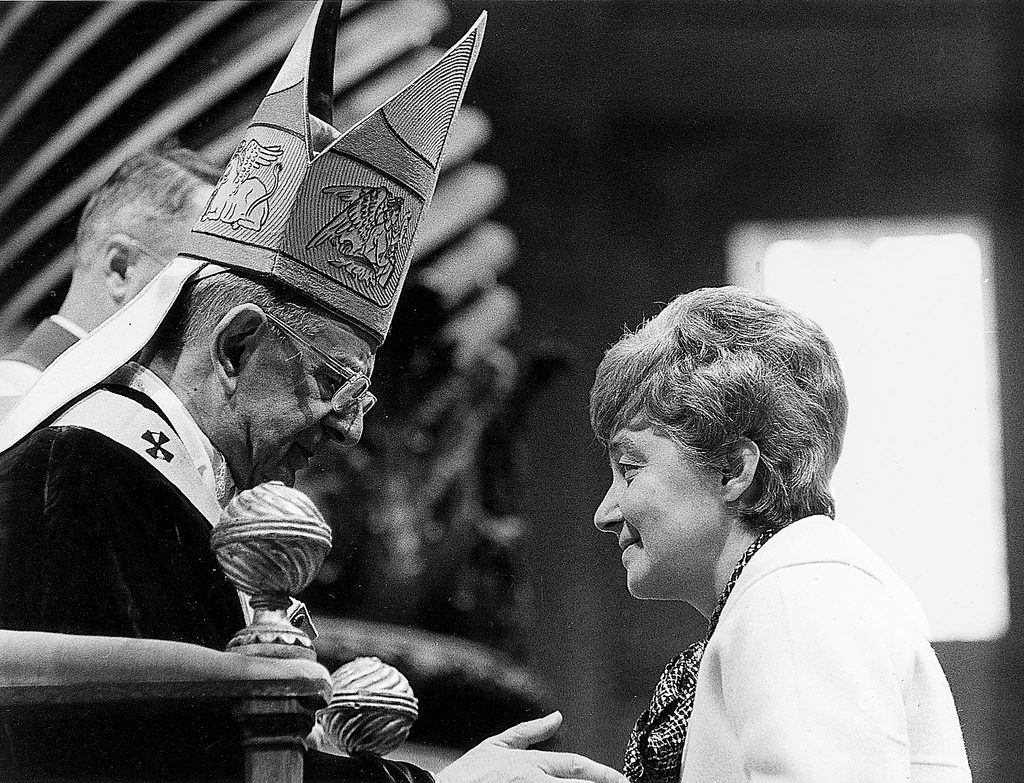 So, dear Young Gen! Encounter, know, love, follow Jesus Christ! This is your program. This is the synthesis of your spirituality which you, by celebrating the Jubilee of the Holy Year, wish to reaffirm in your consciences and translate into life. With two conclusions. The first, in order to condense the secret of your Movement in a central and mature thought try always to have Jesus as Teacher. And then the second conclusion, that we likewise listen to the words spoken by Jesus the Teacher: ‘You are all brothers and sisters’. Have the wisdom and courage to reach this conclusion which is the root of Christian social teaching. It is often disconcerting to observe how many claiming to be those who follow the Gospel are incapable of deducing from the Gospel itself a social teaching based on love. […] You, the new Generation, are faithful and coherent. If you have chosen Christ as your Master, have faith in Him and in the Church which leads and presents Him to you. Demonstrate with actions the realizing force of charity and social love, established by the Master. It will be an experience, yes, a new one, one which generates a better and more just world. It will be a strong experience; demanding resistance, sacrifice, maybe even heroism; it will demand that you too are the robust and willing Cyrenians who offer their own backs to support the Cross of Jesus. Yes, you should also suffer with Him, as Him, for Him! But do not be afraid, Gen! Be sure! You will have operated your salvation and that of our modern world. And just as you are today, you will always be good and happy!”
So, dear Young Gen! Encounter, know, love, follow Jesus Christ! This is your program. This is the synthesis of your spirituality which you, by celebrating the Jubilee of the Holy Year, wish to reaffirm in your consciences and translate into life. With two conclusions. The first, in order to condense the secret of your Movement in a central and mature thought try always to have Jesus as Teacher. And then the second conclusion, that we likewise listen to the words spoken by Jesus the Teacher: ‘You are all brothers and sisters’. Have the wisdom and courage to reach this conclusion which is the root of Christian social teaching. It is often disconcerting to observe how many claiming to be those who follow the Gospel are incapable of deducing from the Gospel itself a social teaching based on love. […] You, the new Generation, are faithful and coherent. If you have chosen Christ as your Master, have faith in Him and in the Church which leads and presents Him to you. Demonstrate with actions the realizing force of charity and social love, established by the Master. It will be an experience, yes, a new one, one which generates a better and more just world. It will be a strong experience; demanding resistance, sacrifice, maybe even heroism; it will demand that you too are the robust and willing Cyrenians who offer their own backs to support the Cross of Jesus. Yes, you should also suffer with Him, as Him, for Him! But do not be afraid, Gen! Be sure! You will have operated your salvation and that of our modern world. And just as you are today, you will always be good and happy!”
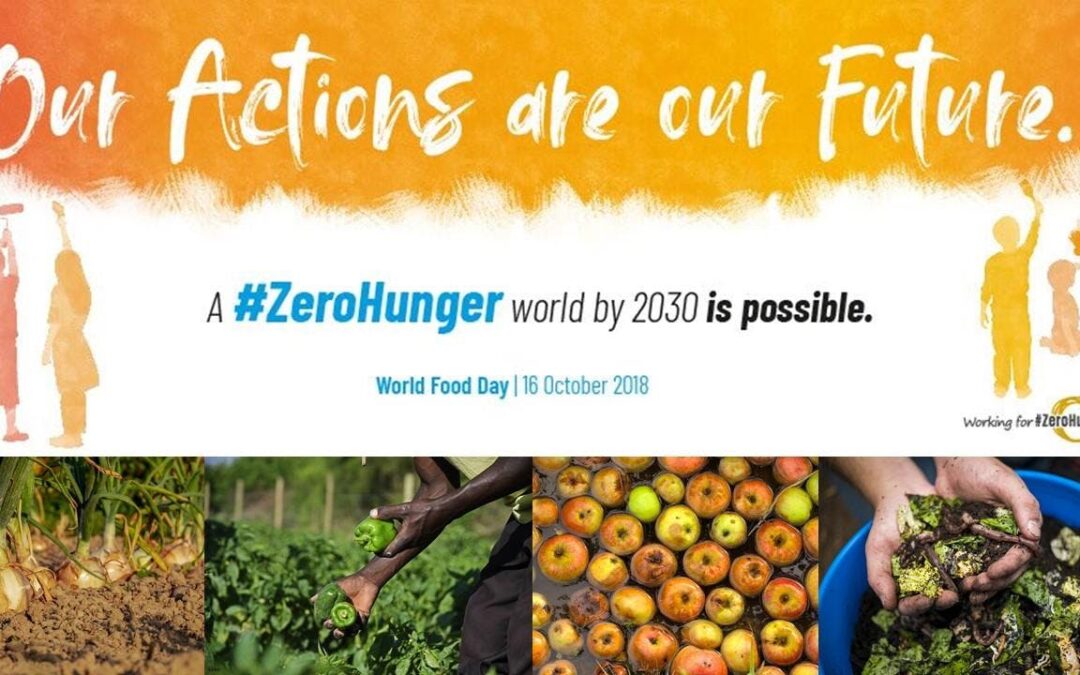
Oct 14, 2018 | Non categorizzato
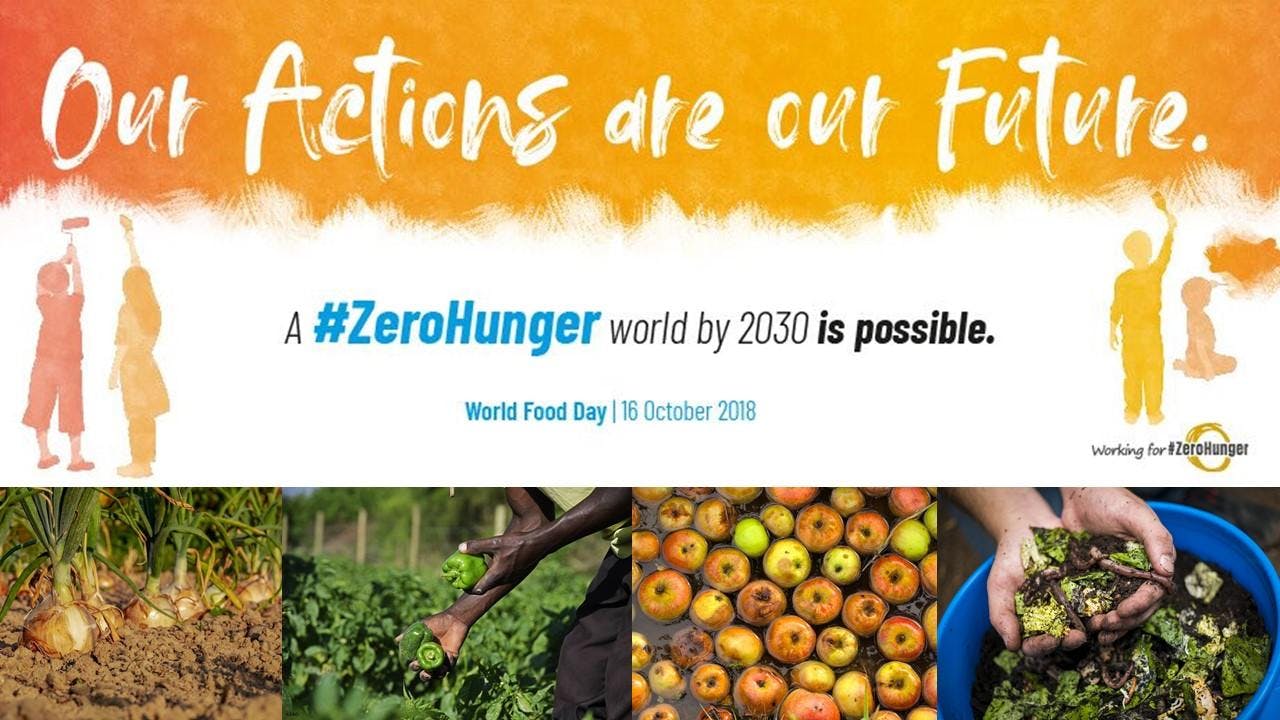 The theme of this year’s World Food Day is “Our actions are our future.” The event is held every year on October 16 by the Food and Agriculture Organisation (FAO). The day involves international organisations along with civil institutes, schools, businesses, media, research organisations and institutions in a rich program of events and public demonstrations to sensitize public opinion on topics such as poverty, hunger and malnutrition in favour of arriving at Zero Hunger, which is included among the objectives for the United Nations 2030 agenda. The teenagers of the Focolare Movement included it as one of the central points of their training and action during the whole year. Last June, a delegation of teenagers took part in a discussion at the International Headquarters of the FAO of Rome, Italy and received a “Zero Hunger Citizen” passport. The held projects around the world to raise awareness among peers and adults and dedicated the 2/2018 edition of the bi-monthly magazine “Teens” (Citta Nuova).
The theme of this year’s World Food Day is “Our actions are our future.” The event is held every year on October 16 by the Food and Agriculture Organisation (FAO). The day involves international organisations along with civil institutes, schools, businesses, media, research organisations and institutions in a rich program of events and public demonstrations to sensitize public opinion on topics such as poverty, hunger and malnutrition in favour of arriving at Zero Hunger, which is included among the objectives for the United Nations 2030 agenda. The teenagers of the Focolare Movement included it as one of the central points of their training and action during the whole year. Last June, a delegation of teenagers took part in a discussion at the International Headquarters of the FAO of Rome, Italy and received a “Zero Hunger Citizen” passport. The held projects around the world to raise awareness among peers and adults and dedicated the 2/2018 edition of the bi-monthly magazine “Teens” (Citta Nuova).
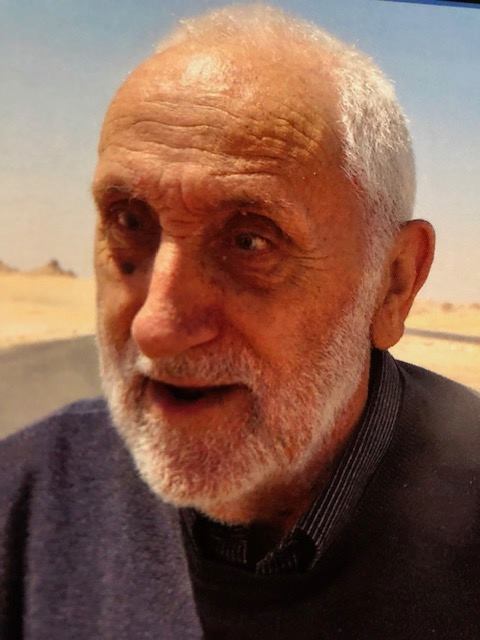
Oct 14, 2018 | Non categorizzato
 On 13 October, Ruggero Badano, father of Chiara Luce passed away at the age of 83. A good man with a simple and strong faith, together with his wife, Maria Teresa, he had witnessed the extraordinary human and spiritual experience which had led their daughter to be declared “Blessed” on 25 September 2010. “I thank Jesus for having sent you in our midst in this Journey which shall never end,” she had written on her 18th birthday. The Focolare Movement conveys its solidarity with Maria Teresa, the members of the Chiara Badano Foundation and all the friends of Blessed Chiara Badano, with immense gratitude for Ruggero’s exemplary life. For info: www.chiarabadano.org
On 13 October, Ruggero Badano, father of Chiara Luce passed away at the age of 83. A good man with a simple and strong faith, together with his wife, Maria Teresa, he had witnessed the extraordinary human and spiritual experience which had led their daughter to be declared “Blessed” on 25 September 2010. “I thank Jesus for having sent you in our midst in this Journey which shall never end,” she had written on her 18th birthday. The Focolare Movement conveys its solidarity with Maria Teresa, the members of the Chiara Badano Foundation and all the friends of Blessed Chiara Badano, with immense gratitude for Ruggero’s exemplary life. For info: www.chiarabadano.org
Oct 12, 2018 | Non categorizzato
Women can symbolize today’s civilization. In magazines and movie screens, in advertising and art, they reign like queens. Yet it is easy to see their royalty as artificial: divas who hold court today are forgotten tomorrow. In contrast, from this perspective the biographies of Christianity’s greatest female saints and their teachings once again become current. Teresa, the reformer of Carmel during the Protestant revolution, under the suspicious gaze of the kings and lords of Spain, faced with the threat of the Inquisition in her country, achieved her freedom through poverty. It is the unique freedom of God’s children. She remade her existence into an eminent adventure to overcome human with divine. She brought beauty, the poetry of holiness, back to the center of our individual and social existence. At the time there was a form of self-righteousness that you might just as well have called misogyny. Catherine of Siena had already suffered it and had been silenced because she was a woman – she who never stopped urging men, including the high and mighty, to not behave like little girls. St. Teresa gave herself entirely to God and inspired other women to do so. The obsession of our modern days lies in a continuous, frenetic demand for recognition and riches. Teresa taught us to free ourselves from this slavery and recover our serenity and peace. In her writings she explains her reasons with evidence, a light that enchants souls – even those of men today who are in the clutches of business. She is a strong woman who speaks only to serve God with energy and perseverance. She knew of the influence that a woman consecrated to God can have on society. Her life and writings demonstrate the essence of the Gospel revolution, in our hearts and in the people, uncovering yet again the essentials of love that, through our neighbors, opens access to God. It puts God in the spirit, in the law, in institutions, in customs. Teresa, with the grace of a mother and teacher, taught to speak continuously with God, a conversation that everyone can carry out within the temple of their souls, even while on the road, even surrounded by noise. I believe that day after day the number of women and men who are guided by Teresa’s wisdom will increase. They will rediscover their reason for being, going back with her to the source. Action will blossom more and more from contemplation. Yet here – we could say with the saint – Martha and Mary almost always align, since the interior works on the exterior … When exterior works come from these roots, there are admirable, sweetly scented flowers that blossom from the tree of divine love. Teresa was a courageous astronaut of the divine, as well as also a practical woman who knew the world. And because she knew the world, she stood out in heaven. If her teachings were to expand even to our own homes, unions, politics, factories and the world, it would become a sort of Carmel, where Teresa took on the feminine royalty of she who was blessed among women. Igino Giordani, Fides, n.7–12, 1962, pp.185–187.
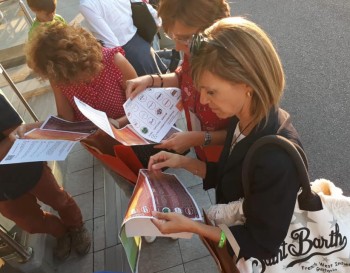
Oct 11, 2018 | Focolare Worldwide
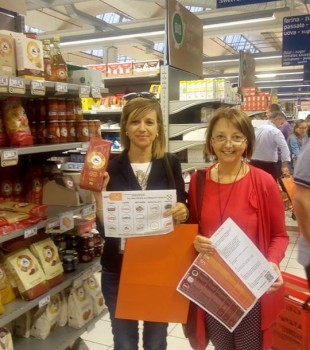 Put the heads of a group of teenagers together having taken part in the recent annual workshop in Loppiano, and one keyword emerges: “participation.” In view of this, the Youth Section of the Economy of Communion (EoC) launched on the social network and among their friends a workshop called “Inside the LABel.” At the conclusion of the day which the Bonfanti Industrial Park had dedicated to the topics of economy and work, the participants left the meeting hall and the filled cars that were waiting to take them to the nearby Coop Supermarket in the town of Figline. A table was set up at the entrance of the superstore along with ballot boxes. Then, an innovative experiment began that lasted for two hours, a genuine voting campaign. The five candidates were: pasta, coffee, chocolate, canned tuna and oranges. “But what does democracy have to do with a supermarket?” someone asked. “It does, it has a lot to do…” said one of the organizers named Chiara. “Using our wallets, we exert our “buying power.” The “vote with our wallet” is just one example of civil responsibility. Whenever we buy a product we express a preference, we support the work of a business that produces the product, a particular business model, a mission, a series of internal processes, a certain type of managing of relationships with employees and providers, a certain type of impact on the environment.” “After a meeting with Luigino Buni on the relationship between democracy and market,” says Stefania, “we worked for nearly three months examining the ‘vision’ and ‘mission’ of small and large brands at around 20 businesses. Following indicators such as transparency, production chain, respect for the environment, social responsibility, corporate form and legal record, we gathered data and information that were published on the web.”
Put the heads of a group of teenagers together having taken part in the recent annual workshop in Loppiano, and one keyword emerges: “participation.” In view of this, the Youth Section of the Economy of Communion (EoC) launched on the social network and among their friends a workshop called “Inside the LABel.” At the conclusion of the day which the Bonfanti Industrial Park had dedicated to the topics of economy and work, the participants left the meeting hall and the filled cars that were waiting to take them to the nearby Coop Supermarket in the town of Figline. A table was set up at the entrance of the superstore along with ballot boxes. Then, an innovative experiment began that lasted for two hours, a genuine voting campaign. The five candidates were: pasta, coffee, chocolate, canned tuna and oranges. “But what does democracy have to do with a supermarket?” someone asked. “It does, it has a lot to do…” said one of the organizers named Chiara. “Using our wallets, we exert our “buying power.” The “vote with our wallet” is just one example of civil responsibility. Whenever we buy a product we express a preference, we support the work of a business that produces the product, a particular business model, a mission, a series of internal processes, a certain type of managing of relationships with employees and providers, a certain type of impact on the environment.” “After a meeting with Luigino Buni on the relationship between democracy and market,” says Stefania, “we worked for nearly three months examining the ‘vision’ and ‘mission’ of small and large brands at around 20 businesses. Following indicators such as transparency, production chain, respect for the environment, social responsibility, corporate form and legal record, we gathered data and information that were published on the web.” 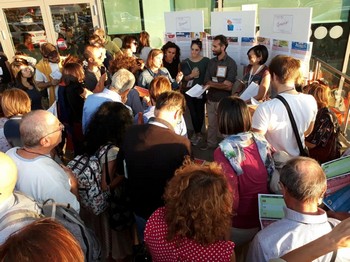 “It was an interesting and enriching challenge,” continues Francesca, “which revealed a complexity of ethics, values and conventions that influence our daily purchases. As we moved ahead and our awareness increased, we came up with a project that we could share. The role of civil responsibility, being critical consumers and becoming aware that one’s own purchases, can influence the behaviour of large and small businesses. This is why we came up with a project that we call “Inside the Label.” This year’s LoppianoLab seemed like the opportunity to present it.” Andrea interrupts: “Based on the materials that were collected, we chose three products from different brands for each category, trying to highlight the nuances in terms of transparency, pricing, commitment and quality. We left it to the participants to choose the products they would buy, after having shared with them the tools for reading the labels also for “moral calories” and “ethical sugars.” It was a project that took nothing for granted, but stuck to reality.
“It was an interesting and enriching challenge,” continues Francesca, “which revealed a complexity of ethics, values and conventions that influence our daily purchases. As we moved ahead and our awareness increased, we came up with a project that we could share. The role of civil responsibility, being critical consumers and becoming aware that one’s own purchases, can influence the behaviour of large and small businesses. This is why we came up with a project that we call “Inside the Label.” This year’s LoppianoLab seemed like the opportunity to present it.” Andrea interrupts: “Based on the materials that were collected, we chose three products from different brands for each category, trying to highlight the nuances in terms of transparency, pricing, commitment and quality. We left it to the participants to choose the products they would buy, after having shared with them the tools for reading the labels also for “moral calories” and “ethical sugars.” It was a project that took nothing for granted, but stuck to reality.  Like every respectable voting campaign, the votes are anticipated by a talk show prepared and broadcast by the organizers at the entrance of the Coop. Each of them presents his or her own candidate, along with comments from a citizen-consumer. Then, the participants are provided with a shopping sack, a voting card and the addresses of a web site which was created for the occasion. The aisles of the Co-op, with its usual Saturday family shoppers, were also filled with shoppers who were carefully re-reading labels. After paying the cashier, the final democratic duty of political responsibility was to mark an “X” beside the products one had chosen and to drop it into the ballot box. Then there were interviews, photos, surveys and data collection. There were more than a hundred voters, but far many more things to think about. In the meantime, the Italian Constituent of the EoC is already planning a second “Inside the LABel” event at Castel Gandolfo, Italy, on the occasion of the International Prophetic Economy Event (November 2-4). Deep down, we’re all change-makers. Source: EdC online
Like every respectable voting campaign, the votes are anticipated by a talk show prepared and broadcast by the organizers at the entrance of the Coop. Each of them presents his or her own candidate, along with comments from a citizen-consumer. Then, the participants are provided with a shopping sack, a voting card and the addresses of a web site which was created for the occasion. The aisles of the Co-op, with its usual Saturday family shoppers, were also filled with shoppers who were carefully re-reading labels. After paying the cashier, the final democratic duty of political responsibility was to mark an “X” beside the products one had chosen and to drop it into the ballot box. Then there were interviews, photos, surveys and data collection. There were more than a hundred voters, but far many more things to think about. In the meantime, the Italian Constituent of the EoC is already planning a second “Inside the LABel” event at Castel Gandolfo, Italy, on the occasion of the International Prophetic Economy Event (November 2-4). Deep down, we’re all change-makers. Source: EdC online
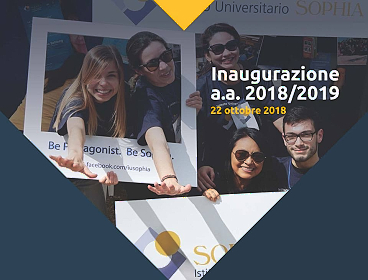
Oct 11, 2018 | Focolare Worldwide
 Sophia University Institute of Loppiano will celebrate the opening of the 11th academic year on October 22, 2018, at 17:00 in the Auditorium. Following the greetings from the Grand Chancellor, Cardinal Giuseppe Betori, Archbishop of Florence, Italy; Vice-Grand Chancellor Dr Maria Voce, president of the Work of Mary; and Dr Egidio Sgulloni, president of the Foundation for Sophia, there will be a panel discussion “On the net: Sophia and the University of Perugia,” with interventions by Dr Piero Coda, president of Sophia University Institute, Dr Franco Moriconi, Grand Rector of the Universty of Perugia Studies, and of Dr Mary Elisabeth Trini, double graduate with a double title IU Sophia-University of Perugia. It will conclude with a roundtable titled “The Challenge of Fraternity In Politics and Law,” with a presentation by the “Sophia Center for Researcih on Politics and Human Rights.” Professors Antonio Maria Baggio (IUS), Adriana Cosseddu (University of Sassari) and Antonio Marques Prieto (University of Malaga) will also make presentations.
Sophia University Institute of Loppiano will celebrate the opening of the 11th academic year on October 22, 2018, at 17:00 in the Auditorium. Following the greetings from the Grand Chancellor, Cardinal Giuseppe Betori, Archbishop of Florence, Italy; Vice-Grand Chancellor Dr Maria Voce, president of the Work of Mary; and Dr Egidio Sgulloni, president of the Foundation for Sophia, there will be a panel discussion “On the net: Sophia and the University of Perugia,” with interventions by Dr Piero Coda, president of Sophia University Institute, Dr Franco Moriconi, Grand Rector of the Universty of Perugia Studies, and of Dr Mary Elisabeth Trini, double graduate with a double title IU Sophia-University of Perugia. It will conclude with a roundtable titled “The Challenge of Fraternity In Politics and Law,” with a presentation by the “Sophia Center for Researcih on Politics and Human Rights.” Professors Antonio Maria Baggio (IUS), Adriana Cosseddu (University of Sassari) and Antonio Marques Prieto (University of Malaga) will also make presentations.
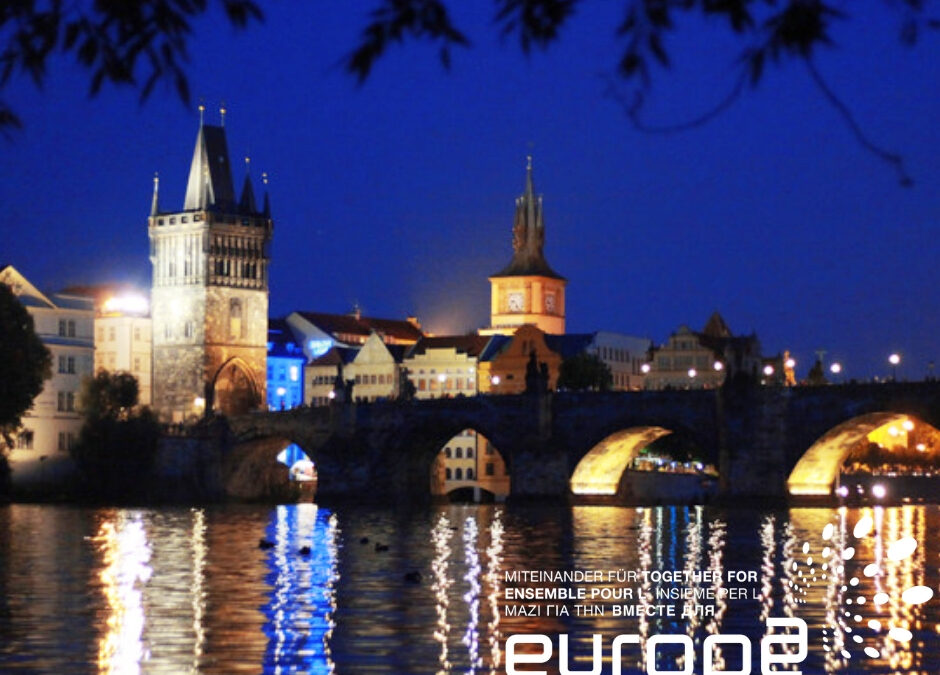
Oct 10, 2018 | Focolare Worldwide
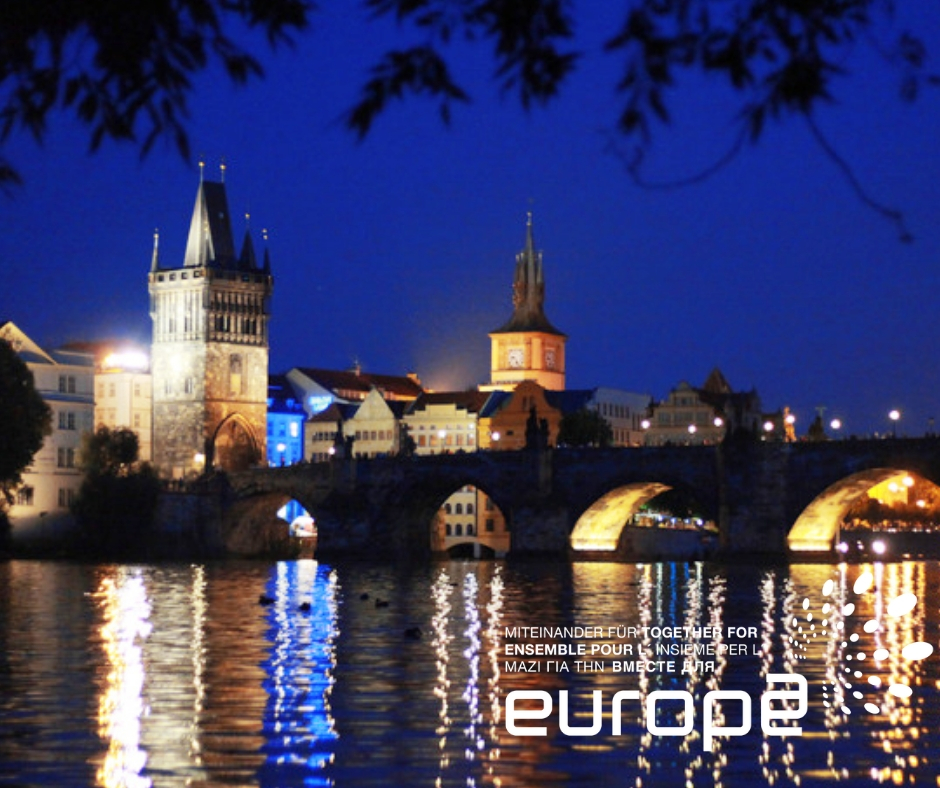 The great history of Central Europe, in particular of the Czech nation will serve as a backdrop for a new stage in the journey of Together for Europe, which promotes dialogue between divergent cultural and political identities. In November 2017 the European meeting of Friends of Together for Europe took place in Vienna, a bridge between Eastern and Western Europe. This year, we will have the opportunity to take another step to the very heart of Central Eastern Europe – Prague, with a singular desire to face challenges, prejudices and fears which weigh on the collective conscience of EU member states and beyond. Through the life of the Gospel, nourished and enlightened by the presence of Christ in the Christian communities, we wish to witness to the fact that the path towards Europe as a House of Nations and a Family of Peoples is not a utopia. The enduring legacy of the “Velvet Revolution” On 17th November, the Czech Republic commemorates the anniversary of the “Velvet Revolution” (so called due to its peaceful nature) which transformed the Czech Republic into a co-protagonist for the ongoing process of European reunification. The presence of the Friends of Together for Europe in Prague on this very day, urges us to renew our shared commitment: to bring to a post-secular culture the spirit of Christian Humanism, and in so doing contribute to building a more united Europe. The renowned Czech Philosopher and Theologian Tomas Halik, friend of the late Vaclav Havel, Jaroslav Sebek of the Historical Czech Academy of Science, and Pavel Fischer an emerging Czech politician, together with leaders and representatives of different Movements, Communities and Associations will be present. Their contributions will reinforce the daring objective of this meeting: to recall a Europe of hope and promise, a Europe which stems from a rich heritage of ethnic, social and cultural diversity and calls out for communion and dialogue. In this way, the Prague event will become a fundamental phase of Together for Europe which continues its commitment for a more united, brotherly and just Europe. It will also be a unique opportunity to prepare together for the upcoming elections for the European Parliament. The meeting will conclude with an open evening, in which Movements and Communities from different churches and which are present in the Czech Republic will be represented. Address: Mariapolis Centre, Mladoboleslavská 667, 190 17 Prague 9 – Vinoř, Czech Republic – Tel. +420 286 007 711; Email: cmpraha@espol.cz; www.centrummariapoli.cz Source: Together for Europe Foto: Canva
The great history of Central Europe, in particular of the Czech nation will serve as a backdrop for a new stage in the journey of Together for Europe, which promotes dialogue between divergent cultural and political identities. In November 2017 the European meeting of Friends of Together for Europe took place in Vienna, a bridge between Eastern and Western Europe. This year, we will have the opportunity to take another step to the very heart of Central Eastern Europe – Prague, with a singular desire to face challenges, prejudices and fears which weigh on the collective conscience of EU member states and beyond. Through the life of the Gospel, nourished and enlightened by the presence of Christ in the Christian communities, we wish to witness to the fact that the path towards Europe as a House of Nations and a Family of Peoples is not a utopia. The enduring legacy of the “Velvet Revolution” On 17th November, the Czech Republic commemorates the anniversary of the “Velvet Revolution” (so called due to its peaceful nature) which transformed the Czech Republic into a co-protagonist for the ongoing process of European reunification. The presence of the Friends of Together for Europe in Prague on this very day, urges us to renew our shared commitment: to bring to a post-secular culture the spirit of Christian Humanism, and in so doing contribute to building a more united Europe. The renowned Czech Philosopher and Theologian Tomas Halik, friend of the late Vaclav Havel, Jaroslav Sebek of the Historical Czech Academy of Science, and Pavel Fischer an emerging Czech politician, together with leaders and representatives of different Movements, Communities and Associations will be present. Their contributions will reinforce the daring objective of this meeting: to recall a Europe of hope and promise, a Europe which stems from a rich heritage of ethnic, social and cultural diversity and calls out for communion and dialogue. In this way, the Prague event will become a fundamental phase of Together for Europe which continues its commitment for a more united, brotherly and just Europe. It will also be a unique opportunity to prepare together for the upcoming elections for the European Parliament. The meeting will conclude with an open evening, in which Movements and Communities from different churches and which are present in the Czech Republic will be represented. Address: Mariapolis Centre, Mladoboleslavská 667, 190 17 Prague 9 – Vinoř, Czech Republic – Tel. +420 286 007 711; Email: cmpraha@espol.cz; www.centrummariapoli.cz Source: Together for Europe Foto: Canva
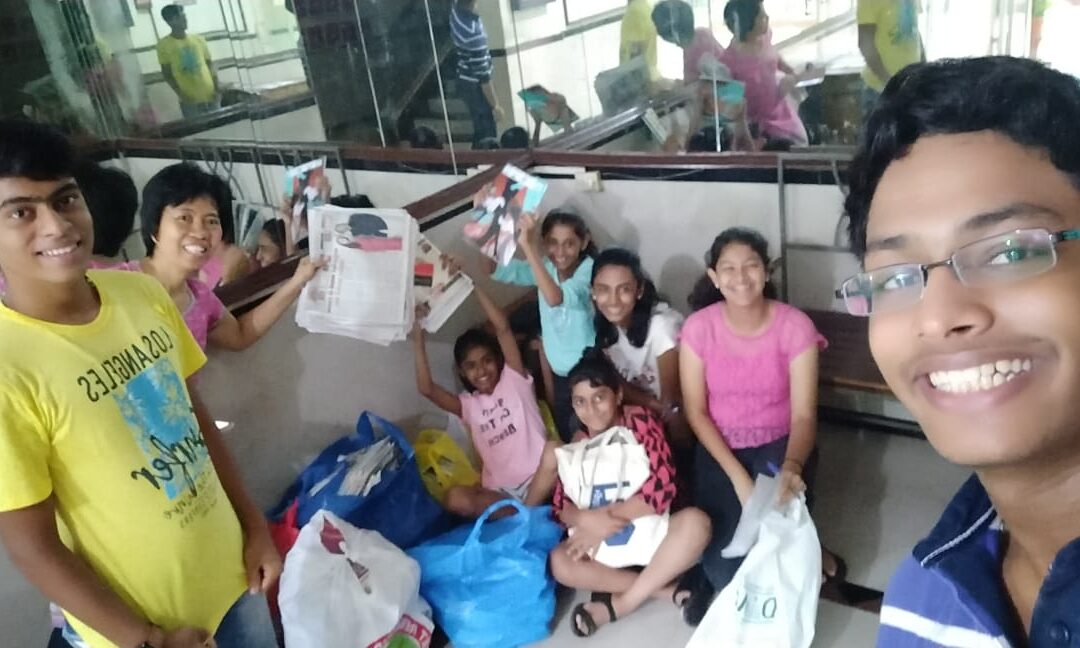
Oct 9, 2018 | Focolare Worldwide
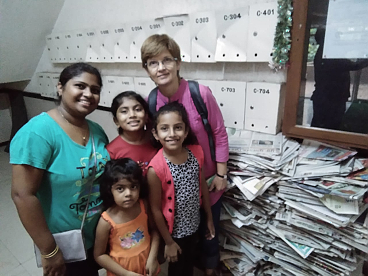 Last September, Mayur and his friends visited the slums in Bhandup and a school in Kanjur (Mumbai). They met with around 110 children. With his group, the Mayur’s Dance Academy, Mayur organised dance workshops for children at a town school in the Bhandup school district. At the conclusion, there was the long awaited distribution of nutritious food like milk, fruit, etc. to the joy of all! Despite the strong rains over the last months, we, Young Ones for Unity of Andheri (Mumbai), went door to door to ask for old newspapers to sell as paper to over 50 families in our neighbourhood. We also handed out letters addressing all the residents of the neighbourhood, with the same request. Many gave us their newspapers willingly, others who did not have any wanted to give something just the same, like cereals, and notebooks for school, and lastly, others gave us money to buy school material. Some parents and friends joined us, supporting the initiative also in the more concrete aspects. And so 383 kilos of paper were collected! The man who bought them gave us a good price, and moreover, also gave us some cash “since it was for a good cause,” he said.
Last September, Mayur and his friends visited the slums in Bhandup and a school in Kanjur (Mumbai). They met with around 110 children. With his group, the Mayur’s Dance Academy, Mayur organised dance workshops for children at a town school in the Bhandup school district. At the conclusion, there was the long awaited distribution of nutritious food like milk, fruit, etc. to the joy of all! Despite the strong rains over the last months, we, Young Ones for Unity of Andheri (Mumbai), went door to door to ask for old newspapers to sell as paper to over 50 families in our neighbourhood. We also handed out letters addressing all the residents of the neighbourhood, with the same request. Many gave us their newspapers willingly, others who did not have any wanted to give something just the same, like cereals, and notebooks for school, and lastly, others gave us money to buy school material. Some parents and friends joined us, supporting the initiative also in the more concrete aspects. And so 383 kilos of paper were collected! The man who bought them gave us a good price, and moreover, also gave us some cash “since it was for a good cause,” he said. 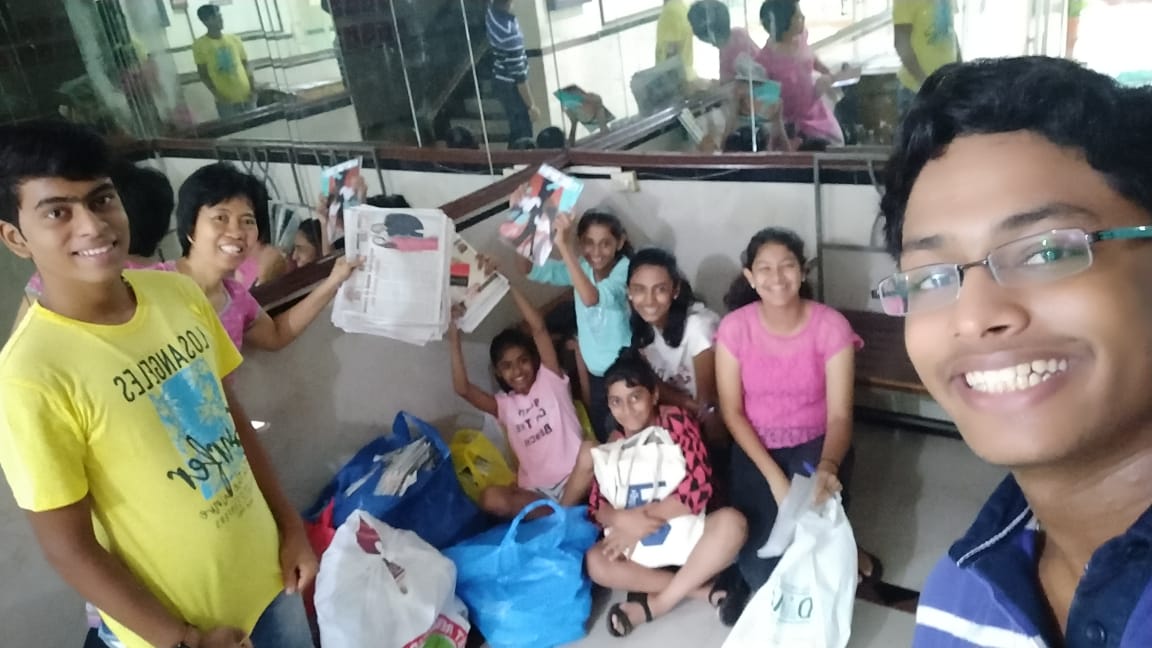 With the sum collected, we bought a lot of cereals which we donated to the Ursuline nuns who take care of children affected by AIDS and their families. Though it was tiring, the happiness for having done something concrete was greater. Our efforts, though modest, were a small step ahead in contributing to the “Zero Hunger Project.” launched by the FAO (Food and Agriculture Organization of the United Nations – http://www.fao.org/home/en/) and to which we, the Young Ones for Unity all over the world, are committed to. We’re so happy that all went well – concluded Anu and Alvin, the Young Ones for Unity of Andheri – but now we want to continue and do something more to build a better world, eliminating hunger, starting from our own neighbourhood.“
With the sum collected, we bought a lot of cereals which we donated to the Ursuline nuns who take care of children affected by AIDS and their families. Though it was tiring, the happiness for having done something concrete was greater. Our efforts, though modest, were a small step ahead in contributing to the “Zero Hunger Project.” launched by the FAO (Food and Agriculture Organization of the United Nations – http://www.fao.org/home/en/) and to which we, the Young Ones for Unity all over the world, are committed to. We’re so happy that all went well – concluded Anu and Alvin, the Young Ones for Unity of Andheri – but now we want to continue and do something more to build a better world, eliminating hunger, starting from our own neighbourhood.“
Watch video of Mayur Jayram Mandavkar https://vimeo.com/275110601
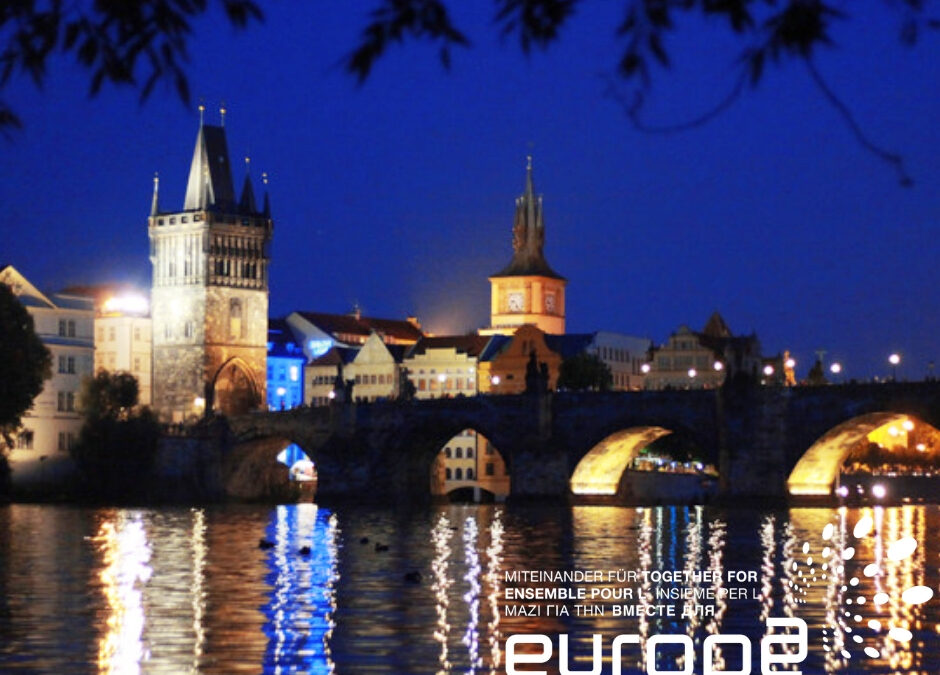
Oct 9, 2018 | Non categorizzato
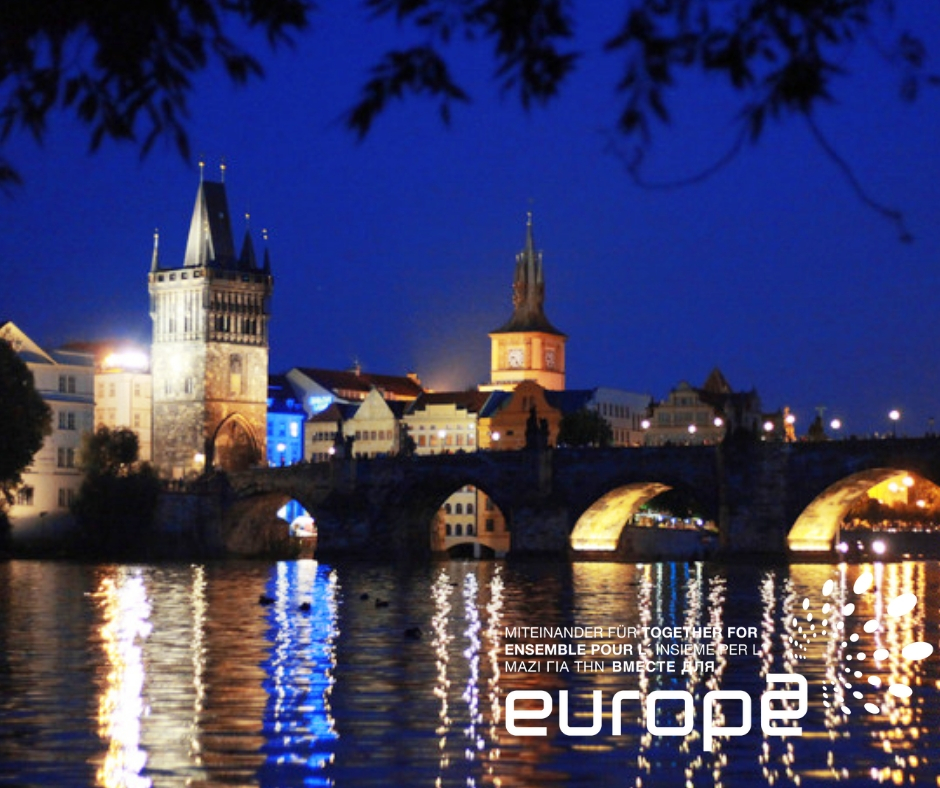 The great history of Central Europe, in particular of the Czech nation will serve as a backdrop for a new stage in the journey of Together for Europe, which promotes dialogue between divergent cultural and political identities. In November 2017 the European meeting of Friends of Together for Europe took place in Vienna, a bridge between Eastern and Western Europe. This year, we will have the opportunity to take another step to the very heart of Central Eastern Europe – Prague, with a singular desire to face challenges, prejudices and fears which weigh on the collective conscience of EU member states and beyond. Through the life of the Gospel, nourished and enlightened by the presence of Christ in the Christian communities, we wish to witness to the fact that the path towards Europe as a House of Nations and a Family of Peoples is not a utopia. The enduring legacy of the “Velvet Revolution” On 17th November, the Czech Republic commemorates the anniversary of the “Velvet Revolution” (so called due to its peaceful nature) which transformed the Czech Republic into a co-protagonist for the ongoing process of European reunification. The presence of the Friends of Together for Europe in Prague on this very day, urges us to renew our shared commitment: to bring to a post-secular culture the spirit of Christian Humanism, and in so doing contribute to building a more united Europe. The renowned Czech Philosopher and Theologian Tomas Halik, friend of the late Vaclav Havel, Jaroslav Sebek of the Historical Czech Academy of Science, and Pavel Fischer an emerging Czech politician, together with leaders and representatives of different Movements, Communities and Associations will be present. Their contributions will reinforce the daring objective of this meeting: to recall a Europe of hope and promise, a Europe which stems from a rich heritage of ethnic, social and cultural diversity and calls out for communion and dialogue. In this way, the Prague event will become a fundamental phase of Together for Europe which continues its commitment for a more united, brotherly and just Europe. It will also be a unique opportunity to prepare together for the upcoming elections for the European Parliament. The meeting will conclude with an open evening, in which Movements and Communities from different churches and which are present in the Czech Republic will be represented. Address: Mariapolis Centre, Mladoboleslavská 667, 190 17 Prague 9 – Vinoř, Czech Republic – Tel. +420 286 007 711; Email: cmpraha@espol.cz; www.centrummariapoli.cz Beatriz Lauenroth
The great history of Central Europe, in particular of the Czech nation will serve as a backdrop for a new stage in the journey of Together for Europe, which promotes dialogue between divergent cultural and political identities. In November 2017 the European meeting of Friends of Together for Europe took place in Vienna, a bridge between Eastern and Western Europe. This year, we will have the opportunity to take another step to the very heart of Central Eastern Europe – Prague, with a singular desire to face challenges, prejudices and fears which weigh on the collective conscience of EU member states and beyond. Through the life of the Gospel, nourished and enlightened by the presence of Christ in the Christian communities, we wish to witness to the fact that the path towards Europe as a House of Nations and a Family of Peoples is not a utopia. The enduring legacy of the “Velvet Revolution” On 17th November, the Czech Republic commemorates the anniversary of the “Velvet Revolution” (so called due to its peaceful nature) which transformed the Czech Republic into a co-protagonist for the ongoing process of European reunification. The presence of the Friends of Together for Europe in Prague on this very day, urges us to renew our shared commitment: to bring to a post-secular culture the spirit of Christian Humanism, and in so doing contribute to building a more united Europe. The renowned Czech Philosopher and Theologian Tomas Halik, friend of the late Vaclav Havel, Jaroslav Sebek of the Historical Czech Academy of Science, and Pavel Fischer an emerging Czech politician, together with leaders and representatives of different Movements, Communities and Associations will be present. Their contributions will reinforce the daring objective of this meeting: to recall a Europe of hope and promise, a Europe which stems from a rich heritage of ethnic, social and cultural diversity and calls out for communion and dialogue. In this way, the Prague event will become a fundamental phase of Together for Europe which continues its commitment for a more united, brotherly and just Europe. It will also be a unique opportunity to prepare together for the upcoming elections for the European Parliament. The meeting will conclude with an open evening, in which Movements and Communities from different churches and which are present in the Czech Republic will be represented. Address: Mariapolis Centre, Mladoboleslavská 667, 190 17 Prague 9 – Vinoř, Czech Republic – Tel. +420 286 007 711; Email: cmpraha@espol.cz; www.centrummariapoli.cz Beatriz Lauenroth
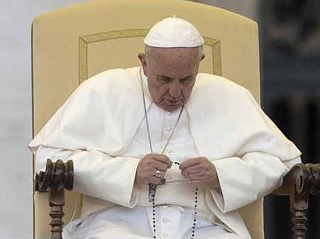
Oct 9, 2018 | Non categorizzato
 In the month of October, Pope Francis explicitly invites all the members of the Catholic Church worldwide to pray and fast in penance, together as the people of God, to ask the Holy Mother of God and St. Michael Archangel to protect the Church from the devil, the main architect of division among men and with God, and make it also more conscious of the faults, errors and abuse committed in the past and present. He invited all to conclude the recital of the Rosary with the ancient invocation “Sub Tuum Praesidium” – which says: “We fly to thy protection O holy Mother of God. Do not despise our petitions in our necessities but deliver us always from all dangers O Glorious and Blessed Virgin” – and with the prayer to St. Michael Archangel, composed by Pope Leo XIII, which says: “St. Michael Archangel, defend us in battle, be our protection against the wickedness and snares of the devil.”
In the month of October, Pope Francis explicitly invites all the members of the Catholic Church worldwide to pray and fast in penance, together as the people of God, to ask the Holy Mother of God and St. Michael Archangel to protect the Church from the devil, the main architect of division among men and with God, and make it also more conscious of the faults, errors and abuse committed in the past and present. He invited all to conclude the recital of the Rosary with the ancient invocation “Sub Tuum Praesidium” – which says: “We fly to thy protection O holy Mother of God. Do not despise our petitions in our necessities but deliver us always from all dangers O Glorious and Blessed Virgin” – and with the prayer to St. Michael Archangel, composed by Pope Leo XIII, which says: “St. Michael Archangel, defend us in battle, be our protection against the wickedness and snares of the devil.”
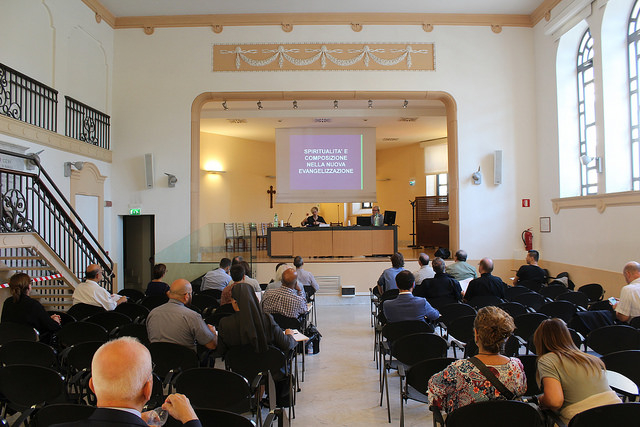
Oct 8, 2018 | Focolare Worldwide
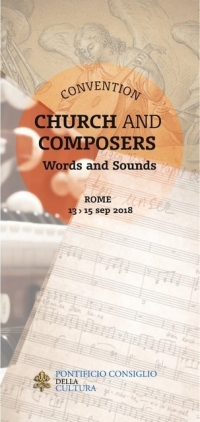 “We strongly feel the urgency of evangelization, and we realize that music can have a great impact in this regard,” says singer and songwriter, Nancy Uelmen from the Gen Verde International Performing Arts Group. She was one of the participants at the convention from the Focolare Movement. The convention lasted three days and was promoted by the Pontifical Council of Culture under the guidance of Cardinal Gianfranco Ravasi. The convention was named “Church and Composers: Word and Sounds.” Besides the speakers, there were also 110 representatives from different Bishops Conferences and academic institutions from many countries, including several composers. The reflection began with “Music and Word”, which focused on memory, intelligibility and meaning. Then came “Music and Gospel”, which allowed for a presentation of several personal and communitarian experiences of life and the impact of different musical and compositional styles. Finally, “Music and Instruments” was more technical and focused on diverse sounds that culminate in the human voice. “We also discussed the great need of evangelizing with music, beyond the context of liturgy,” Uelmen recalls. “It’s the time for courageous expressiveness,” commented Msgr Marco Frisina, composer and director of the Diocesan Choir of Rome, Italy.
“We strongly feel the urgency of evangelization, and we realize that music can have a great impact in this regard,” says singer and songwriter, Nancy Uelmen from the Gen Verde International Performing Arts Group. She was one of the participants at the convention from the Focolare Movement. The convention lasted three days and was promoted by the Pontifical Council of Culture under the guidance of Cardinal Gianfranco Ravasi. The convention was named “Church and Composers: Word and Sounds.” Besides the speakers, there were also 110 representatives from different Bishops Conferences and academic institutions from many countries, including several composers. The reflection began with “Music and Word”, which focused on memory, intelligibility and meaning. Then came “Music and Gospel”, which allowed for a presentation of several personal and communitarian experiences of life and the impact of different musical and compositional styles. Finally, “Music and Instruments” was more technical and focused on diverse sounds that culminate in the human voice. “We also discussed the great need of evangelizing with music, beyond the context of liturgy,” Uelmen recalls. “It’s the time for courageous expressiveness,” commented Msgr Marco Frisina, composer and director of the Diocesan Choir of Rome, Italy.
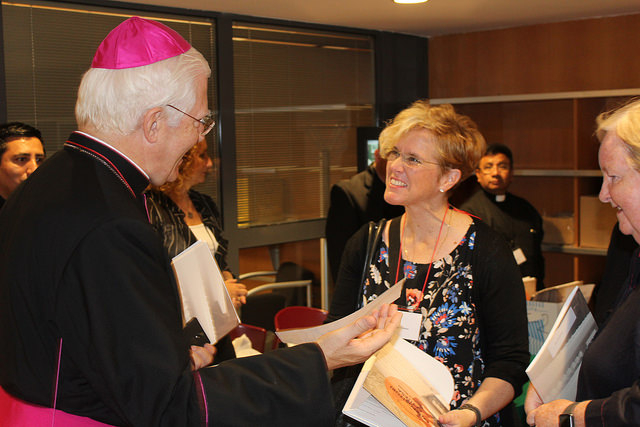
Photo credit: Pontifical Council for Culture

Photo credit: Pontifical Council for Culture





 It was a lake so clear you could see the bottom and drink the water with your cupped hands from the canoe. It seemed the perfect world. Yet here and there a plastic bottle was stuck in the bank, held down by low roots. In that extraordinarily beautiful landscape, it was a punch in the eye. Alek’s story is rich with images such as this. He was among the four people who were part of a temporary Focolare at Whati, in
It was a lake so clear you could see the bottom and drink the water with your cupped hands from the canoe. It seemed the perfect world. Yet here and there a plastic bottle was stuck in the bank, held down by low roots. In that extraordinarily beautiful landscape, it was a punch in the eye. Alek’s story is rich with images such as this. He was among the four people who were part of a temporary Focolare at Whati, in  With the youth group, Alek and Fr. Alain organized the cleanup of a stretch of shoreline. “It was just a gesture,” he says, “yet afterwards we heard that one of the residents there brought this to the chief’s attention, and the cleanup has now become a regular activity throughout the year.” This too was a result of the temporary Focolare at Whati. Besides Alek (an Italian who lives in Birmingham, Alabama) and Fr. Alain (a priest from Montreal), the group was made up of Lioba from the Focolare of Vancouver and Ljubica from that of Toronto. The reason for their journey was a request from the bishop of Yellowknife, the capital of the Northwest Territories, to have a few people from the Focolare community come to the area (covering the costs) to give the residents, at least for one month of the year, the chance to come together spiritually and receive some training on Gospel living. At the same time, another group was having a similar experience at the village of Fort Resolution.
With the youth group, Alek and Fr. Alain organized the cleanup of a stretch of shoreline. “It was just a gesture,” he says, “yet afterwards we heard that one of the residents there brought this to the chief’s attention, and the cleanup has now become a regular activity throughout the year.” This too was a result of the temporary Focolare at Whati. Besides Alek (an Italian who lives in Birmingham, Alabama) and Fr. Alain (a priest from Montreal), the group was made up of Lioba from the Focolare of Vancouver and Ljubica from that of Toronto. The reason for their journey was a request from the bishop of Yellowknife, the capital of the Northwest Territories, to have a few people from the Focolare community come to the area (covering the costs) to give the residents, at least for one month of the year, the chance to come together spiritually and receive some training on Gospel living. At the same time, another group was having a similar experience at the village of Fort Resolution. 
 The people of that place are suffering from a difficult transition from tradition to modernity. “In the space of one generation,” Alek explains, “they found themselves entirely deprived of the roots that had been their deepest identity, perhaps for thousands of years. Those of my generation were born and lived in teepees, and speak Tlicho. Their grandchildren no longer speak the traditional language, use smartphones and are taken by consumerism and all its consequences, including alcohol and drugs. “Yet, the community is still driven by a simple, deep faith that is based on reading the Bible and the natural spirituality of its people, who are still sensitive to spiritual things. “For my part, it was a chance to meet face to face with some of these stories. With them I felt at home, perhaps as never before. I was also a way for them to be touched by God.”
The people of that place are suffering from a difficult transition from tradition to modernity. “In the space of one generation,” Alek explains, “they found themselves entirely deprived of the roots that had been their deepest identity, perhaps for thousands of years. Those of my generation were born and lived in teepees, and speak Tlicho. Their grandchildren no longer speak the traditional language, use smartphones and are taken by consumerism and all its consequences, including alcohol and drugs. “Yet, the community is still driven by a simple, deep faith that is based on reading the Bible and the natural spirituality of its people, who are still sensitive to spiritual things. “For my part, it was a chance to meet face to face with some of these stories. With them I felt at home, perhaps as never before. I was also a way for them to be touched by God.”
 Indifference and mistrust are often born from fear and from a lack of knowledge about one another. In order to face the growing tensions of identity that undermine society, there are many very fruitful opportunities for dialogue and spiritual sharing created by religious institutions and associations. This is the case of
Indifference and mistrust are often born from fear and from a lack of knowledge about one another. In order to face the growing tensions of identity that undermine society, there are many very fruitful opportunities for dialogue and spiritual sharing created by religious institutions and associations. This is the case of 
 «Universal brotherhood was also the project of people who were not motivated by religious motives, but simply by the desire to benefit humanity. The French Revolution’s motto: “liberty, equality, fraternity”, summarizes the great political project of modernity, a project which, in part, has been disregarded. While numerous countries have built democratic systems of government and have succeeded in achieving some degree of liberty and equality, the same cannot be said of fraternity which has been proclaimed more than it has been lived. But the one who brought fraternity as the essential gift to humanity was above all Jesus. In revealing the fatherhood of God, He broke down the walls which separate those who are “the same” from those who are “different”, friends from enemies. He loosened all people from the bonds that imprison them, from all forms of slavery and subordination, from every unjust relationship, thus carrying out an authentic existential, cultural and political revolution. (…) The instrument that Jesus offered to us in order to accomplish this universal fraternity was love, a great love, a new love, different from the one we usually know. In fact, He transplanted the way of loving of heaven here on earth. This love requires first of all that we love everyone, therefore, not only relatives and friends. It asks that we love the pleasant and the unpleasant, our fellow-countryman and the stranger, the European and the immigrant, those of our Church and of another, of our religion and of another. Today it asks the countries of Western Europe to love those of Central and Eastern Europe – and vice versa – and it asks everyone to be open to those of other continents. In the vision of its founders, in fact, Europe is a family of sister nations, not closed in itself, but open to a universal mission: Europe wants its unity to contribute, then, to the unity of the human family. This love asks that we love our enemies as well and that we forgive them if they have offended us. After the wars which stained our continent with blood, many Europeans were exemplary in loving their enemies and promoting reconciliation.
«Universal brotherhood was also the project of people who were not motivated by religious motives, but simply by the desire to benefit humanity. The French Revolution’s motto: “liberty, equality, fraternity”, summarizes the great political project of modernity, a project which, in part, has been disregarded. While numerous countries have built democratic systems of government and have succeeded in achieving some degree of liberty and equality, the same cannot be said of fraternity which has been proclaimed more than it has been lived. But the one who brought fraternity as the essential gift to humanity was above all Jesus. In revealing the fatherhood of God, He broke down the walls which separate those who are “the same” from those who are “different”, friends from enemies. He loosened all people from the bonds that imprison them, from all forms of slavery and subordination, from every unjust relationship, thus carrying out an authentic existential, cultural and political revolution. (…) The instrument that Jesus offered to us in order to accomplish this universal fraternity was love, a great love, a new love, different from the one we usually know. In fact, He transplanted the way of loving of heaven here on earth. This love requires first of all that we love everyone, therefore, not only relatives and friends. It asks that we love the pleasant and the unpleasant, our fellow-countryman and the stranger, the European and the immigrant, those of our Church and of another, of our religion and of another. Today it asks the countries of Western Europe to love those of Central and Eastern Europe – and vice versa – and it asks everyone to be open to those of other continents. In the vision of its founders, in fact, Europe is a family of sister nations, not closed in itself, but open to a universal mission: Europe wants its unity to contribute, then, to the unity of the human family. This love asks that we love our enemies as well and that we forgive them if they have offended us. After the wars which stained our continent with blood, many Europeans were exemplary in loving their enemies and promoting reconciliation.  Therefore, the love I am speaking of makes no distinctions and takes into consideration all those we meet in any moment, directly or indirectly: those who are next to us physically, but also those about whom we or others are speaking; those who will receive the work we do day by day, those we come to know about through the newspapers or television…. Because this is the way God our Father loves, making the sun rise on the bad and the good, and causing the rain to fall on the just and the unjust alike (cf Mt 5:45). (…) Furthermore, the love that Jesus brought is not an idealistic, sentimental love, made up of words. It is a concrete love. It needs to be expressed with deeds. And this is possible if we make ourselves all things to all people: sick with those who are sick; joyful with those who are joyful; worried, insecure, hungry, poor with others, feeling in ourselves what they feel and acting accordingly».
Therefore, the love I am speaking of makes no distinctions and takes into consideration all those we meet in any moment, directly or indirectly: those who are next to us physically, but also those about whom we or others are speaking; those who will receive the work we do day by day, those we come to know about through the newspapers or television…. Because this is the way God our Father loves, making the sun rise on the bad and the good, and causing the rain to fall on the just and the unjust alike (cf Mt 5:45). (…) Furthermore, the love that Jesus brought is not an idealistic, sentimental love, made up of words. It is a concrete love. It needs to be expressed with deeds. And this is possible if we make ourselves all things to all people: sick with those who are sick; joyful with those who are joyful; worried, insecure, hungry, poor with others, feeling in ourselves what they feel and acting accordingly». 







 With one of the fastest growing economies, India is a country which is racing toward constant improvement in life expectancy, literacy rates and health conditions. However, of the 1.2 billion inhabitants of the country, the conditions of those living in the poorest regions are still difficult. Despite its status as an economic power, mortal malnutrition persists. Every evening in India, 200 million people try to fall asleep despite the gnawing hunger. And every day, 3,000 children die of hunger. In Mumbai, where thousands of people go for cancer treatments, Sunny of the Focolare community, wrote: “During the treatments, the families sleep on the road or around the hospital, in the lack of all necessities.” This is an alarming situation of poverty, especially if compared with the data related to the growing waste of perfectly whole foodstuffs, thrown away at the end of wedding banquets, rites, and family parties. The country is one of the world’s main producers of foodstuff, but is likewise one in which a good part of these goods are wasted. Among the causes are also the shortage of transport and warehousing systems especially the “cold chain” system: according to estimates in 2017 of the Indian Ministry of Agriculture, the value of the losses connected to foodstuff wastes (not only in terms of farming goods and foodstuffs, but also in the use of water and energy) could range between 8 and 15 billion dollars yearly.
With one of the fastest growing economies, India is a country which is racing toward constant improvement in life expectancy, literacy rates and health conditions. However, of the 1.2 billion inhabitants of the country, the conditions of those living in the poorest regions are still difficult. Despite its status as an economic power, mortal malnutrition persists. Every evening in India, 200 million people try to fall asleep despite the gnawing hunger. And every day, 3,000 children die of hunger. In Mumbai, where thousands of people go for cancer treatments, Sunny of the Focolare community, wrote: “During the treatments, the families sleep on the road or around the hospital, in the lack of all necessities.” This is an alarming situation of poverty, especially if compared with the data related to the growing waste of perfectly whole foodstuffs, thrown away at the end of wedding banquets, rites, and family parties. The country is one of the world’s main producers of foodstuff, but is likewise one in which a good part of these goods are wasted. Among the causes are also the shortage of transport and warehousing systems especially the “cold chain” system: according to estimates in 2017 of the Indian Ministry of Agriculture, the value of the losses connected to foodstuff wastes (not only in terms of farming goods and foodstuffs, but also in the use of water and energy) could range between 8 and 15 billion dollars yearly. 


 The 40 bishops, who are friends of the Focolari and come
The 40 bishops, who are friends of the Focolari and come 

 It’s called “TST” (tempi senza tensioni, “Time Without Tensions”), a program aimed at balancing work and family life. It was produced by the Il Sentiero di Arianna social cooperative (“Arianna’s way”), which is part of the Economy of Communion, and received first prize in the fourth edition of Family Friendly Businesses that is put on by a forum of family associations in Lazio, Italy. The cooperative, which is part of the Consorzio Tassano Servizi Territoriali network, primarily works in the field of home assistance, education, school services and career support. The TST program produces a series of specific services for employees (dispute resolution, family help, counseling services, working remotely, telecommuting, flexible banking hours, informative actions for management, being a Jack of all trades, and pathways that help employees returning to work after a period of reconciliation). These have shown themselves to be highly effective in creating a positive workplace culture that is based on authentic relationships of collaboration and cooperation. Started in 1996 by nine young women, who for a year pooled the resources that they had earned and reinvested them in training and development, today Il Sentiero di Arianna counts more than 130 members, 85% of whom are women. The tightly knit initial group and the pioneers of the local coop, inspired by the values of the Economy of Communion project that
It’s called “TST” (tempi senza tensioni, “Time Without Tensions”), a program aimed at balancing work and family life. It was produced by the Il Sentiero di Arianna social cooperative (“Arianna’s way”), which is part of the Economy of Communion, and received first prize in the fourth edition of Family Friendly Businesses that is put on by a forum of family associations in Lazio, Italy. The cooperative, which is part of the Consorzio Tassano Servizi Territoriali network, primarily works in the field of home assistance, education, school services and career support. The TST program produces a series of specific services for employees (dispute resolution, family help, counseling services, working remotely, telecommuting, flexible banking hours, informative actions for management, being a Jack of all trades, and pathways that help employees returning to work after a period of reconciliation). These have shown themselves to be highly effective in creating a positive workplace culture that is based on authentic relationships of collaboration and cooperation. Started in 1996 by nine young women, who for a year pooled the resources that they had earned and reinvested them in training and development, today Il Sentiero di Arianna counts more than 130 members, 85% of whom are women. The tightly knit initial group and the pioneers of the local coop, inspired by the values of the Economy of Communion project that 
 “It is often to the youngest that the Lord reveals better solutions.” These are words from Saint Benedict in his “Rule.” These were also the words chosen by Pope Francis when he announced the
“It is often to the youngest that the Lord reveals better solutions.” These are words from Saint Benedict in his “Rule.” These were also the words chosen by Pope Francis when he announced the 

 53 years have passed since, Pope Paul VI, 28 October 1965, signed the first historical “Declaration on the Relation of the Church to non-Christian religions,” known as Nostra Aetate (in our time). The Declaration affirms that “The Catholic Church rejects nothing of what is true and holy in these religions. She has a high regard for the manner of life and conduct, the precepts and doctrines, which, although differing in many ways from her own teaching, nevertheless often reflect a ray of that truth which enlightens all men.” But it also underlines that the Church “is duty bound to announce without fail that Christ is the “way, the truth and the life” (Jn 14,6), in him whom God reconciled all things to himself, men find the fullness of their religious life.” The Declaration urges all Christians “to enter with prudence and charity into discussion and collaboration with the members of other religions, while witnessing to their own faith and way of life, and acknowledge, preserve and encourage the spiritual and moral truths found among non-Christians and also their social life and culture.”
53 years have passed since, Pope Paul VI, 28 October 1965, signed the first historical “Declaration on the Relation of the Church to non-Christian religions,” known as Nostra Aetate (in our time). The Declaration affirms that “The Catholic Church rejects nothing of what is true and holy in these religions. She has a high regard for the manner of life and conduct, the precepts and doctrines, which, although differing in many ways from her own teaching, nevertheless often reflect a ray of that truth which enlightens all men.” But it also underlines that the Church “is duty bound to announce without fail that Christ is the “way, the truth and the life” (Jn 14,6), in him whom God reconciled all things to himself, men find the fullness of their religious life.” The Declaration urges all Christians “to enter with prudence and charity into discussion and collaboration with the members of other religions, while witnessing to their own faith and way of life, and acknowledge, preserve and encourage the spiritual and moral truths found among non-Christians and also their social life and culture.” 


 I’d like to share a couple of thoughts. First of all, I think that one of the most important things about studying, observing, practicing and promoting the EoC is the will to collaborate. In order to enter into the relational dynamic of this proposal, it is necessary to open one’s heart, mind and eyes to those small details that make each day something extraordinary: mutual encouragement and a welcoming smile, recognizing the value and the humanity of the other person, the personal encounter with people you never knew before, the ability to wonder, striving for a balance among the different aspects of life, the decision to appreciate every learning opportunity, to assimilate new information, to recognize and support the change that is taking place, to take part in the transformation of obsolete concepts. EoC is an economic proposal that is different from the others, because it is managed by a diverse group of people. It’s not the model in itself, but the people that constitute the center of all the action.
I’d like to share a couple of thoughts. First of all, I think that one of the most important things about studying, observing, practicing and promoting the EoC is the will to collaborate. In order to enter into the relational dynamic of this proposal, it is necessary to open one’s heart, mind and eyes to those small details that make each day something extraordinary: mutual encouragement and a welcoming smile, recognizing the value and the humanity of the other person, the personal encounter with people you never knew before, the ability to wonder, striving for a balance among the different aspects of life, the decision to appreciate every learning opportunity, to assimilate new information, to recognize and support the change that is taking place, to take part in the transformation of obsolete concepts. EoC is an economic proposal that is different from the others, because it is managed by a diverse group of people. It’s not the model in itself, but the people that constitute the center of all the action. 

 In the heart of Europe with its 7.8 million inhabitants within a territory of 41 thousand km,
In the heart of Europe with its 7.8 million inhabitants within a territory of 41 thousand km,  At the end of September a meeting was held for around 400 men and women Religious, first at City Hall which is not far from the Centre. The group was restricted to superiors and persons in positions of responsibility, with the behind the scenes assistance of Focolare members. The participants were members of eighty communities, including a dozen from the Reformed Church and an Orthodox community, as well as members of Secular Institutes, Movements and Ecclesial Families.
At the end of September a meeting was held for around 400 men and women Religious, first at City Hall which is not far from the Centre. The group was restricted to superiors and persons in positions of responsibility, with the behind the scenes assistance of Focolare members. The participants were members of eighty communities, including a dozen from the Reformed Church and an Orthodox community, as well as members of Secular Institutes, Movements and Ecclesial Families. 




 Cherylanne (Doni) Menezes is from Mumbai. She is part of the delegation of 11 members representing India at the Synod on Youth, underway in Rome up to 28 October. Raised in a family that is very active in the district parish, and within the context of a multi-religious community, after her studies in economy and business Cherylanne started to work in the field of management. But her broad range of interests led her to acquire a Master’s at the
Cherylanne (Doni) Menezes is from Mumbai. She is part of the delegation of 11 members representing India at the Synod on Youth, underway in Rome up to 28 October. Raised in a family that is very active in the district parish, and within the context of a multi-religious community, after her studies in economy and business Cherylanne started to work in the field of management. But her broad range of interests led her to acquire a Master’s at the  The new appointment was for 17 October. The delegation arrived on time, at the entrance of Aula Nervi, at 4 p.m., together with that of South America. The afternoon session started at 4.30, and half an hour earlier Pope Francis met the single groups, in a joyful and informal personal encounter that was an integral part of the Synodal spirit. Percival gave the Pope a sandalwood cross bearing the image of the Good Shepherd, work of a Hindu artist. “I have also letters for you, Holy Father” Cherylanne added. The letters are wonderful, full of affection of the youth and families of
The new appointment was for 17 October. The delegation arrived on time, at the entrance of Aula Nervi, at 4 p.m., together with that of South America. The afternoon session started at 4.30, and half an hour earlier Pope Francis met the single groups, in a joyful and informal personal encounter that was an integral part of the Synodal spirit. Percival gave the Pope a sandalwood cross bearing the image of the Good Shepherd, work of a Hindu artist. “I have also letters for you, Holy Father” Cherylanne added. The letters are wonderful, full of affection of the youth and families of 




 Many of our readers are familiar with the story of Margarita Ramirez De Moreno who comes from Santa Maria di Catamarca in the north east of Argentina. She is a descendent of Calchaquies Aborigines whose leader was Juan Calchaqui. These people were well known for their abilities in many forms of traditional crafts. Margarita certainly inherited an enterprising spirit and great talent in weaving from her ancestors. When she was young, she studied for a diploma at the “Aurora School” in her town: this institute is recognised by the Argentinian government for the outstanding contribution it makes to teaching about designs and traditional skills deriving from the “quechuan” culture. Later on in life, Margarita was unemployed but she did not give in to the personal challenges that she and many women like her faced but decided to open a spinning mill to provide thread for the looms in the school workshop. This enabled her to overcome discrimination and reclaim her cultural identity. On October 1st in Tucuman, Margarita received an award during the first international meeting of “Women for Peace” organised by the “World Federation of Grand Master Ladies”. This is an international association, found in many parts of the world that works with individuals, groups and foundations: its spirit facilitates women in establishing links of friendship, fraternity and support and enables them engage politically in initiatives promoting peace, security and protection.
Many of our readers are familiar with the story of Margarita Ramirez De Moreno who comes from Santa Maria di Catamarca in the north east of Argentina. She is a descendent of Calchaquies Aborigines whose leader was Juan Calchaqui. These people were well known for their abilities in many forms of traditional crafts. Margarita certainly inherited an enterprising spirit and great talent in weaving from her ancestors. When she was young, she studied for a diploma at the “Aurora School” in her town: this institute is recognised by the Argentinian government for the outstanding contribution it makes to teaching about designs and traditional skills deriving from the “quechuan” culture. Later on in life, Margarita was unemployed but she did not give in to the personal challenges that she and many women like her faced but decided to open a spinning mill to provide thread for the looms in the school workshop. This enabled her to overcome discrimination and reclaim her cultural identity. On October 1st in Tucuman, Margarita received an award during the first international meeting of “Women for Peace” organised by the “World Federation of Grand Master Ladies”. This is an international association, found in many parts of the world that works with individuals, groups and foundations: its spirit facilitates women in establishing links of friendship, fraternity and support and enables them engage politically in initiatives promoting peace, security and protection.  “There is no peace without justice and there is no justice without peace,” affirmed Mariela Martin Domenichelli, the co ordinator of the Latin American branch of the federation. “It’s important to listen to the women describing the situations in which they live so they can transform their ideas into political action that benefits the entire community.” The meeting wanted to showcase the positive contribution made by women in various fields of action. After the federation visited her area, Margarita was chosen as the person who symbolises the complete integration of women and the entire Aboriginal community to which they belong. Margarita – who now has seven children – said that it had not been easy to convince women in her area to work in spinning mills once again because they had suffered discrimination for so long. In addition, they had to walk long distances, crossing rivers to reach the mill because there was no transport. However, they gradually began to share the little they had: a bobbin, some wool or their skills in traditional crafts.
“There is no peace without justice and there is no justice without peace,” affirmed Mariela Martin Domenichelli, the co ordinator of the Latin American branch of the federation. “It’s important to listen to the women describing the situations in which they live so they can transform their ideas into political action that benefits the entire community.” The meeting wanted to showcase the positive contribution made by women in various fields of action. After the federation visited her area, Margarita was chosen as the person who symbolises the complete integration of women and the entire Aboriginal community to which they belong. Margarita – who now has seven children – said that it had not been easy to convince women in her area to work in spinning mills once again because they had suffered discrimination for so long. In addition, they had to walk long distances, crossing rivers to reach the mill because there was no transport. However, they gradually began to share the little they had: a bobbin, some wool or their skills in traditional crafts. 








 Put the heads of a group of teenagers together having taken part in the recent annual workshop in Loppiano, and one keyword emerges: “participation.” In view of this, the Youth Section of the Economy of Communion (EoC) launched on the social network and among their friends a workshop called “Inside the LABel.” At the conclusion of the day which the Bonfanti Industrial Park had dedicated to the topics of economy and work, the participants left the meeting hall and the filled cars that were waiting to take them to the nearby Coop Supermarket in the town of Figline. A table was set up at the entrance of the superstore along with ballot boxes. Then, an innovative experiment began that lasted for two hours, a genuine voting campaign. The five candidates were: pasta, coffee, chocolate, canned tuna and oranges. “But what does democracy have to do with a supermarket?” someone asked. “It does, it has a lot to do…” said one of the organizers named Chiara. “Using our wallets, we exert our “buying power.” The “vote with our wallet” is just one example of civil responsibility. Whenever we buy a product we express a preference, we support the work of a business that produces the product, a particular business model, a mission, a series of internal processes, a certain type of managing of relationships with employees and providers, a certain type of impact on the environment.” “After a meeting with Luigino Buni on the relationship between democracy and market,” says Stefania, “we worked for nearly three months examining the ‘vision’ and ‘mission’ of small and large brands at around 20 businesses. Following indicators such as transparency, production chain, respect for the environment, social responsibility, corporate form and legal record, we gathered data and information that were published on the web.”
Put the heads of a group of teenagers together having taken part in the recent annual workshop in Loppiano, and one keyword emerges: “participation.” In view of this, the Youth Section of the Economy of Communion (EoC) launched on the social network and among their friends a workshop called “Inside the LABel.” At the conclusion of the day which the Bonfanti Industrial Park had dedicated to the topics of economy and work, the participants left the meeting hall and the filled cars that were waiting to take them to the nearby Coop Supermarket in the town of Figline. A table was set up at the entrance of the superstore along with ballot boxes. Then, an innovative experiment began that lasted for two hours, a genuine voting campaign. The five candidates were: pasta, coffee, chocolate, canned tuna and oranges. “But what does democracy have to do with a supermarket?” someone asked. “It does, it has a lot to do…” said one of the organizers named Chiara. “Using our wallets, we exert our “buying power.” The “vote with our wallet” is just one example of civil responsibility. Whenever we buy a product we express a preference, we support the work of a business that produces the product, a particular business model, a mission, a series of internal processes, a certain type of managing of relationships with employees and providers, a certain type of impact on the environment.” “After a meeting with Luigino Buni on the relationship between democracy and market,” says Stefania, “we worked for nearly three months examining the ‘vision’ and ‘mission’ of small and large brands at around 20 businesses. Following indicators such as transparency, production chain, respect for the environment, social responsibility, corporate form and legal record, we gathered data and information that were published on the web.”  “It was an interesting and enriching challenge,” continues Francesca, “which revealed a complexity of ethics, values and conventions that influence our daily purchases. As we moved ahead and our awareness increased, we came up with a project that we could share. The role of civil responsibility, being critical consumers and becoming aware that one’s own purchases, can influence the behaviour of large and small businesses. This is why we came up with a project that we call “Inside the Label.” This year’s LoppianoLab seemed like the opportunity to present it.” Andrea interrupts: “Based on the materials that were collected, we chose three products from different brands for each category, trying to highlight the nuances in terms of transparency, pricing, commitment and quality. We left it to the participants to choose the products they would buy, after having shared with them the tools for reading the labels also for “moral calories” and “ethical sugars.” It was a project that took nothing for granted, but stuck to reality.
“It was an interesting and enriching challenge,” continues Francesca, “which revealed a complexity of ethics, values and conventions that influence our daily purchases. As we moved ahead and our awareness increased, we came up with a project that we could share. The role of civil responsibility, being critical consumers and becoming aware that one’s own purchases, can influence the behaviour of large and small businesses. This is why we came up with a project that we call “Inside the Label.” This year’s LoppianoLab seemed like the opportunity to present it.” Andrea interrupts: “Based on the materials that were collected, we chose three products from different brands for each category, trying to highlight the nuances in terms of transparency, pricing, commitment and quality. We left it to the participants to choose the products they would buy, after having shared with them the tools for reading the labels also for “moral calories” and “ethical sugars.” It was a project that took nothing for granted, but stuck to reality. 



 Last September, Mayur and his friends visited the slums in Bhandup and a school in Kanjur (Mumbai). They met with around 110 children. With his group, the Mayur’s Dance Academy, Mayur organised dance workshops for children at a town school in the Bhandup school district. At the conclusion, there was the long awaited distribution of nutritious food like milk, fruit, etc. to the joy of all! Despite the strong rains over the last months, we,
Last September, Mayur and his friends visited the slums in Bhandup and a school in Kanjur (Mumbai). They met with around 110 children. With his group, the Mayur’s Dance Academy, Mayur organised dance workshops for children at a town school in the Bhandup school district. At the conclusion, there was the long awaited distribution of nutritious food like milk, fruit, etc. to the joy of all! Despite the strong rains over the last months, we,  With the sum collected, we bought a lot of cereals which we donated to the Ursuline nuns who take care of children affected by AIDS and their families. Though it was tiring, the happiness for having done something concrete was greater. Our efforts, though modest, were a small step ahead in contributing to the “
With the sum collected, we bought a lot of cereals which we donated to the Ursuline nuns who take care of children affected by AIDS and their families. Though it was tiring, the happiness for having done something concrete was greater. Our efforts, though modest, were a small step ahead in contributing to the “
 The great history of Central Europe, in particular of the Czech nation will serve as a backdrop for a new stage in the journey of
The great history of Central Europe, in particular of the Czech nation will serve as a backdrop for a new stage in the journey of 


